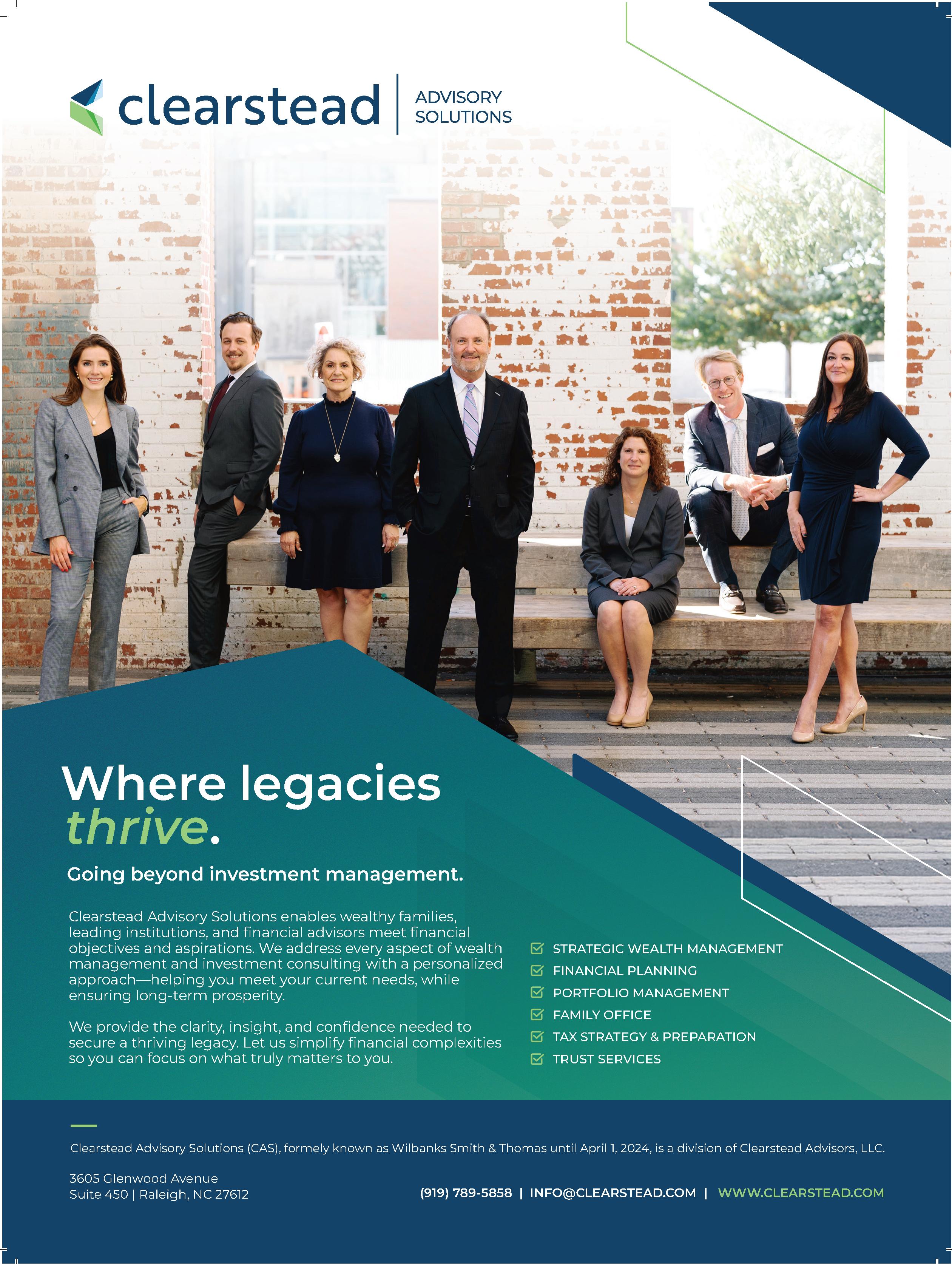


















































































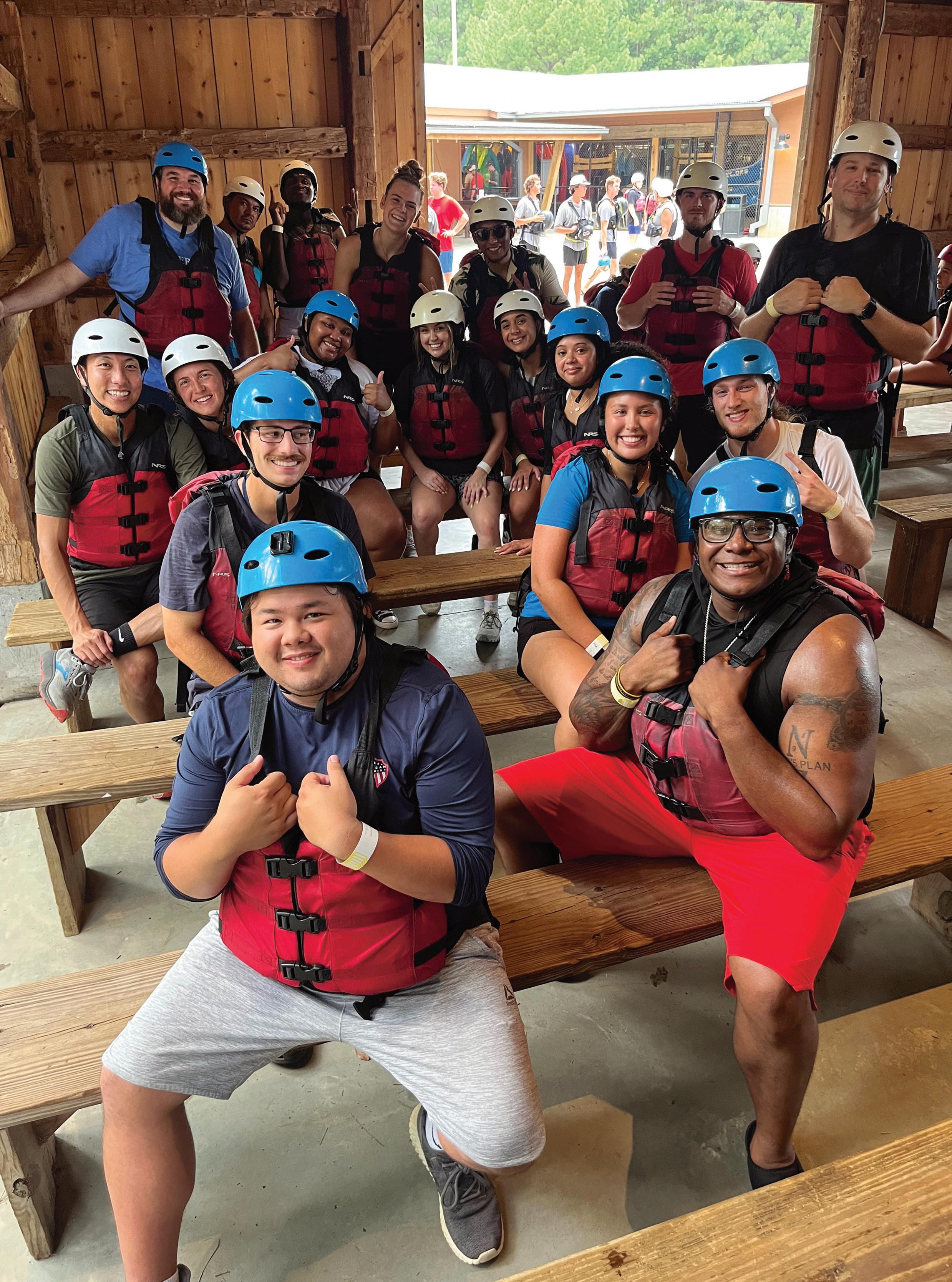






General contractor Swinerton is among the 49 North Carolina companies honored for their inspired workplaces.










4 UP FRONT
6 POWER LIST INTERVIEW
UNC Wilmington Chancellor Aswani Volety discusses his journey from India to leading a growing public university that is focused on its coastal region.
8 POINT TAKEN
Architects from Clark Nexsen’s Raleigh office complete an unusual project at the Air Force Academy in Colorado.
10 NC TREND
Odyssey Logistics opts for a Southern HQ; PSA Airlines moves its base closer to where most of its workers call home; VP Nursing aims to empower healthcare workers.

24 ROUND TABLE: BANKING

Six industry experts discuss North Carolina’s competitive financial services sector and pending economic challenges.
34 MEDICAL: HEART HEALTH
Technological advances are detecting problems sooner and allowing doctors to treat patients less invasively, which is leading to better outcomes.
84 COMMUNITY CLOSE UP:
CORE
Twelve counties, 1.7 million residents and 21 colleges and universities find strength in the diversity of the region’s mix of rural and urban entrepreneurship.


























COVER STORY
















Business North Carolina’s annual look at the businesses taking the extra steps to recruit and retain workers.
BY KEVIN ELLIS














After figuring out a winning strategy in insurance networking, Doug Witcher says God’s plan calls for him to share his wealth widely.
BY TUCKER MITCHELL










Ranking the state’s biggest financial institutions and money management firms.
BY DAVID MILDENBERG AND WIL SPEIR

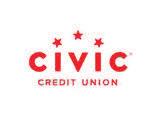





More than 400,000 former Local Government Federal Credit Union members will transition to Civic, cutting historic ties with the state’s dominant credit union.
BY CHRIS BURRITT


Meet the top professionals making a difference at global firms, agencies and small enterprises.
BY KEVIN ELLIS







We’ve been working on some other ways to provide North Carolina’s decision-makers content in a variety of ways. One of these is a new monthly video series we are pretty excited about.
Business North Carolina and Bclip Productions, Inc. are proud to present "On the Ground: The Grit That Drives Carolina Business," a behind-the-scenes video series filmed on location with the entrepreneurs, risk-takers, and innovators shaping North Carolina's economy. Each episode offers an unfiltered look at the bold decisions and daily grit required to build impactful businesses.
Over the past few months, we’ve covered two impressive innovators. Riverbend Malt House is a Buncombe County-based business that has been serving the craft beer industry since 2011. Durham-based custom carwash services group Spiffy has transformed traditional car care in more than 30 cities with a fleet of mobile technicians, backed by custom-built vans and powerful cloud-based technology.
We’ll be uploading a video each month on our YouTube Channel. You can scan the QR code and check out these cool companies, with more to come.

PUBLISHER
Ben Kinney bkinney@businessnc.com
EDITOR
David Mildenberg dmildenberg@businessnc.com
MANAGING EDITOR Kevin Ellis kellis@businessnc.com
ASSOCIATE EDITORS
Ray Gronberg rgronberg@businessnc.com
Cathy Martin cmartin@businessnc.com
EDITORIAL INTERN
Natalie Bradin, Wil Speir
CONTRIBUTING WRITERS
Pete M. Anderson, Dan Barkin, Chris Burritt, Tucker Mitchell
CREATIVE DIRECTOR
Cathy Swaney cswaney@businessnc.com
GRAPHIC DESIGNER
Lauren Ellis
MARKETING COORDINATOR
Jennifer Ware jware@businessnc.com
EVENT DIRECTOR Norwood Teague nteague@businessnc.com
ADVERTISING SALES
ACCOUNT DIRECTOR
Melanie Weaver Lynch, eastern N.C. 919-855-9380 mweaver@businessnc.com
ACCOUNT MANAGER
Anne Brundage, western N.C. abrundage@businessnc.com
CIRCULATION: 818-286-3106
EDITORIAL: 704-523-6987
REPRINTS: circulation@businessnc.com
OWNERS
Jack Andrews, Frank Daniels III, David Woronoff, in memoriam Frank Daniels Jr.


PUBLISHED BY Old North State Magazines LLC
PRESIDENT David Woronoff





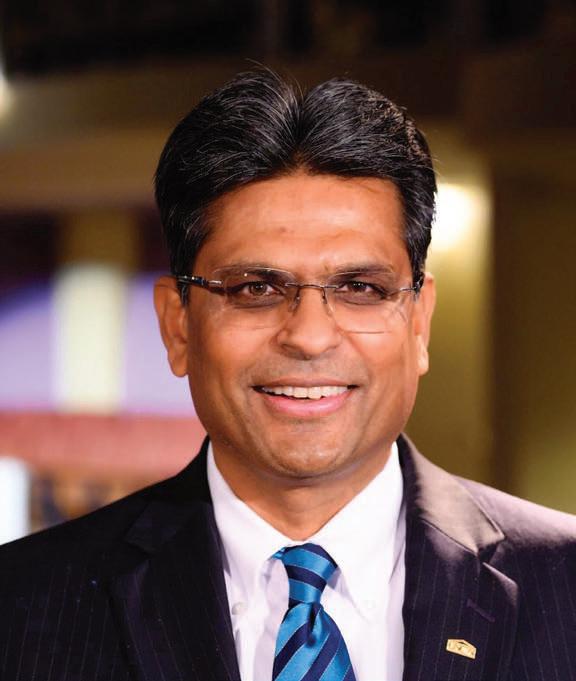





Aswani Volety, chancellor of UNC Wilmington, joined High Point University President Nido Qubein in the Power List interview, a partnership for discussions with influential leaders. The interview was edited for clarity.
Chancellor Volety, your story is amazing. You started school at age 2 and graduated high school at age 15. That makes me feel like a total failure. Tell me, how does someone start school at age 2?
My mom tells me I was getting in trouble with all my cousins. I grew up in a large extended family, I was reading and writing.
Aswani Volety grew up in a one-room home in India and started school before turning 3. He graduated from high school at age 15. He then earned a bachelor’s degree from Andhra University, followed by a master of science in zoology at the same school in 1990. It is a coastal campus, on India’s south coast.
In 1990, he entered a doctoral program at the College of William and Mary in Virginia, where he earned a Ph.D. in marine science in 1995. He later moved to Florida Golf Coast University as a professor and later interim dean for the college of arts and sciences.
He joined UNC Wilmington in 2014 as dean of the College of Arts and Sciences, helping implement new programs and attract a $5 million corporate donation that was a record at the time. In 2019, he moved to Elon University as provost, and vice president of academic affairs.
Three years later, he was selected after a national search to become chancellor of UNC Wilmington. Since July 2022, he has helped the campus expand various academic opportunities and its student support services.
The university completed a $131 million fundraising campaign. It enrolled 18,848 students last fall, about 3,500 more than a decade earlier. They came from about 45 states and 50 nations.
He and his wife, Ai Ning Loh, have two children. Loh is an associate professor of Earth and Ocean Sciences at UNCW.
She said, “You’re better o going to school and learning something than getting in trouble at home.” So she sent me o .
Kidding aside, I had some amazing mentors. I had a very caring family who helped provide some great opportunities. I was the rst in my family to go to college.
And you came to America in 1990 to do your best at William and Mary?
Yes, I did. A er graduation, I worked at William and Mary for a couple of years on a post-doctral fellowship. en I had a National Academy of Sciences fellowship. It was a fairly prestigious fellowship to work in a federal lab.
A er that, I went to Florida Gulf Coast University, which was a brand-new university in the state system of Florida. It was on the coast, enabling the kind of marine work I was doing. at was a great location for me. I worked on projects such as Everglades restoration and Deepwater Horizon oil spill work.
Why did you leave Florida Gulf Coast after 15 years? e Wilmington opportunity was similar, with both programs focused on students. UNCW has a very large marine science program. And that’s what attracted me to Wilmington as the dean of the college of arts and sciences and then as chancellor.
How does an immigrant, who grew up with a lot of adversity, manage to focus so directly, so positively and with such determination?
I want to say it’s because of my hard work, and I’m smart, but that’s not true. ere are a lot of very hard-working, very smart people who are smarter than I am who don’t have the opportunities that I have. I’ve always said the three things that made a di erence in my life are, education, mentors and the opportunities this great country a ords.
Without mentors and the opportunities that this great country a orded me, I wouldn’t be where I am. at’s what I tell myself every day. I want to make sure that every student that comes to UNCW has experiences similar to mine that made a di erence in my life, and I want them to be even more successful than I am.
Why is educational attainment so strong in many Asian nations?
That is true. The family unit is very strong. The focus on education has always been a primary force in Asian cultures. In India, perhaps education has been one way to get ahead economically and financially, and to help your family progress.
There is so much discussion that is not very respectful about higher education. People are talking about the value in going to college, and does it really pay to do that? That must not resonate well with you?
That shouldn’t be a conversation, yet It is. Studies have shown that an individual with a college degree makes over $1 million more than what a high school graduate makes. With the graduate programs, it’s even more when it comes to professional programs.
It’s somewhere in the range of $3 million to $5 million. Yet, somehow, we talk about the false narrative. There are individuals who didn’t have a college degree that are very successful, and individuals who have college degrees who aren’t as successful as measured by economic terms. I think as an industry, higher education hasn’t done a good job of communicating the value of education.
And it is for the long run. As you know, the technologies are evolving. People are living longer. The skill sets that employers are looking for are changing very quickly. Unless you are training students to learn how to learn, adapt and acquire the next set of skills, they probably won’t be employed in the long run.
Especially these days with the advent of artificial intelligence, it is mind blowing how quickly things are changing. You may have a job today as a high school graduate. But the question one should be asking is, are they prepared to adapt and evolve and be in the next job with the right skill sets with a high school degree?
It’s the long run where higher education provides the opportunity for individuals to be successful in what’s coming next.
What doctoral programs does UNCW offer?
We have doctoral programs in marine biology, psychology, nursing practice, education and pharmaceutical chemistry. And our most recent program, a doctorate in applied coastal ocean sciences.
Let’s talk about marine science for a moment. How do you define it?
Marine science is the study of the oceans and how the oceans impact us. It involves biology, physics, geology and chemistry. But more importantly, it also involves modeling and resource economics. What is the value of a certain fishery? What is the value of tourism? What is the value of all the economics of recreational activities? All these things are broadly defined as marine science. It’s a very broad area.
How important is it that UNCW is located next to an ocean?
UNCW is the only UNC System university that is on the coast, and we have a very large marine science program. In all the areas that I talked about, the researchers investigate the deepest parts of the ocean and the organisms that live there, collecting samples from the deepest oceans. They actually send remotely operated vehicles, all the way to the deepest parts.
Tell me what that looks like.
Imagine a robot with propellers and arms that can collect samples. They’re all geo-referenced. In other words, you know exactly the point, relative to Earth, where you picked up the samples, literally sending a machine to the deepest parts of the ocean, and you’re controlling it remotely.
Our sediment samples are first samples or anything else from the deepest oceans that are brought to the surface.
Our researchers are also using nanosatellites. Imagine a satellite that is the size of a loaf of bread when it goes up into space and then opens up. The satellite is taking very high resolution images of the coastal areas from the air. That is used to look at how much food is present in the sea surface or how much sediment is being pushed out into the open ocean or the coastal areas. That impacts how much seagrasses will grow or not.
So UNCW researchers cover anywhere from space all the way to the deepest parts of the ocean and anywhere in between.
More than 70% of the world’s population lives less than 100 miles from the coast. So whether we are relying on the coastal areas and the oceans for food, recreation, pharmaceutical applications, etc., we know that humans have traditionally had a very close relationship with water.
All civilizations revolve around water, including oceans and rivers. There is also fun, transportation and fishing. When you think about oceans, a good amount of seafood for human consumption comes from the ocean. In addition to wild fisheries, you’re also farming the ocean. What is happening in the coastal areas is also a precursor of what is likely to happen to us.
The pollution going into coastal areas, whether it is rivers, estuaries, oceans, if the animals are not doing well and we are closely interacting with that environment or consuming those organisms, sooner or later, it’s also going to impact our health.
So looking at the health of these coastal areas is also a preview of what is likely to come and how it’s going to affect us as humans interact with this environment very closely.
Therefore, every day you’re discovering new species and you’re figuring out, how do these animals live? Under very stressful conditions. No light. Not a lot of food. Very cold temperatures. Very, very high pressure. How are they managing those things? And we are also looking at how they’re adapting and saying, can we use some of those molecular tools to better survive or modify the organisms. Agriculture is a good example of that.
I can remember when I would swim in the ocean with my children with zero worry about dangers like sharks. All of a sudden, we have concerns about that. What happened environmentally to cause that?
I think you’re more aware of those things. When you look at the number of incidents relative to the number of people going to any coastal or any beach, you have a higher likelihood of something happening when you’re driving on the road than something happening in the water, whether it is drowning, whether the shark bites, that is a minuscule percentage. But it attracts news.
If you’re building more bridges and jetties and other structures, they attract other fish. And with more recreational fishing, you’re putting more food in the water. That attracts the sharks. But sharks don’t come to humans, and try to eat them. It’s a case of mistaken identity.
It is our strategic plan or a roadmap for the next 10 years. That is the title of our strategic plan.
It’s not just a tagline, but that is how we think in terms of doing better every day, and making sure our students are soaring higher, accomplishing greater things.
I hope to see through it and do many more, just like my predecessors have done. They’ve left me with an amazing institution, with very strong foundations. Hopefully, sometime in the very far future, when I leave, I hope to leave the institution in a much better place than I found it. ■


Iwrite about the military and some of this involves military construction, or MILCON, as it is called. The military has spent billions of MILCON dollars here, particularly at Camp Lejeune and other eastern North Carolina installations on Marine Corps projects over the past five years. The Navy is building a big C-130 hangar complex in Kinston, at the Global TransPark. The Army is always building at Fort Bragg.
So I write a lot about military construction projects, when contracts are bid and awarded, when ground is broken and ribbons cut.
This is a different tale altogether, about a military construction project that is in Colorado, at the Air Force Academy, in the foothills of the Rocky Mountains. It is notable for us because it has been designed by architects in Raleigh, trained at NC State. They work for Clark Nexsen, an architectural and engineering firm with roots in Virginia and nine offices and 400 employees in the Southeast. And it is also notable because the focus of the building is to train Air Force cyberwarriors and to develop new ways to wage the new kind of cyberwar.
The building is the Madera Cyber Innovation Center, a nearly 50,000-square-foot, $50 million structure.
The firm that is now Clark Nexsen was founded by architect Pendleton Clark, in Lynchburg, Virginia, after his service as a naval officer in World War I. As the firm grew and Clark took on new partners, it specialized in higher education and military buildings, two growth areas. College buildings all over Virginia were designed by the firm, beginning in the 1920s and 1930s. That higher education work is also evident throughout North Carolina, including the engineering building, Fitts-Woolard Hall, on NC State’s Centennial Campus, which opened in 2020.
Over the decades, it has designed hundreds of buildings for
the military, including facilities at Fort Bragg and Marine Corps Base Camp Pendleton in California, as well as hundreds of overseas installations. Since 2008, Clark Nexsen has gotten nearly $270 million in federal work as a prime contractor, mostly for the Department of Defense, according to USASpending.gov.
In May, Clark Nexsen announced it is merging with a larger Maryland firm - Johnson, Mirmiran & Thompson.
The new building, officially opened in April, is really a symbol of changes that have been happening in the military over the past decade to spur innovation. In addition to being an academic building, it is the home of AF CyberWorx. There are many similar innovation hubs around the military. That is why an outfit called NavalX has something called the Eastern North Carolina Tech Bridge next to the airport in New Bern. It was why the Defense Innovation Unit was created, and the Silicon Valley Innovation Program in the Department of Homeland Security. This goes in cycles, incidentally. After Russia launched Sputnik in 1957 the government created DARPA, which gave us the Internet.
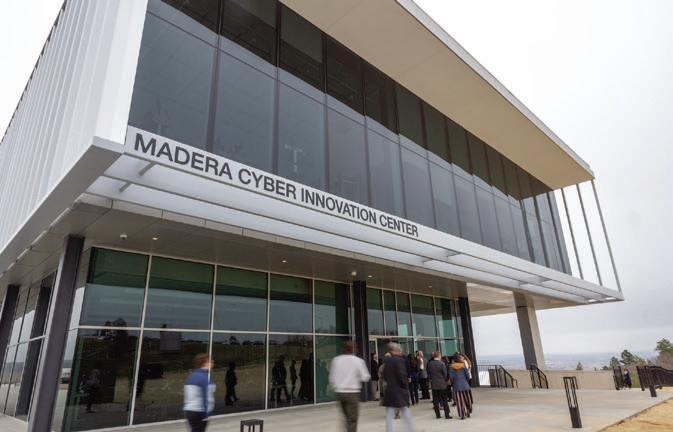
In 2015, the concept of AF CyberWorx was presented to some senior Air Force leaders, with the idea of housing it at the academy. The Air Force Academy committed to temporary space. Congress authorized $30 million for a building in the 2018 National

Defense Authorization Act, and they were in business. The project became bigger than originally scoped because it attracted private donations from academy alumni, like Paul Madera, who graduated in 1978, served as a fighter pilot, and then got a Stanford MBA and became a technology venture capitalist. He was an early investor in Facebook and Salesforce.
The project was put out for bid by Air Force CyberWorx in mid-April 2020, a month after lots of us started working from home. That is why Jennifer Heintz of Clark Nexsen was on calls about the building design at her dining room table. Heintz, a Statesville native and 1998 graduate of NC State’s College of Design, was the senior project architect on the job for Clark Nexsen, which had been hired by Bryan Construction, a Colorado contractor. This was a challenging building to design, with an exterior that was almost all glass and a multi-story spiral-ish staircase. It’s the spiral-ish part of this that makes architecture hard and interesting.
The academy’s McDermott Library has a spiral staircase, and the desire was to put one in the Madera building.
“When we got the project,” says Heintz, “it was an option to do a spiral staircase in the middle of the building. But at the time they accepted that option, we were too far down in the design, and the space allowed for it did not allow for a true spiral. So that’s when we engaged Ryan.”
Ryan Johnson is a computational designer in the Raleigh office.
“A spiral stair is a literal circle. It just wouldn’t fit in the rectangular opening,” says Johnson, a Winston-Salem native who went to App State as an undergraduate before getting his master’s in architecture at NC State. “What I’ve been calling it, it’s like a free-
form spiral stair. So, if you look up it’s kind of crossing over itself. It looks like it’s crossing over itself, moving in and out. As opposed to just a pure geometric circle form.”
Another challenge was designing the glass safety rails up the staircase. “You can bend glass but if you do, there’s lots of rules around bending glass, so that you can actually bend it correctly and not have it break and explode,” says Johnson.
“We came up with an idea that we liked architecturally and visually. And that’s where the computation comes in. We basically write a script that rationalizes that geometry in a way that can be built by the glass.
“And then the script works its way back and does the rest. Validates that it works, and then we can draw the treads and risers and that ultimately works back to the structural concrete. It’s a structural concrete stair. There’s no columns bracing. It only touches the ground at the bottom and then the two landings. Three floors plus a mezzanine.”
What has happened over the past quarter century with architecture is what has happened everywhere, with ever more powerful computers and software. Digital visualization tools like Rhino have gotten more powerful.
“We provided the actual geometry in 3D for the fabricator to make the formwork from, and then they poured all that formwork which was coordinated and designed pretty heavily by the engineers,” says Johnson.
The engineers used laser scanning to check and recheck the stairs during the phases of construction. “It required precision. More than a typical building.”
“Ryan and I, we’ve done extensive work on NC State, Duke, Chapel Hill, Wake Tech, UNC Charlotte,” says Heintz. “This was just a great opportunity for us to really elevate each other within our office, as well as give ourselves new experience. I have been at this for 26 years. I like learning new things and this building, with some of its more innovative ideas, allowed me to do things I have never done.” ■

Veteran journalist Dan Barkin writes the NC Military Report newsletter for Business NC. He can be reached at dbarkin53@gmail.com.






One of Charlotte’s new corporate headquarters companies sees golden opportunities in the logistics sector.
By David Mildenberg



It only took Odyssey Logistics 22 years to realize that Charlotte was the best place for its headquarters.
Now that CEO Hans Stig Moller has put a stake in the Queen City, the diversi ed transportation company is excited about its potential growth.
Odyssey Logistics was formed in 2002 by former Union Carbide executive Bob Shellman a er Dow Chemical acquired the company a year earlier for more than $10 billion. e logistics business stemmed from Union Carbide’s $650 million budget for managing and transporting chemicals and other raw materials and nished goods. Union Carbide was a pioneering chemical company whose products included Energizer batteries, Glad bags and Prestone antifreeze.
Since then, independently owned Odyssey has stitched together 17 acquisitions to create a $1 billion-plus revenue, 2,000-employee business that is now centered on four main divisions. One unit involving managed services has been based in Charlotte since 2003, giving the company a long history with North Carolina.




▲Hans Stig Moller


e same can be said for Moller, who came to Charlotte himself in 2003 as an executive for Maersk, the Denmark-based shipping organization that bought Sea-Land Service in 1999. From 2008-13, he led Maersk’s Bridge Terminal Transport unit, which was sold to a private equity company and then XPO Logistics. A er that, he worked for XPO and later, in consulting posts.
In 2023, Odyssey hired Moller as CEO with the option of staying in Charlotte, rather than move to the company headquarters in Danbury, Connecticut. at’s where Union Carbide had been based since 1983.
One of Moller’s tasks included building a strong executive team. As he and HR colleagues recruited for dozens of key jobs, he quickly realized that logistics executives liked living and working in Charlotte. He mostly credits the cost of living and the city’s convenient, robust airport.
“As we looked at the C-suite positions, we came to nd out that the talent pool was signi cant in Charlotte,” he says. “We posted roles for both Charlotte and Danbury and a lot of them were being lled in Charlotte. So it was kind of a natural migration of movement of talent, from Danbury to Charlotte.’
Earlier this year, Odyssey moved into a 23,390-square-foot space at Whitehall Corporate Center in southwest Charlotte.
e o ces house more than 80 employees involved in IT, human resources, procurement, sales support, marketing and commercial operations. e 60-employee Managed Services division has a separate o ce, also in southwest Charlotte.
Odyssey’s other three divisions cover marine logistics, transport and warehousing, and intermodal services.
While its most recent acquisition was in December, the overriding focus is internal growth more than additional deals, Moller says. Each division has growth potential, he adds, though the most mature division is marine logistics, which mainly involves providing logistic services to companies serving Alaska, Hawaii, Guam, and Puerto Rico under Jones Act rules. e federal law essentially mandates that goods shipped between U.S. points must be transported on American- agged ships.
e transport and warehousing business is based in Chesterton, Indiana, and it specializes in the movement of large steel coils and
paper rolls. Because of the requirements of moving such large products, Odyssey owns a fleet of trucks needed to transport pieces.
But those trucks and other capital equipment make it distinct from most of Odyssey’s business, which is considered “asset light” in the industry jargon. The focus is more on consulting and brokerage services rather than the actual movement of goods, which is handled by other companies.
“Logistics is really becoming a technology differentiator more than anything else,” Moller says. “If you don’t have good technology, you really don’t have a strong value proposition to sell your customers.”
That’s why a key hire was Chief Information Officer Maneet Singh, who is responsible for Odyssey’s technology and cybersecurity strategy and leads major IT transformation to foster growth. He had previous management jobs at Snap One, XPO Logistics and other companies, “Since I’ve joined Odyssey, I have been working on getting the systems connected and getting all the data in one place so we can make decisions based on key performance indicators,” he says. “You’ve also got to make sure it is secure, so cybersecurity is essential.”


Moller is a native of Denmark and like several of his top associates, he has spent much of his career on global activities.
But he emphasizes that while many customers are global-minded, Odyssey is very domestic and niche-oriented. It does not seek to compete in international markets against much larger rivals.
Since its split from Union Carbide, Odyssey has largely been owned by private equity companies. Since 2017, the principal owner is the Jordan Group, a New York firm that is also the majority owner of Charlotte’s Bojangles’ fast food chain and Greensboro’s Camco RV parts manufacturer.
Jordan also owns six other logistics companies and has significant expertise in the industry, which Moller calls an advantage for Odyssey. “There’s nothing worse than having bosses who don’t understand your business,” he says, and that is not the case with Jordan.

“What I remain focused on is how do we build the best business and the owners will eventually decide when they’re going to sell the business,” Moller says. “We know that private equity companies are in the business to sell their companies. That’s what they do for a living. My role is to position the business in the best possible way for the current holder and also for a future owner.”
From the new/old perch in Charlotte, Moller is content. “I can tell you, we’re very pleased to be here and it’s worked out great.” ■



By Kevin Ellis



ASmaller-jet operator PSA relocates its base to Charlotte, adding to its owners’ prominence.


bout 70% of PSA Airline’s employees spend 200 work days a year in the sky, carrying passengers to di erent destinations. About half of its 3,600 pilots and ight attendants call Charlotte home.
By January, the subsidiary of American Airlines will call Charlotte home, too. PSA is moving its headquarters from Dayton, Ohio, to the Queen City, a logical decision given that almost half of its 750 daily ights occur at Charlotte Douglas International Airport. It’s the world’s sixth-busiest because of American’s big hub.
e headquarters move involves adding about 350 workers to the 50 management and support sta already in Charlotte, putting its total around 2,200 workers living in the region. e PSA expansion is expected is expected to support more than $228 million in economic output in North Carolina and $10 million in state and local tax revenue, according to a study by NC State.

“ is is our epicenter,” says PSA CEO Dion Flannery, “and that’s principally the reason for our move. More and more of our ights, and more and more of our activity, is here in Charlotte and we were feeling further removed from our employees.”
Flannery spoke from the American Airlines Flight Training Center, which is about a mile from Charlotte Douglas International Airport and two miles from the ve-story, 80,000-square-foot building PSA will use as its headquarters in southwest Charlotte. Soon, says Flannery, he’ll be able to have a meeting in his o ce there, and then be at the airport talking to a crewmember or in the ight training center talking to a pilot within a few minutes.
“It’s as close to a single campus as we can get and that’s what we’re striving for,” he says. Moving from Ohio to Charlotte had been discussed for several years, but the pandemic put the plan on hold. Once airlines began to recover, discussions returned in earnest. Flannery says the airline put in 18 months of work before making the announcement.
e move is a testament to the importance of Charlotte to PSA, says Flannery, adding that those changes occurred gradually over time as the Queen Center became its main crew base. e airline also serves American hubs in Dayton, Dallas, Philadelphia and Washington, D.C., and has maintenance facilities at 10 sites, including Charlotte.
“All the hiring and training that had taken place in Dayton,

About four hours after PSA Airlines announced it was moving its headquarters to Charlotte on Jan. 29, tragedy struck. A PSA flight, on a Bombardier CRJ700 jet, with 60 passengers and the four crew members, collided midair with a U.S. Army Sikorsky H-60 helicopter, upon the jet’s approach to Reagan Washington National Airport. The PSA jet and helicopter crashed into the Potomac River, killing all 67 on the two aircraft. It was the first fatal crash involving American Airlines since 2001. The cause remains under investigation.
5,200 PSA employees, which includes 1,954 pilots, 1,640 flight attendants and 777 mechanics.
750 Approximate number of PSA flights daily, making it the secondlargest airline flying the American Eagle brand for American Airlines based on departures. Envoy Air is slightly larger.
360 PSA daily departures and arrivals from Charlotte Douglas International Airport
21,000 PSA’s daily number of customers served at CLT.
15,500 American Airlines’s employees in Charlotte (18,800 statewide).
gradually those roles moved to Charlotte,” says Flannery. “As we grew the airline and as we grew in Charlotte, some of those roles and opportunities came here.”
For example, American Airlines’ Flight Training Center has six full-motion simulators, which train PSA workers, says Flannery. All PSA pilots and ight attendants will begin their careers with the airline training in Charlotte and return periodically for new training.
PSA says construction at its building is ahead of schedule and should be ready to occupy in January. PSA had a higher-thanexpected relocation acceptance rate, but still expects to ll at
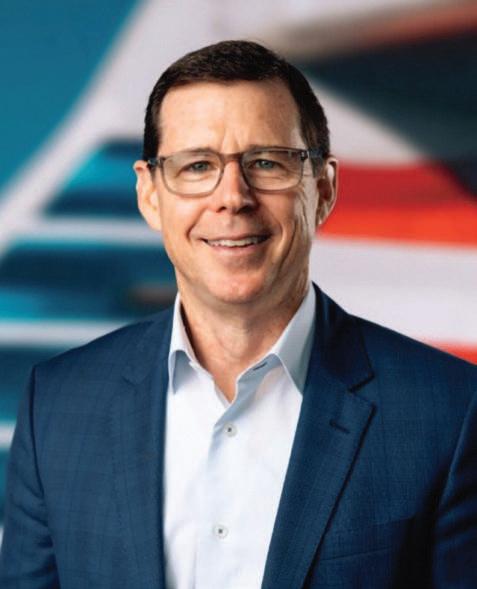
Dion Flannery joined PSA as president in 2014, when the airline had 49 planes, and was promoted to CEO in 2022. PSA now has 140 planes, and is awaiting delivery of 14 used Bombardier CRJ900s that parent American Airlines bought in 2024 and will lease to its wholly owned subsidiary. It takes about six months to finish maintenance and other work to make a plane conform to the existing fleet, he says.
Flannery joined the former Continental Airlines as a director, analyzing pricing and revenue for trans-Atlantic flights, in 1993, after earning an MBA from the University of Houston. He has a bachelor’s degree in advertising from the University of Texas.
He spent more than nine years with Continental before moving to America West Airlines and then to US Airways. He spent nine years there and was part of US Airways when it merged with American Airlines in 2013. As president of US Airways Express, he led PSA, Piedmont Airlines and seven regional affiliates.
1,850 Number of PSA employees based in Charlotte, mostly flight attendants and pilots, along with about 50 support personnel.
350 Number of PSA hires in Charlotte related to location of its headquarters here in January.
least 200 of the 350 jobs locally. PSA is happy with that number because it allows for business continuity, while also giving the company an infusion of new ideas, Flannery says.
PSA received more than 6,000 applications for those new management and support sta positions, showing a tremendous amount of interest in PSA, he adds.
e airline hires about 1,200 workers a year, which comes with being a regional airline, as pilots, ight attendants and mechanics o en move to the larger planes at the major airlines where they can make more money, says Flannery.
PSA Airlines ies the American Eagle-branded jets, which are the 75-seat CRJ 900s and the 65-seat CRJ 600s. American Airlines handles reservations and bookings, and the goal is for passengers not to notice a di erence. When reservations are made, passengers will see that an American Eagle ight is being handled by either PSA or its two other companies, Envoy Air or Piedmont Airlines, which are based in Irving, Texas, and Salisbury, Maryland, respectively.
Independently owned Republic Airways and Sky West Airlines also y American Eagle jets under contract with American Airlines.
In 2022, American raised pilot pay at its three wholly-owned a liates to nearly match compensation earned by its own pilots. e move doubled the cost of regional operations, which had long been a lower-cost option to serve small cities, according to Airline Weekly Rival commuter airlines have mostly matched American’s move.
Passengers entering a plane from the sky bridge can look down and to the le to observe the marking of the carrier. Frequent business travelers may grow more familiar with PSA workers because of the relatively small size of the company compared with the 130,000 who work for American Airlines.
PSA’s growth depends on American Airlines, which is adding 14 jets to its eet. He says Charlotte will also be a part of PSA’s story.
“Charlotte is a growing community, a business-minded community, and it’s where a vast majority of our crew members come and go on a daily basis,” he says. “We need to look at Charlotte as our long-term home.” ■














By Natalie Bradin



SA veteran North Carolina nurse trains her peers to seek new opportunities.




everal years ago, Viola Pierce found herself in a state similar to many nursing peers: emotionally drained and overwhelmed by too much work. But the native of tiny Hollister in Halifax County doesn’t like to sit still or feel defeated.
Instead, she founded Viola Pierce Nursing, or VP Nursing, in 2018 to empower other nurses to utilize their skills to launch consulting and coaching businesses. Attending an industry conference a decade ago shi ed her career perspective and ultimately shaped the birth of her company.
“I saw that nurses were doing other things, and I loved speaking from stage and really transforming people’s lives,” Pierce says. “ at’s how my life got transformed.”
e pressure that many nurses face in their demanding industry is evident in high turnover rates and constant hiring campaigns by most of the state’s healthcare industry. Board meetings at some organizations routinely include reports on hirings, vacancies and reliance on traveling-nurse programs needed to ll shortages.
“ e message I want to share is straightforward: Nurses serve as problem solvers and innovators and educators and leaders, rather than only caregivers,” Pierce says. “ e ability to make a di erence does not require additional educational degrees. e solutions that healthcare needs already exist within our knowledge.”
Pierce has deep roots in nursing. Her mother and sister worked as nursing assistants. Pierce earned an LPN degree in 2002 at Nash Community College. She added a bachelor’s in nursing from Winston-Salem State University in 2014, and a doctorate from Grand Canyon University in 2019.
Most of her career was spent at hospitals in Rocky Mount, now UNC Nash Healthcare, and Tarboro’s Heritage Hospital, which is now ECU Health.
VP Nursing’s business model includes a variety of options aimed at motivating nurses. For $149 a month, Pierce provides
coaching services to her members, along with access to events and workshops that support a community of healthcare workers looking to build their own enterprises.
e company presents the annual Millionaire CEO Nurse Conference, which Pierce hosted in February at 1 Word Plaza in Rocky Mount. e venue is part of Word Tabernacle Church, an evangelical Christian megachurch that has long promoted Black entrepreneurship.
Pierce is author of “ e Audacity of Execution — Nurse to Entrepreneurs: Turn Your Knowledge into Wealth.” e book describes her story and career passion. Some clients that have found success through her coaching appear on e VP Nursing Podcast, in which nurse entrepreneurs pay $50 to share their stories and build their brands.
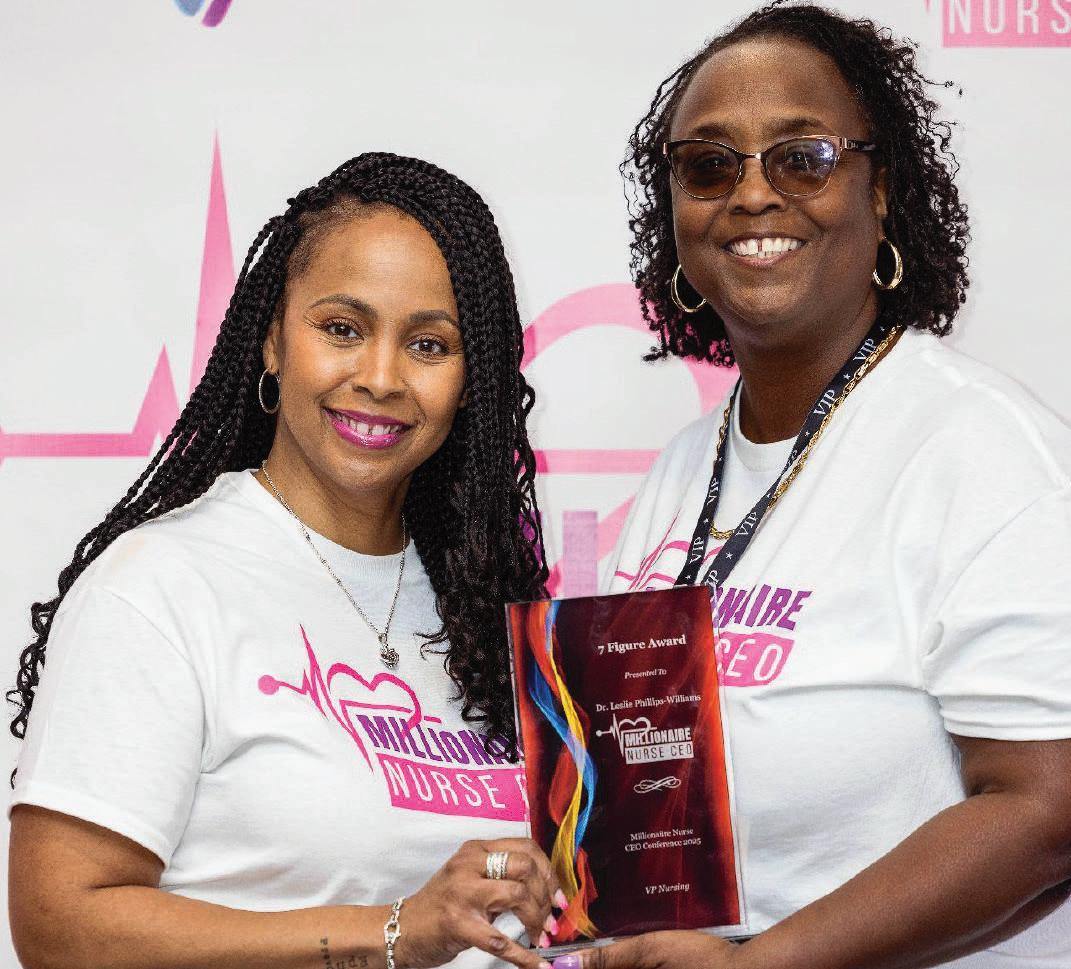
“My biggest success is seeing other nurses being successful,” Pierce says. “For me, it is not about me at all. It is about them changing their lives.”
Effective nurses have to combine empathetic leadership and clear communication skills, which Pierce notes can help them be good speakers and life coaches. “Nurses use their high emotional intelligence and problem-solving abilities under pressure together with their deep sense of purpose to connect with people emotionally while delivering practical solutions,” she says.
VP Nursing had its first client hit the 7-figure annual revenue earlier this year. “For me, that is my win,” Pierce says. “I love to see that because I want nurses to be able to transform the edge of their knowledge into something tangible, so that they can live their best lives.”
Most of Pierce’s clients continue as nurses. “Our team demonstrates how nurses can use their days off to develop their business operations instead of only recovering from work,” she says. The goal is to “exit with confidence and not chaos.”
Pierce offers two pieces of advice for women leaders: Be unapologetically yourself, and invest in coaching. “I believe that coaches need a coach,” Pierce says. “I’m a firm believer that you should invest in your personal and professional development.”
Asked where she sees VP Nursing in 10 years, Pierce had a quick response: “I want us to be valued as a $10 million company at the minimum.” ■

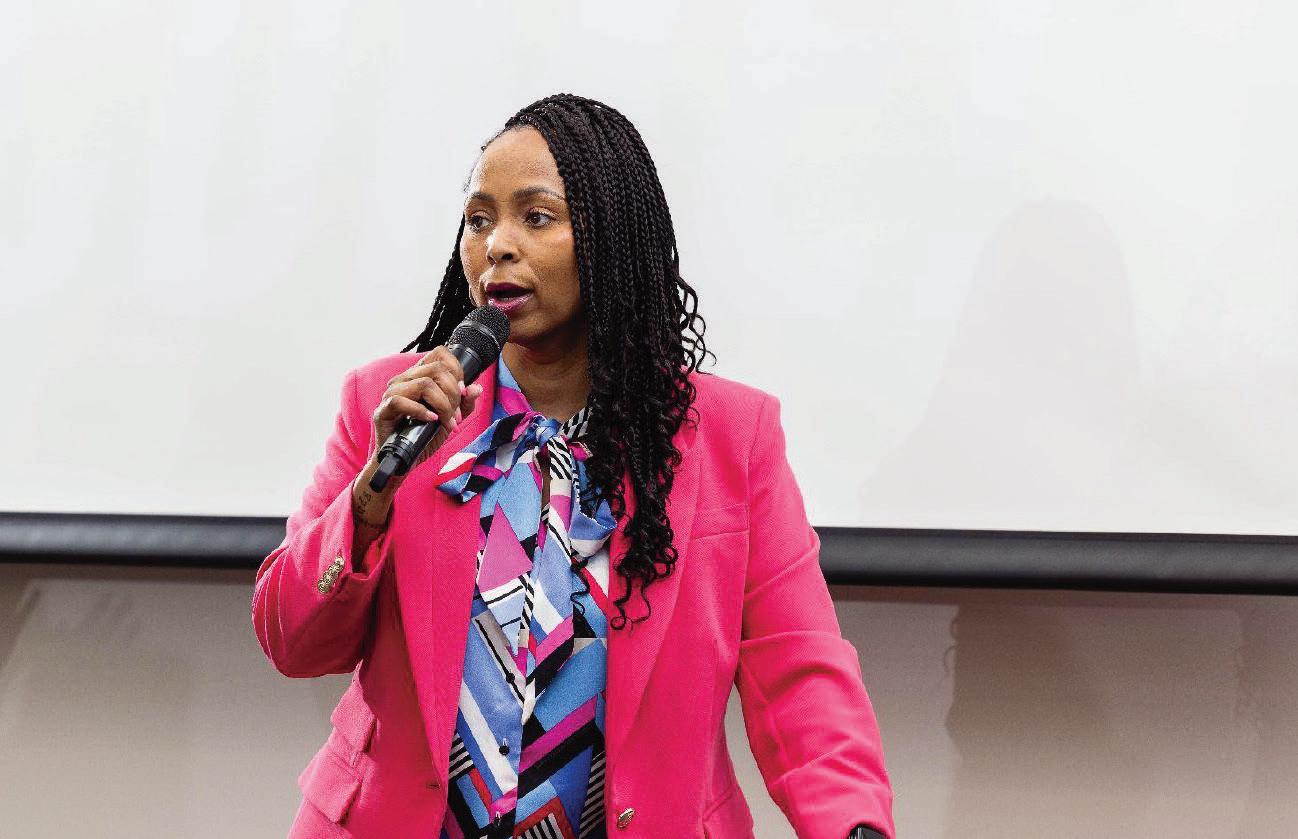




A federal judge ordered Bank of America to pay $540 million to the FDIC, resolving a long-running lawsuit over alleged underpayment of deposit insurance assessments from 2013 to 2014. The FDIC’s broader $1.1 billion claim was partially dismissed due to timing. BofA says it has already set aside reserves. The nation’s second-largest bank also announced a $5 billion expansion to add 150 branches across 60 U.S. markets by 2027.
Advocate Health named Steve Smoot as division president for North Carolina and Georgia, effective June 2. He succeeds Ken Haynes, the newly named chief enterprise services officer for Advocate. Atrium Health is the group’s brand name in the south, while it uses Advocate or Aurora in its Illinois and Wisconsin markets.
Berlin-based Trench Group will open its first U.S. plant here, investing $50 million and creating 74 jobs by early 2026. HSP US will produce high-voltage transformer bushings, offering an average wage of $77,315.
A city councilmember said the city is paying Police Chief Johnny Jennings $300,000 after he considered suing over threatening texts from former council member Tariq Bokhari. The city has declined to confirm details. Bokhari resigned in April after being appointed to a transit job in the Trump administration.
AvidXchange is being acquired by TPG, a Fort Worth, Texas-based global alternative asset management firm in partnership with Corpay, a leader in corporate payments. TPG and Corpay will acquire AvidXchange for $10 per share, which values the accounts payable automation software provider at $2.2 billion. AvidXchange shares closed at $8.20 on the day the acquisition was announced.
Hendrick Automotive, the largest U.S. privately held automotive retailer, added two Columbia, South Carolina, dealerships to its roster. Hendrick acquired Love Chevrolet and Love GMC, and now has 13 dealerships in the Palmetto State and almost 100 across 11 states.
The Leon Levine Foundation donated $24.9 million to UNC Charlotte to extend its Levine Scholars Program through 203233. The merit-based scholarship supports top students focused on leadership and service. With this gift, the foundation’s total giving to the university nears $53 million.
Tennessee real estate firm Highland Ventures acquired a 19-story, 409,000-square-foot property at 525 N. Tryon St. for $24 million from New York Life Real Estate Investors. The property has a tax value of $97.2 million. New York Life paid $60 million for the property in 2014.
The Lone Star legend — Whataburger opened its first North Carolina restaurant here, with plans to open eight more in the Tar Heel state this year, including one in Hickory this month. Based in San Antonio, Whataburger began in Corpus Christi, Texas, in 1950, and now has more than 1,100 restaurants. North Carolina is its 17th state, and it opened several restaurants in South Carolina last year.

Cape Fear Commercial brokered the $28 million sale of a 17-acre industrial property occupied by John Deere. Hank Miller and Paul Loukas represented the sellers, MT96 Crosspoint and AHG Crosspoint. New York-based Bluerock bought the site, which includes a 327,000-square-foot building.
Istanbul-based Pelsan Tekstil aims to invest $82 million in a breathable film manufacturing plant here, creating 200plus jobs. The plant will support hygiene, medical, and insulation industries.
Prolec-GE Waukesha, a company with 374 employees already in Wayne County, plans to add 330 jobs with a $140 million investment to build a second manufacturing facility for power transformers. The new jobs for the Wisconsin-based company will pay an average salary of $71,912, well above the current Wayne County average of $46,211
Boviet Solar’s solar module factory has opened. The $294 million investment is expected to create 900 jobs. The company makes solar panels and photovoltaic cells. It has commercial, industrial and residential customers in the United States.
East Carolina University Chancellor Philip Rogers filled two leadership positions by removing interim titles. Meagan Kiser was appointed general counsel and vice chancellor for legal affairs and J. Christopher Buddo was appointed provost and vice chancellor. Both had been filling the roles as interim since October.
Big Lots is about to open 132 stores it had closed last year due to its bankruptcy filing, the chain’s new owners, Variety Wholesalers, announced. The shuttered stores will reopen in 14 states, mostly in the south, including 27 in North Carolina. Big Lots closed about 1,000 stores after filing for bankruptcy in September. Variety Wholesalers acquired the business in January.
The North Carolina Aquarium at Fort Fisher will launch a $65 million renovation and expansion later this year, its first major upgrade in more than 20 years. Plans include the state’s largest shark habitat, a rooftop sky deck, and immersive education and conservation spaces.
Washington Regional Medical Center, the only hospital serving Washington County’s 10,713 residents, hopes to emerge from bankruptcy by late May. Rural hospitals not tied to major systems face steep financial challenges. Nearby Martin General closed in 2023 and 13 other northeastern North Carolina counties have no hospitals.
The N.C. Coastal Land Trust purchased 150 oceanfront acres in an area known as The Point, one of the last undeveloped tracts on North Carolina’s barrier islands. The $8 million acquisition ensures permanent conservation and protection of rare habitat and wildlife.
Asheville-based FedUp Foods launched operations at its new 130,000-square-foot facility, formerly home to TRU Colors Brewing. The kombucha and cold brew maker will distribute from this site across North America. The company now runs three East Coast facilities and plans to employ 100 here.
Plans for the first RV park within city limits are advancing after a pause. The project, called Studio Park RV, is proposed on an undeveloped 18-acre tract at 2231 One Tree Hill Way and would include a 50-pad RV park that would cater to travelers wanting a luxury RV experience. Site plans include three buildings and a kayak launch on Smith Creek. Construction could begin in 2026.

Pinehurst Resort will build Course No. 11 at its Sandmines site — its second full-scale course in two years. Designed by Bill Coore and Ben Crenshaw, the course will contrast with Tom Doak’s No. 10. The project taps into the site’s mining history and natural ridges, aiming for a 2027 debut.

Chestertown, Maryland-based Gillespie Precast plans a $10 million concrete manufacturing plant here that will create 39 jobs. Gillespie produces manholes, catch basins and other custom structures made from precast concrete. Once cured, the products are transported to construction sites for drainage and other uses.
Blue Cross Blue Shield NC is asking for sanctions against LifeBrite Community Hospital of Stokes, alleging it submitted over $76 million in false lab claims. The dispute, ongoing since 2018, includes accusations of billing for tests never performed and misrepresenting services as in-network.
Cone Health acquired Novant Health’s stake in HealthTeam Advantage, making it the sole owner of the Medicare Advantage plan with 22,000 members. The plan, launched in 2016, expanded significantly while Novant was a coowner. Cone Health also opened a $100 million, five-story, 156,000-square-foot comprehensive heart and vascular center that will serve about 120,000 patients next to its Moses Cone Hospital.
Amazon received a permit to build a 192,026-square-foot, $24.4 million facility at Ritters Logistics Center. The move follows its February land purchase and continues Amazon’s rapid Triad expansion, which includes major sites in Kernersville, Whitsett and Colfax.
Tanger’s board authorized a $200 million share repurchase program, replacing a $100 million plan set to expire May 31. Considering Tanger shares have traded between $25.94 and $37.57 in the past year, the company could buy back between 7.7 million and 5.3 million shares.
New Piedmont Triad International Airport Authority Chair Graham Bennett says its terminal may need a full rebuild due to worn-out utilities. A redesign could reduce gate count while enhancing traveler comfort. Early-stage planning is underway, with construction possibly starting within a few years.
Ziggy’s, a live music venue from longtime Triad promoter Jay Stephens, opened on South Elm Street. With deep roots in Winston-Salem and High Point, Ziggy’s aims to foster local talent and build community through intimate shows and a $200,000 investment.
Quebec-based Opsun Corp. will invest $9.3 million to create a manufacturing site for solar panels that’s expected to create 20 jobs. It will be the Canadian company’s first U.S. production facility. Average annual wages for the positions will be $63,015, exceeding Guilford County’s average of $60,195.
Blue Ridge Cos. has hired Dallas firm Willow Bridge to manage daily operations at its 10,000-unit apartment portfolio. The company will retain ownership while shifting its focus to development and construction. It still manages commercial assets like Palladium shopping center here.
Culp sold its Quebec mattress fabrics plant for $6.2 million. The company received $1.4 million upfront, with the remainder due over six to 12 months. It projects net proceeds of up to $3.5 million from the sale.
Atrium Health Wake Forest Baptist opened its $78.4 million outpatient surgery center on its Ardmore campus. The 55,000-square-foot facility includes 12 surgical suites and a robotic surgery training room. Plans date back to 2010.

Polyvlies USA will invest $31 million to expand its factory and create 28 new jobs. The nonwoven textiles manufacturer makes fabrics from natural and synthetic fibers. The project follows approval of performance-based incentives from both the city and county.

Bob’s Discount Furniture will enter the Southeast with six new stores in North Carolina this year, part of a 20-store U.S. expansion. The Connecticut-based retailer will mark its 200th store with a location here, with other N.C. openings set for Durham, Fayetteville, Wilmington, Jacksonville and Winston-Salem.
Well, a company that promotes health engagement, attracted $30 million in funding, bringing its cumulative capital raising to more than $150 million. The company now employs more than 250 and promotes its use of artificial intelligence to help predict and address health risks within employee populations. The company could reach profitability next year, says co-founder and President David Werry.
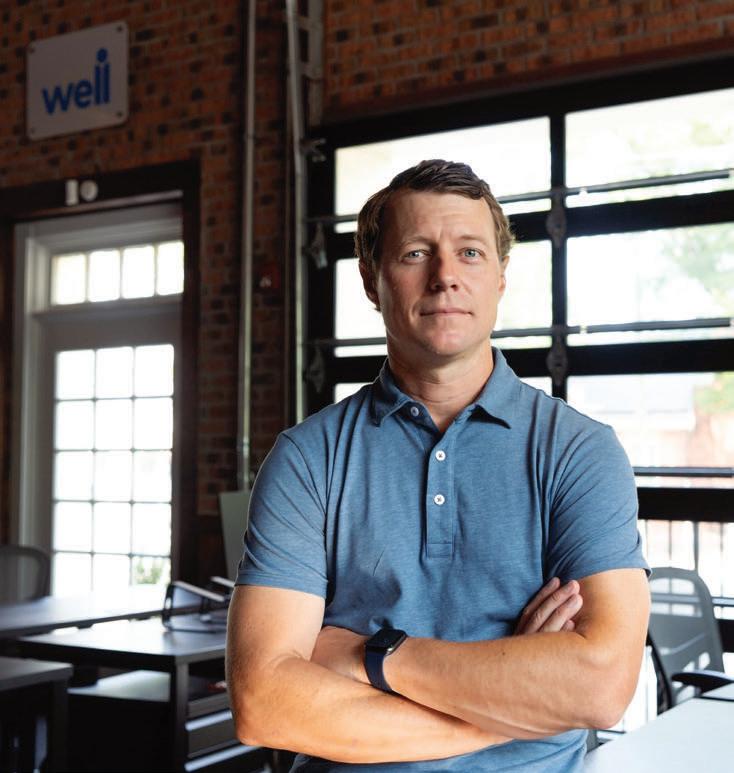

Deutsche Bank’s office here has grown to 1,100 employees — its largest ever — with plans to reach 1,300. The site serves as a U.S. and global tech hub, with 100 positions currently open. Renovations and continued hiring reflect its long-term Triangle commitment.
Town Council approved Hillside Trace, a 190-unit affordable housing community on Martin Luther King Jr. Boulevard. Developed by Taft Mills Group, the project will serve households earning 60% of area median income and marks the town’s largest single-site affordable development.


























The Emmy Award-winning series My Home, NC returns for a tenth heartwarming season. Join host Heather Burgiss as she visits the people and places that make NC so inviting, from a James Beard Award-nominated chef and an artist forging a new path in printmaking to a vibrant community rebuilding after Hurricane Helene.

Thursday nights on PBS NC


Duke University began offering voluntary buyouts as part of efforts to cut $350 million in expenses as it faces possible federal funding cuts. The school has frozen hiring, suspended capital projects and may revise employee benefits. Officials warn layoffs may still be necessary.
Fortrea Holdings CEO Thomas Pike is stepping down and will resign as a member of the company’s board of directors. He has been its CEO since its spinoff from Burlington-based Labcorp in June 2023. Fortrea’s board named Peter Neupert, a director on the board, to succeed Pike as interim CEO.
Duck-Rabbit Craft Brewery shut down after more than two decades. The brewery, known for its milk stout and decorated history, filed for Chapter 7 bankruptcy, joining a growing list of N.C. breweries facing industry headwinds.
Ahead of its scheduled opening later this year, Fujifilm Diosynth Biotechnologies manufacturing plant has secured a 10year agreement worth $3 billion to make medicines for the New York drugmaker Regeneron. Fujifilm’s other major customers at the site includeJohnson & Johnson and TG Therapeutics.
Carolina Hurricanes owner Tom Dundon received a rezoning request that will allow him to move forward with a $1 billion sports and entertainment district around the Lenovo Center. The plan allows up to 40-story buildings, 1,450 housing units, 1.8 million square feet of non-residential space and a 4,000-seat concert venue. Construction could begin this year and take a decade or more to build out.
California-based Genentech, a subsidiary of Switzerland-based Roche Holdings, plans a $700 million investment that will create 420 jobs at a 700,000-square-foot manufacturing facility. Genentech creates medicines for seriously ill patients. Its fill-finish operation will be its first on the East Coast.
Building a 46-bed hospital here has two different suitors. Cone Health and a joint venture by Duke Health and Novant Health both filed Certificate of Need requests with state regulators to build a hospital in Alamance County at a cost of $250 million and $225 million, respectively. State regulators aren’t expected to make a decision for several months on which plan to accept, if either.
City Council endorsed tolling a 10-mile stretch of U.S. 1 between Interstate 540 and Purnell Road. The move would fund conversion to a six-lane expressway, replacing traffic lights with interchanges. NCDOT estimates tolls could generate $800 million.
Lee and Associates Property Management merged with Lundy Management Group. The combined company of 50 professionals will operate under the Lee and Associates brand and manage more than 13 million square

feet of space, and become the largest locally owned property and management company in the Triangle.
UNC Health Chatham added maternity care to its 25-bed hospital. Over the last decade, 10 North Carolina hospitals have shut down maternity units.

The historic Green Park Inn, built in 1891 and host to presidents, Annie Oakley, and Gone with the Wind author Margaret Mitchell, is being torn down. Town officials say the new owner plans to build condos and a 40-room hotel on the site.
Spirtas Worldwide, which purchased Canton’s 185-acre former mill site last fall, plans to release its master plan within six months. Owner Eric Spirtas says the plan includes economic, residential, commercial and environmental components. Spirtas continues to cover wastewater treatment costs as discussions with the town continue.
NASCAR’s Cup Series brought its All-Star race back to the historic speedway here for the third consecutive year, attracting approximately 80,000 visitors to the four days of racing.
Pittsburgh-based PPG Industries will invest $380 million to establish a manufacturing center for its aerospace coatings and sealants that’s expected to employ 110 workers. Production is expected to begin by the first half of 2027. PPG first established a Cleveland County operation in the 1950s, but sold its fiberglass unit in 2017 to Nippon Electric Glass, which still has operations there. ■







North Carolina’s banking industry, from Charlotte headquarters to small town branches, has been a strong part of the state’s economy for decades. But forces beyond its direct control are reshaping its present and future. Fewer federal regulations, are welcome relief, but tariffs, interest rates and other issues are causing concern and uncertainty. To better understand what’s happening, Business North Carolina gathered industry experts to take stock of the industry, explain its current position and describe possible paths forward. Their conversation was moderated by Editor David Mildenberg. The transcript was edited for brevity and clarity.


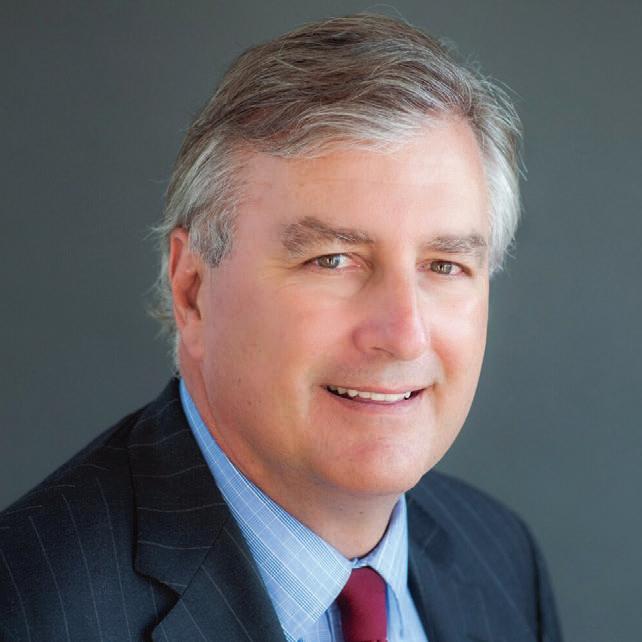

The discussion was sponsored by:
•North Carolina Bankers Association
•Pinnacle Financial Partners
•PNC
•Robeson Community College
•TowneBank North Carolina
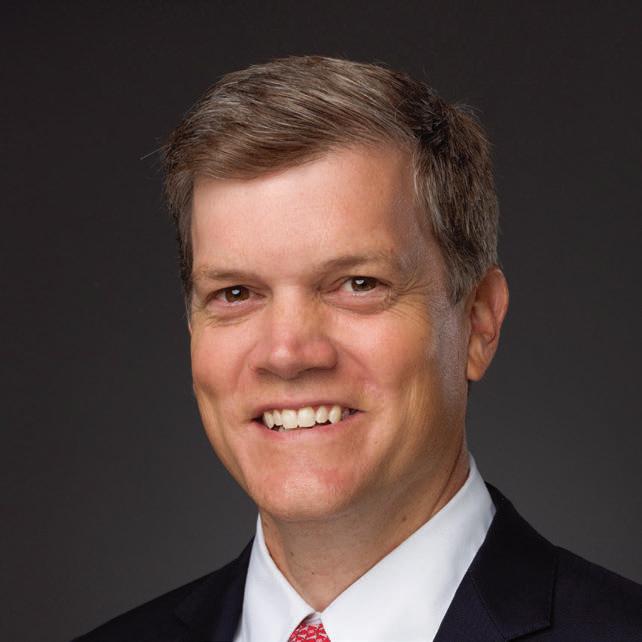

Adam Currie CEO
First
Bank
CURRIE: North Carolina continues to be a fantastic growth story. Jobs, residents and opportunities are increasing statewide. Urban and rural regions are growing. That isn’t happening at the same level nationally as it is here. That will continue to be a tailwind for the state’s financial industry.
Current banking trends support efficiency. Consumers and businesses demand faster and easier ways to do business, such as payments, loan applications and deposit-account openings. But that pursuit has been at the expense of the personal relationship. Banking will always be a relationship business.
GWALTNEY: Uncertainty is a common theme in my conversations with bankers. There’s uncertainty about tariffs, changes in government agencies, interest rates and inflation. All dampen the economy, which affects banks through slower loan and deposit growth. When driving through heavy rain or thick fog, rather than continuing, it’s safer to pull over and wait for the weather to clear. Many businesses are choosing that approach. It’s less risky. Changes underway in federal regulatory agencies are directly affecting the industry.
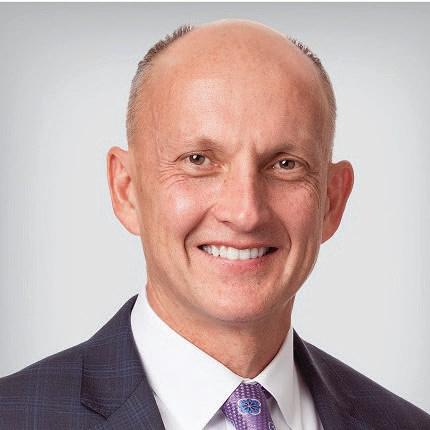
It’s an understatement to say those changes are dramatic. Beyond the largescale downsizing in staffing and changing leadership, many of the regulations issued during previous administrations have been withdrawn. We’re relieved and pleased with much of what we’re seeing. But we’re unsure where it all will land. That makes planning difficult.
ANDRESS: The industry loves the additional flexibility that comes with less regulatory burden, including stress tests and other requirements put in place, at least for the largest banks, after the Great Recession. Those regulations, maybe at some point, were a step too far. I’m not suggesting that there wasn’t a good reason for them, but maybe it’s time for more flexibility.
There’s a broader range of economic outcomes today than maybe ever, so we don’t know where we’re headed. But the additional regulations have put the entire banking industry in a good position. We can all feel good, whether or not we like some of those regulations.
ALLEN: This year began with a strong sense of optimism. People were expected to be active, deploying capital and engaging more. We started to see that, but people

Matt Davis president, regional banking director
North Carolina

have become more cautious. There’s uncertainty about the long-term impacts to suppliers. Projects in place are moving forward. But there is a sense of pause, waiting 60 or 90 days for better clarity.
DAVIS: Bankers always take a cautious approach, slowing or waiting until there’s a better feel for which way things will settle. Uncertainty enhances risk. It’s important to understand your operating environment before doing anything too bold. Optimistic but cautious is the overriding theme that we hear from our customers and peers.
ALLEN: Business news channel CNBC named North Carolina the second-best state for business in 2024 and first in 2022 and 2023. It was for good reason. It’s a strong banking state. Many banks are headquartered in Charlotte, which has been a key player in the industry for years.
ANDRESS: North Carolina is the first destination of many recent college graduates, whether they studied here or elsewhere. That is incredibly beneficial to our economic growth.
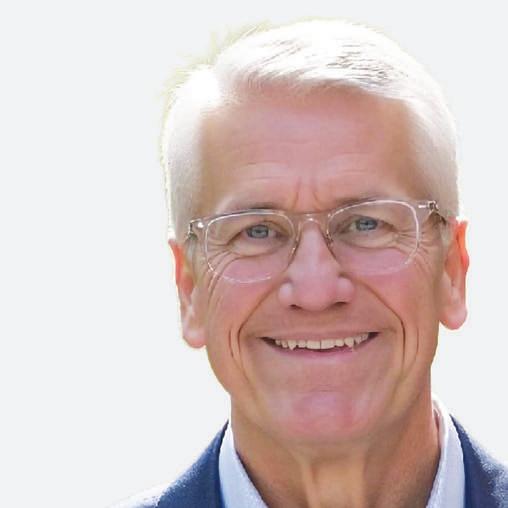

Peter Gwaltney president and CEO North Carolina Bankers Association



DAVIS: Beyond a strong foundation, other aspects of the state’s economy are positives for financial institutions. There’s a strong digital technology focus. The industry must continue investing in data analytics, cloud integration and other technology to be competitive. The university system is robust and focused on technology and business. As current economic uncertainties settle the industry can leverage and catapult to success from that foundation.
CURRIE: Banks and financial firms are catalysts for economic development. A strong banking presence makes any community economically stronger over time. North Carolina is home to some great homegrown financial institutions. It seems like every bank from the Northeast and Midwest has North Carolina in its strategic plan. That creates great opportunity for North Carolinians and keeps the job market vibrant.
ALLEN: It’s rapid. As new technology is introduced, banks follow, ensuring they all have the same bells and whistles. While technology is integral to what we do, we can’t completely embrace artificial intelligence. The human component is vital to our industry. We must complement technology with talented people who understand the industry and our clients.
DAVIS: Everybody gets enamored with new technology; I’m no exception. But banks are in the people business. I read that technology will never do some things, including engaging and empathizing with a human being. Technology does many things, especially data and quantitative efforts, better than us. So, we should focus on the qualitative aspects of life and relationships.
AI is a positive. Properly utilized, it forces us to do what we do best, which isn’t punching numbers into a spreadsheet. But it does take a person to interpret that data and discuss its implications with a
customer. Our customers entrust us with a lot of important data. We need to use technology wisely. That’s the key.
ANDRESS: About five years ago, fintechs were supposedly going to replace the banking industry. Banks are as strong as ever. Fintech’s inventions have accelerated the industry’s growth. In some cases, banks have co-opted their technology. In other cases, acquisitions were made. It comes down to fitting together technology and people. The two go hand in hand. Our CEO says it’s not your father’s banking business anymore. The technology-oriented discussion at internal meetings today is very different than years ago.
ALLEN: The talent pipeline has shrunk. There are fewer bank-run training programs. Pinnacle Financial Partners doesn’t have one. We recruit bankers from other banks; that’s our model. I’d like universities to become more engaged, offering a banking career path.
NCBA under Peter’s leadership has been more involved with them. Graduates need analytical skills. That’s not beyond the typical finance and accounting degrees. But that knowledge needs to be applied to what we do and how we do it. Soft skills are important, but we can develop those better than the more technical and analytical skills.
Pinnacle’s Bankers in Schools program puts our bankers in middle and high
schools, where they talk to students about careers in the industry. They’re more than loan transactions and financial management. It’s information technology, cybersecurity, administrative and more.
DAVIS: TowneBank recently began a training program, because there aren’t many available. It’s common practice to let somebody else train workers. Bankers move around. That’s the way it happens. We’re still in our infancy, but we’re establishing relationships with major universities. We recruit at them. I’m scheduled to sit on an upcoming panel, interviewing and hiring recent graduates, who will enter a formal training program. The industry needs more of that.
PATE: Our accounting and finance program blends traditional fundamentals with modern technology. It has many fintech elements such as blockchain analytics and digital banking. Handson experience is emphasized through industry partnerships and internships. Simulation software creates practical scenarios for our students.
Our faculty maintains close working relationships with banking and financial professionals. They’re invited into our classrooms on a regular basis to discuss current trends, needs and opportunities in the industry. What they share shapes our curriculum. Everything is data driven and evidence based now, so we need to teach those skills and impart that way of thinking to students.
We’ve added a course, Data Analysis and Decision-making, to our accounting


and finance degree and business administration degree. Students learn to collect and analyze data, visualize information, assess risk, make predictions and navigate decision-making processes effectively. We teach the theoretical part in the classroom, putting them in position to apply their knowledge in the job market. We’ve added a one year 12-hour certificate program called Bookkeeping and Data Management. It provides fundamental accounting skills focused on financial decision-making through data organization and analysis.
We added a work-based learning option to our curriculum. Students earn course credit. It’s seen statewide through the apprenticeship program and work-based learning programs in general. We’re giving students an option, allowing them to choose an apprenticeship or internship or a traditional classroom course for the credit they need.
A few years ago, we changed our Customer Service course to Customer Experience. That broadened its classroom work to include understanding complex customer requirements and handling stressful situations. We aligned our goal with what we’re doing in the classroom and the customer service skills that are required today.
The job market for accounting and finance students is promising. There’s strong demand for entry level accounting, bookkeeping, financial assistance and similar positions. Our local banks and credit unions consistently seek our graduates. Their technical knowledge and understanding of the local economic landscape are valued by small businesses. Remote work opportunities have opened doors to larger firms and jobs in urban centers.
CURRIE: The two banking jobs that are most in demand are bankers and technologists. The industry needs
commercial and retail bankers with deep relationships in their communities and experts who can translate technology to business leaders.
ALLEN: The real tell is the state’s successes. The state’s three largest metros — Charlotte, Raleigh and the Triad — rarely go a week or two without welcoming a business relocation or expansion. They’re figuring out how to be competitive at the state level to attract companies.
GWALTNEY: I recently spoke to a company that’s considering an expansion into a Tier 1 county — one of the state’s less economically advantaged counties. There are state incentives to make those moves more possible. That’s something the state has been smart about. It certainly can do more, but it does some things well.
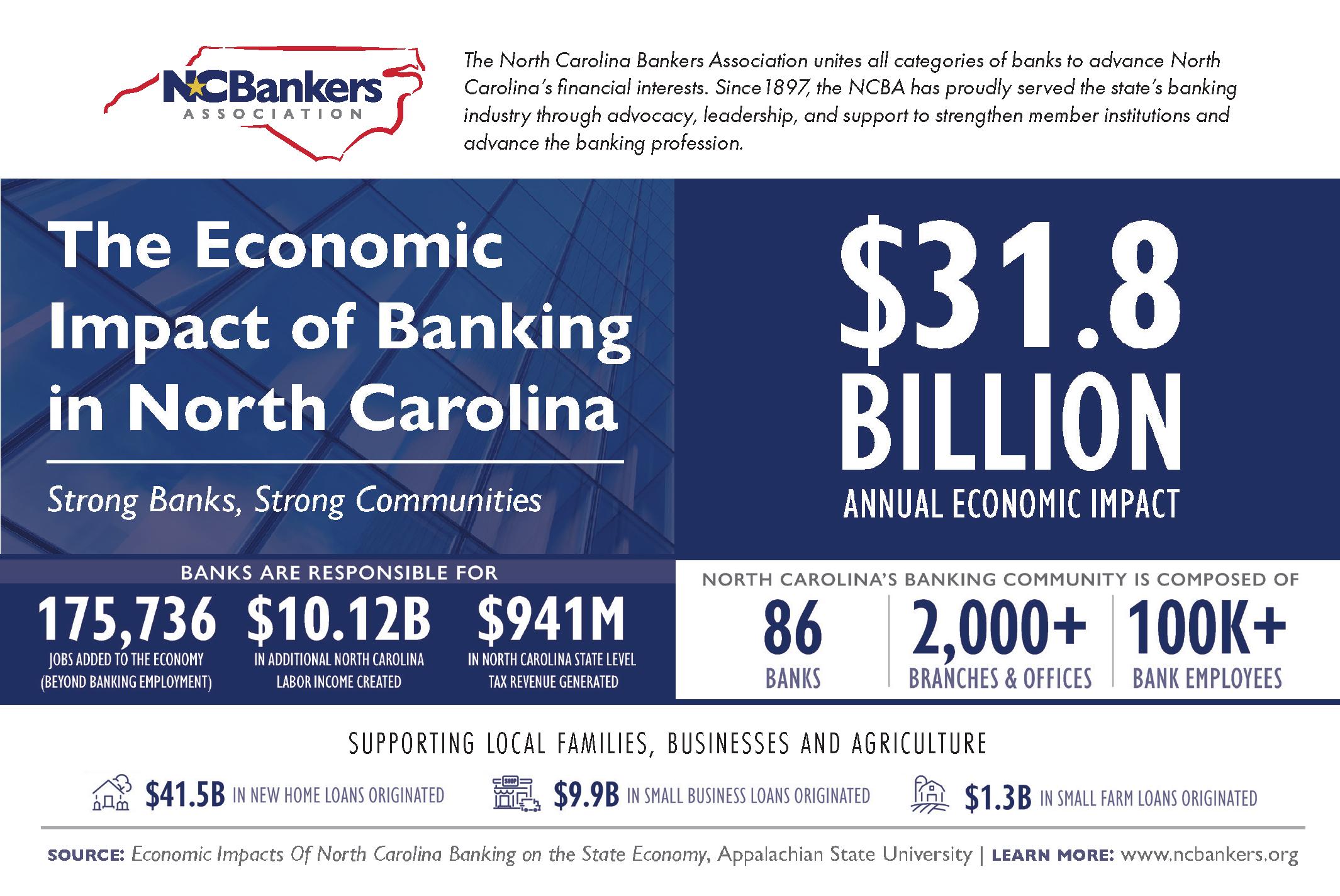
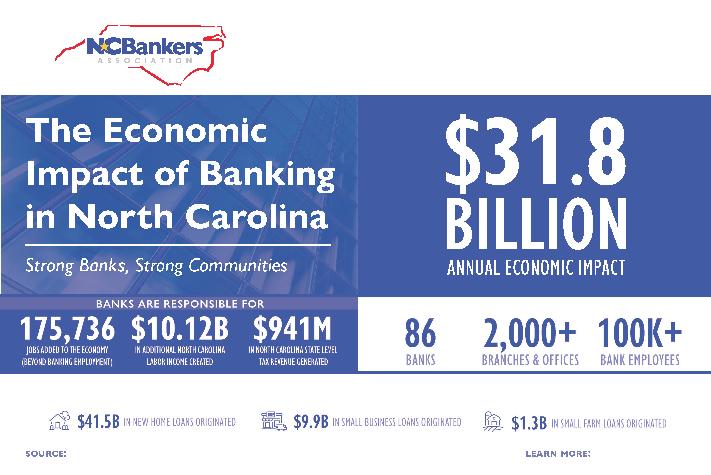
North Carolina has an extraordinary business climate. It’s one of the top three fastest growing states in terms of population. Shortly after I moved here, the General Assembly was considering the Job Development Investment Grant program. NCBA typically stays in its lane, but under the leadership of Bob Hatley, its chair at the time, it weighed in on that. The math made sense, because there was accountability if the business didn’t create the promised number of jobs with the incentives it received. It has worked, and other states do it, too. It’s a game that we must play to be in play for businesses to come here and create jobs. That makes the state better.
GWALTNEY: The U.S. Census Bureau defines banking deserts as places that
lack a bank branch. Their minimum size is determined by their location: 2-mile radius for urban communities, 5-mile radius for suburban communities and 10-mile radius for rural communities. North Carolina has a handful in sparsely populated regions such as the Great Dismal Swamp and Great Smoky and Blue Ridge mountains.
A bank branch needs a certain level of deposits and loan activity to be viable. Short of that, it can’t be staffed, insured or operated. No one wants to be the last bank to leave a community. A lot of angst is spent over that decision. And when that bank decides to leave, extraordinary things are done to serve those residents.
There are about 2,000 bank branches across North Carolina. About a quarter of them are in Tier 1 counties. A large number are in Tier 2 counties, then there are a number in Tier 3 counties, which are the most economically advantaged.
PATE: Rural North Carolina students bring a unique perspective. They’ve been shaped by the transition to an economy dominated by service industries, such as banking and finance, from agriculture and manufacturing. They demonstrate remarkable resourcefulness and practical financial literacy. They learned it out of necessity.
Our students value developing portable skills, which are applicable locally or within other markets. They recognize that financial expertise is particularly valuable in rural communities, which often have limited access to financial services. Robeson County is rural. While we acknowledge that there is a wage disparity between rural and urban workers, our students appreciate the lower cost of living and strong community connections that we have here. Many students want to contribute locally rather than automatically pursuing opportunities in large cities.
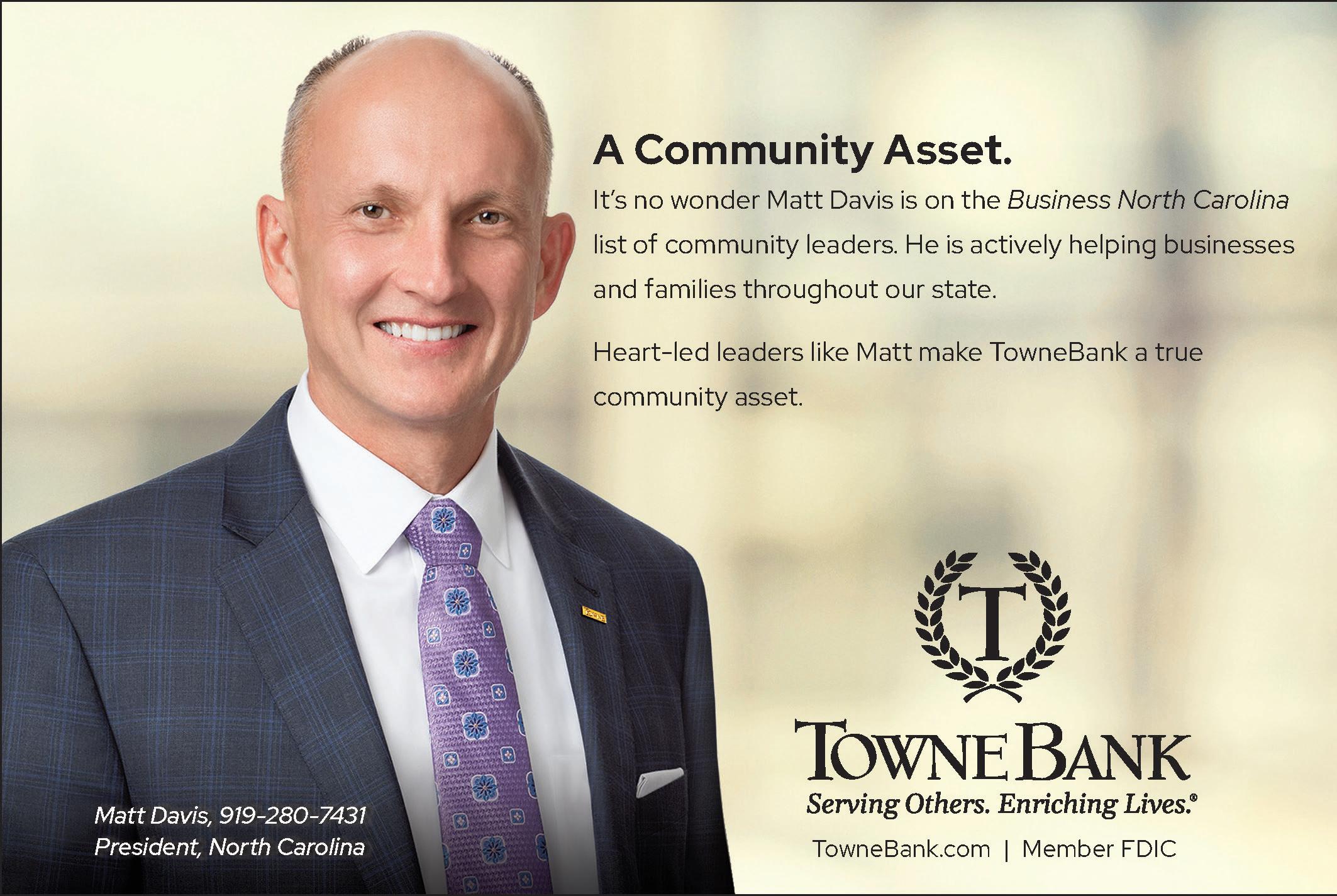
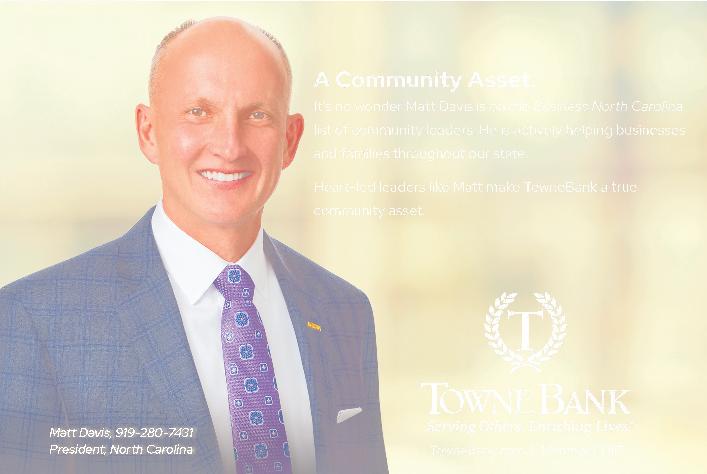
ALLEN: Interest-rate commentary for a bank can go many directions. Like other industries, we like stability. Banks tend to do better in lower interest-rate environments, though zero is tough. That’s typically where our clients become more active. Activity tends to decrease as rates rise. I’m not advocating where rates should be, but a lower environment is usually better for banks.
DAVIS: It’s better when rates change slowly rather than quickly. The industry is adaptable, just as the country and economy. But that adaption can take time. It’s hard to predict the ideal interest-rate environment. A bit lower than where it’s now is probably better. But everything is relative. When I had an 8.25% fixed rate on my first house, I thought I hung the moon. But my children say they could never buy a house at that rate.



ANDRESS: We started this conversation discussing the range of potential outcomes for the economy. The same could be said for today’s interest-rate environment. We could argue for wide interest-rate swings in either direction. That’s why it’s important for banks to be well capitalized and positioned for the foreseeable future.
GWALTNEY: The Fed Funds Rate was 4.3% on April 24. The average Fed Funds Rate is 4.6% over the past five decades. So, we’re in a good place, though recent history would say it’s too high.
CURRIE: The banking industry has faced three major economic crises in five years. We experienced the pandemic, the failure of Silicon Valley Bank and the bank liquidity crisis in 2023, and now the tariff tantrum. Banks are generally well capitalized, well reserved and have plenty of liquidity. An economic downturn is never fun, but I do feel we are prepared this time around. Market fluctuations are part of business, and as leaders, we have to prepare our company
as well as we can for the inevitable tough times. Hopefully, we will avert a serious downturn this time around, but we are prepared if that is not the case.
ALLEN: We change lives. It’s special when you can put someone in a home, help start a business, or help someone retire or accomplish goals. Our clients become friends. It’s rewarding to see that happen.
We work in the community. We teach financial literacy classes at schools and churches. We support nonprofits. Our workforce volunteers. We do it as a team, as a family. All of my colleagues do these things in their markets. The day-to-day is great, but that allows us to do the big things.
DAVIS: Banking has always played an integral part in the community. It’s great to help others achieve everything that they want to do. That’s rewarding.
ANDRESS: PNC’s Grow Up Great program focuses on early childhood education. If a child doesn’t get a good start, then the chances of catching up educationally and otherwise are long. When I was introduced to it 13 years ago, when I started working for PNC, I envisioned reading books to young children. We’ve done some of that, and it’s a joy. But it has been a privilege to see the work that supports these young children and their families. PNC supports the arts community. If you’re going to have a vibrant economy, then you need a strong arts community.
GWALTNEY: I have a front row seat to all of this. There are 100,000 bankers statewide. They’re great people doing great work. They’re doing large company lending and financial literacy. They were handing out piggy banks to children on National Teach Children to Save Day in April. They do many other things. It’s often said that if something good happens in a community, it usually starts at the local bank. It’s so true. ■




This is the thirty-seventh in a series of informative monthly articles for North Carolina businesses from PNC in collaboration with BUSINESS NORTH


Finance and technology executive Ned Carroll is unable to recall a time when he wasn’t fascinated with the premise of how well-managed data can be used.
His love of data has lineage dating back generations. As a child, Carroll spent his weekends with his grandfather at the Port of Baltimore calculating ship turnaround time, berth productivity, dwell time and other metrics used to assess productivity of port operations.
While in high school, he learned of his family’s history leveraging data to impact world events. His great-grandfather served in World War II as a researcher and epidemiologist for the War Office on Malaria, the predecessor to the Centers for Disease Control, to help battle the No. 1 killer of U.S. troops in the Pacific Theater: tropical disease.
Fast forward to today, and Charlotte-based Carroll is using this background context of how powerful data can be to understand the world around us and help formulate solutions to advance automation in banking.
This, together with 30 years of industry experience, provides Carroll the inspiration and capacity necessary to address the seemingly paradoxical challenge of harnessing the power of advances in Artificial Intelligence (AI) within the responsibly regulated framework of the financial services industry.
“AI is not new,” says Carroll. “As a student at Davidson College, I did AI. The difference now is that the availability of data, compute and tools makes it easier, faster and cheaper to access.”
As executive vice president and head of Enterprise Data and Automation at PNC Bank, Carroll is accountable for driving the application of AI for all bank stakeholders and delivering solutions that drive efficiency, while upholding the responsibility that accompanies a financial institution’s stewardship of data. It’s a delicate balance he refers to as prudent innovation.
Fortunately, the same types of skills required to manage AI responsibly have been used to manage models that impact the safety and soundness of the financial system, so the financial services industry is well positioned to deploy AI responsibly.
“As an enterprise, we are always seeking new ways to work smarter and create greater efficiencies while delivering the best customer experiences possible,” says Carroll. “PNC has been using AI for years to drive efficiencies and will continue to do so in a strategic and thoughtful way that optimizes return on investment, minimizes risk and prioritizes our customers’ best interests.”
Carroll frequently shares his insights with executives throughout the country. And while AI use cases and particulars can vary widely across industries, the same fundamentals apply.

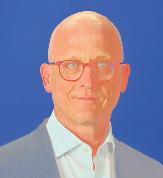
As interest in AI continues to grow and it becomes increasingly more accessible to organizations, Carroll cautions against viewing AI as a silver bullet for addressing business and operational challenges. He emphasizes that AI should be recognized for what it truly is: a way to extract value from data. And it takes a lot of data to operationalize AI.
“Data and AI are often approached as two independent conversations, when in fact the connections and interdependencies between the two cannot be ignored,” he says.
Bad data can plague a model with flawed results and can create ripple effects. As the saying goes, “garbage in, garbage out,” so any AI strategy must be built atop a strong data strategy.
“I analogize the connection between data and AI models with food and how we nourish our bodies,” says Carroll. “Consuming junk food with little nutritional value is akin to feeding models low-quality data. A model is only as good as the data that fuels it.”

Beyond the data-quality imperative, there are several considerations organizations should evaluate when contemplating AI implementation, including viability, risk and cost, says Carroll. For PNC, applying AI involves a thoughtful approach and emphasis on demonstrable value.
“Before even considering leveraging AI as a tool, organizations should ask themselves, ‘What are we trying to solve for?’” he says.
In some instances, the most immediate or cost-effective solution may be an old-fashioned process improvement.
And while the potential for AI is exciting, organizations need to think beyond how they can leverage it – and focus on how to control it in a way that is reliable and trustworthy, understanding the risks and building guardrails to help mitigate risk.
“In some ways, AI can be viewed as a high-performance car,” says Carroll. “Engineering for speed and power may be the objective, but the importance of safety mechanisms cannot be overstated. Additionally, it’s not always needed. For example, I don’t necessarily need a Ferrari to drive to the grocery store.”

Additionally, organizations should be mindful of potential cybersecurity or privacy risks and how to safeguard the vast volume of data that informs AI models. Privacy and protection of customers is paramount.
“The cost of introducing AI into a business’s operations extends beyond the initial investment in the tech and upskilling for employees. The true cost over the long term — beyond the initial capital investment — should be part of the decision calculus,” Carroll says.
When it comes to PNC’s prudent approach to innovation and AI, Carroll leans into the enterprise’s core messaging of brilliant and boring. “While AI may not seem boring at face value, our priorities are intentionally focused on responsibility, security, quality and driving efficiencies,” he says. “Our human-in-the-loop approach means our employees continue to play a critical role in managing data and automation technologies and strive for the highest level of quality. It’s important that we consistently demonstrate our commitment to responsible AI to our customers, shareholders and employees.”











Technology is transforming heart care. It’s uncovering problems sooner, administering treatments less invasively and saving more lives in emergencies.
Donavan Harbison, a 34-yearold recreational runner and former N.C. Central University football player, began feeling bad in late 2023. The young father from Graham thought he had pneumonia. His doctors diagnosed him with heart failure. And technology gave him a new lease on life.
Harbison was the second patient in the world to receive the BiVACOR Total Artificial Heart, according to a Duke Health News report. Duke University Medical Center doctors implanted the device, which kept him alive for 10 days until he underwent a human heart transplant. The device has been implanted into five patients as part of an FDA Feasibility Study since then. The FDA recently added 15 patient slots to the study.
About the size of a coffee mug and sporting a power cord that connects to external rechargeable lithium batteries, BiVACOR takes over for a patient’s heart until a donor heart becomes available.
“In performing the transplant, we cut out the patient’s diseased heart that wasn’t working, then we sewed in this product,” says Dr. Carmelo Milano, Duke transplant surgeon and Division of Cardiothoracic Surgery chief. “Two pumps are built into the artificial heart, pumping blood into the lungs and the whole body.”
BiVACOR is suitable for all ages and sizes of patients. That’s an improvement over previous artificial hearts, which were much larger. “The artificial heart is designed to have great durability,” Milano says. “And although this initial trial serves as a bridge for patients until they can receive a natural heart transplant, the product is being designed as a long-term treatment for heart failure and someday will be used in place of a permanent transplant.”
Doctors and patients are excited and hopeful, imagining a day soon when BiVACOR will save more lives. That time has already arrived for other pieces of technology. Whether deploying artificial
intelligence to diagnose underlying heart disease or wearable devices that detect blood pressure and heartrate abnormalities, they’re improving the ways doctors diagnose, treat and prevent heart disease. And patients are better off for it.
Death may not be imminent for most patients suffering from faulty heart valves. But their condition robs them of quality of life. And it can lead to more serious conditions such as liver or kidney failure. Tricuspid valve regurgitation is a common type of heart disease. “In many people, the tricuspid valve becomes leaky because of valve or right ventricle dysfunction,” says Dr. John Vavalle, medical director of UNC Health’s Structural Heart Disease Program. “Instead of the blood going out to the lungs like it needs to, it is pumped in the wrong direction — back into the body — which leads to excessive fluid accumulation.”

The only treatment for tricuspid valve regurgitation has been valve replacement. Traditionally that requires open-heart surgery. But the very condition that doctors want to correct makes these patients poor candidates for surgery. “The mortality rate associated with open-heart surgery to fix tricuspid valve regurgitation is higher than the mortality rate of any other valve surgery,” Vavalle says.
New safer options for valve replacement are here. UNC Hospitals’ structural heart team performed a minimally invasive transcatheter tricuspid valve implant in March 2024. It was the first time the newly FDAapproved procedure was done in a clinical setting in North Carolina. The procedure involves replacing a damaged heart valve using a catheter inserted through a blood vessel in the groin. It takes about 90 minutes, and most
Cardiologists at Novant Health’s Structural Heart Program in WinstonSalem are repairing leaky heart valves with a similar minimally invasive surgical procedure. Like UNC’s implant procedure, it involves running a catheter to the heart through the femoral artery. Once it reaches the faulty valve, the device deploys a clip that reconnects the leaking valve flap, correcting the problem. “When we talk about structural heart disease from a cardiology standpoint, we’re trying to attempt to intervene on problems with the heart at a lower risk to the patient and done in a way that patients don’t need a long recovery time,” says Dr. Robert Preli, a cardiologist who practices at Novant Health Forsyth Medical Center.
Most patients who undergo a valve repair are typically back to their usual
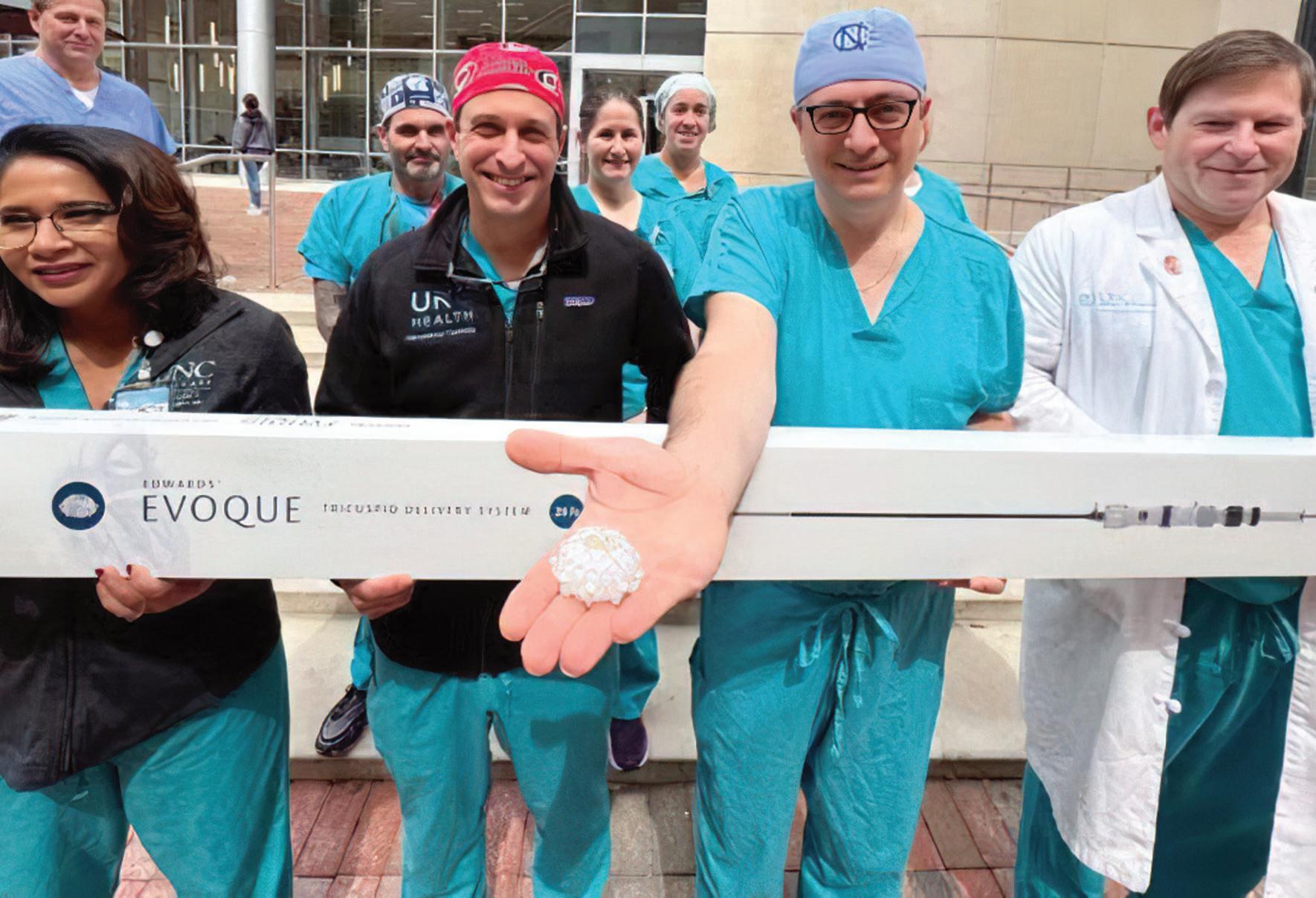
After heart surgery, technologydriven monitoring fosters better outcomes for patients. Atrium Health launched its Perfect Care Initiative in 2018, thanks to a three-year, $1.1 million grant from The Duke Endowment. Patients receive a digital health kit that includes a fitness tracker, weight scale and blood-pressure cuff. They allow patients to monitor their vital signs and activity levels at home.
Patient data is collected and transmitted in real-time to care team members through a smartphone app, which also enables scheduling appointments, messaging doctors and other healthcare providers, and attending virtual visits. “This continuous monitoring helps us detect issues early and intervene before they escalate, which is a post-surgery game changer,” says Dr. Kevin Lobdell, a cardiothoracic surgeon at Atrium Health in Charlotte.
Readmission rates have decreased and patient satisfaction has soared since Atrium launched Perfect Care Initiative.
Heart surgery patients, who on average had their post-surgery hospital stay reduced by one day, had about 40% fewer readmissions within 30 days of surgery and were able to go directly home from the hospital, bypassing rehabilitation facilities. “In July 2019, we enrolled our first patient, and now we have approximately 3,000 patients in the program,” Lobdell says. “They are engaged in their own care and feel more confident about going home, knowing if they have issues, they can connect with their care team through technology.”
patients go home the next day. “We’ve been implanting this valve for more than a year, and the results have been nothing but stellar,” Vavalle says. “After I performed my first procedure, I was as excited as I’ve ever been before and knew this valve was going to be a game changer.”
activities in about a week. “The best part is that we know right away if the procedure worked,” Preli says. “It’s gratifying for everyone on our care team to be able to bring a brand new heart procedure to our patients here in the Triad.”
Even with advances in heartdisease detection, many people are unaware that they’re at risk of sudden cardiac arrest. If the worst happens, their survival chances increase if they receive treatment from an eCPR heart and lung bypass machine. The “e” stands for extracorporeal membrane oxygenation.


ECMO removes a patient’s deoxygenated blood through a central vein and passes it through an oxygenator, which removes carbon dioxide and adds oxygen. The blood returns to the patient’s body through the femoral artery.
Atrium Health Wake Forest Baptist Medical Center and Forsyth County EMS use eCPR, improving cardiac arrest outcomes in the communities they serve. In addition to providing traditional CPR and defibrillation on scene and in an ambulance, paramedics are identifying patients who could benefit from eCPR. They are placed on an ECMO machine once they arrive at the medical center in Winston-Salem. “When patients arrive at the emergency department, the ECMO team and emergency team work together to get the blood flow returning to their body,” says Dr. John Gaillard, an emergency medicine specialist at the medical center.
Gaillard says deploying eCPR requires a high level of expertise and a collaborative effort involving many hospital services and specialists. “This is a group effort from EMS, the emergency department, our cardiology team, ICU team and cardiac ICU team,” he says. “The whole cardiac care team at Baptist has done a lot to support this, and we plan to keep doing it and saving lives.”
Wearable technology can alert patients to heart disease before they feel symptoms. Donna Finnegan of WinstonSalem can attest to that. She noticed her heart rate was higher than normal, even
while sitting, thanks to her $30 smartwatch. While there weren’t any other detectable symptoms, she visited her primary care physician, who immediately sent her to Dr. Jack Xu, a Novant Health cardiologist at Forsyth Medical Center in Winston-Salem.
Xu determined the best treatment was bypass surgery. Novant Health reported that she underwent quintuple bypass surgery to open five blocked arteries she might not have known about until it was too late if she had not used her watch to monitor her vital signs.
Xu employed Computed TomographyFractional Flow Reserve, which uses artificial intelligence and other data analyses to show the severity of Finnegan’s blockages. He says CT analysis technology has improved over the past decade and become more widely available. “The scans themselves
haven’t changed, but the analysis of the images now uses AI to determine if there is underlying cardiac disease we can’t see with our naked eyes,” he says. “This helps us diagnose and treat cardiac disease at an earlier stage than we were able to do previously.”
American College of Cardiology and American Heart Association studies show that smartwatch data is a promising way to diagnose atrial fibrillation and detect concerning heart-rate trends.
“There’s so much potential with artificial intelligence, especially in cardiology,” Xu says. “The ultimate goal is to better identify patients with heart disease risk factors and diagnose them before their disease progresses.”
Patients are benefiting from advanced diagnostic imaging that comes from the installation of a GE Revolution Apex CT scanner at FirstHealth Moore Regional Hospital in Pinehurst. It leverages smart AI imaging to enhance care by delivering accurate results efficiently.
The GE Revolution Apex CT scanner offers high-definition imaging, fast scan times and advanced capabilities for


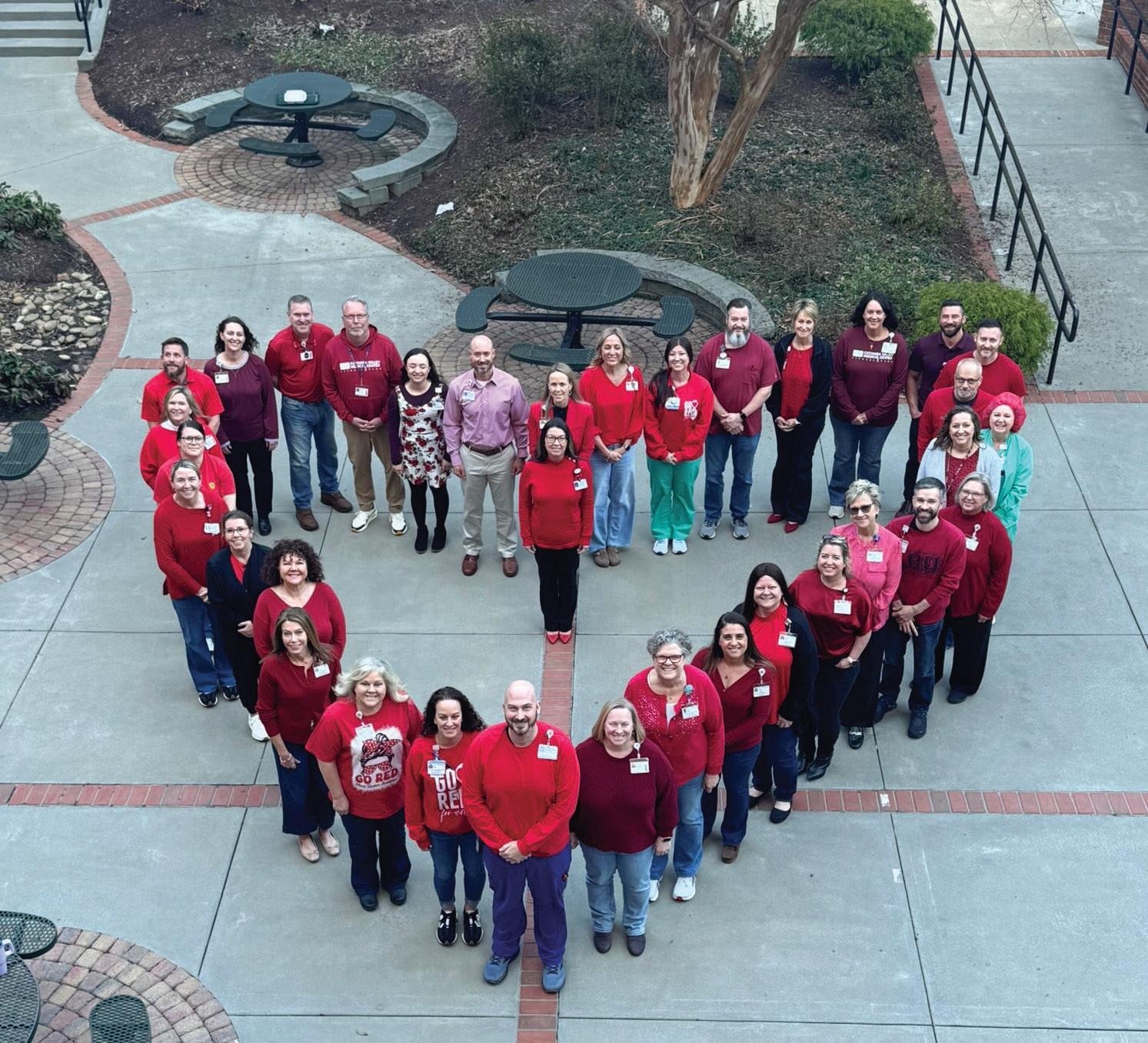
Valley Heart Center workers unite in support of National Wear Red Day and American Heart Month, bringing greater attention to heart disease. It’s the No.1 cause of death in the United States.
Forsyth County EMS EMTs Hannah Amoruso, left, and Laken Riddle, along with paramedic Jasson Vega, practice emergency cardiac care with a simulated patient mannequin.
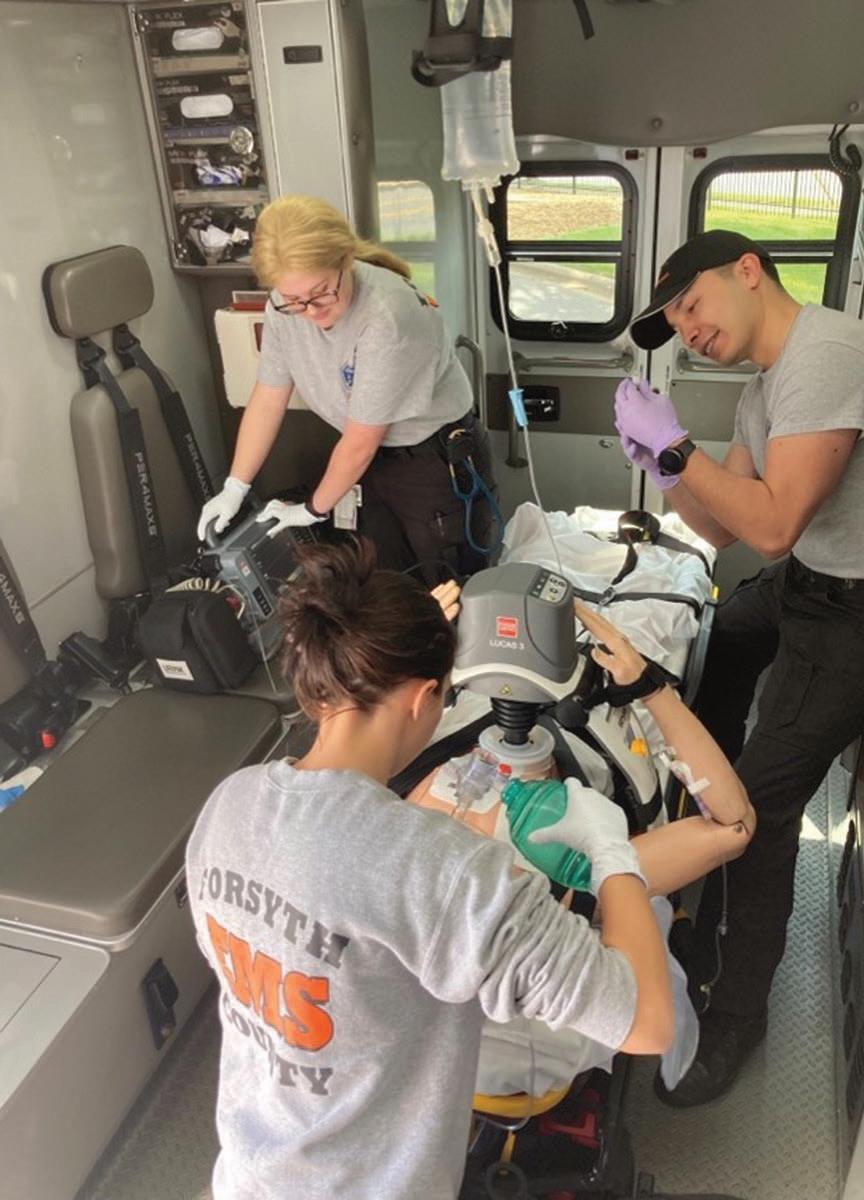



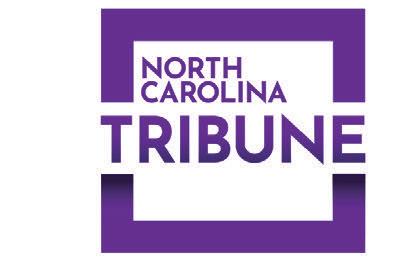



various clinical applications, including cardiac, stroke and trauma imaging.
It allows radiologists to do a CT workup in less than five minutes and a low radiation chest CT that captures images within one second, important for patients who cannot hold their breath. “The heart’s always moving, causing CT scan images to be blurry,” says Dr. Sean Regner, a cardiologist at FirstHealth Cardiology in Pinehurst. “We can’t exactly stop your heart to take a picture, so the best we can do is slow it down as much as we can, and we aim for 65 beats a minute.”
Moore Regional’s new CT scanner also takes images at set intervals. Artificial intelligence merges them, combing ones from different phases of the heart rate cycle into one version. That creates a 3D image, compared to a 2D X-ray image.
Regner says using CT scanning to detect cardiac disease is a relatively new concept. “Historically, if you wanted to know if you had obstruction in your coronary arteries, you would need a heart
catheterization, an invasive procedure, which carries some risk,” he says. “Or you might take a stress test. But with this new CT scan process, we can take a look at your arteries without putting you on a treadmill or risking surgery.”
New Bern-based CarolinaEast Health System employs a web-based health records system that gives patients access to


their health information on demand and in real time“ says Dr. Alex Kirby.
Through CarolinaEast’s MyChart patient portal, patients can view their medical history, test results, medications, vitals and other data via text message, app or website. “Patients can also review their visit notes and request prescription refills any time, even when they are on vacation,” Kirby says.
All healthcare providers using the charting system EPIC can easily exchange patient records, giving providers the ability to coordinate care with clinicians beyond CarolinaEast who also serve their patients and their families. That closes care gaps and reduces duplication. Companion software MyChart aligns patient billing processes to make it easier for patients to pay online. “I believe around threequarters of the hospitals in the United States are part of the system,” Kirby says. “So, we can easily get patient records from Duke, Chapel Hill and other health systems that are also treating our patients.” ■
Teri Saylor is a freelance writer in Raleigh.



Traditional company benefits like healthcare insurance and paid time off seem almost a given in today’s workplace. To recruit and retain employees, companies are offering perks that include remote work, regular opportunities for bonuses and a few are sharing profits and have plans in place for employees to take part in ownership.
But it’s not just money or time off. Companies are helping their employees achieve career goals with tuition assistance, career and personal coaching and fostering cultures that bring out the best in their workers.
In Business North Carolina’s annual list of Best Employers in the state, several themes prevail: Many of the companies on the list emphasize flexible work schedules, involvement in the community and showing concern for employees with perks that include maternity and paternity benefits and on-site fitness facilities or reimbursement for gym memberships. There are also fun activities from outings to sporting events and happy hours to companywide trips to the Bahamas.
Topping the list in four categories, from small to extra large employers, are Independent Insurance Agents of North Carolina, Parrish & Partners, Barringer Construction and Davenport & Co.
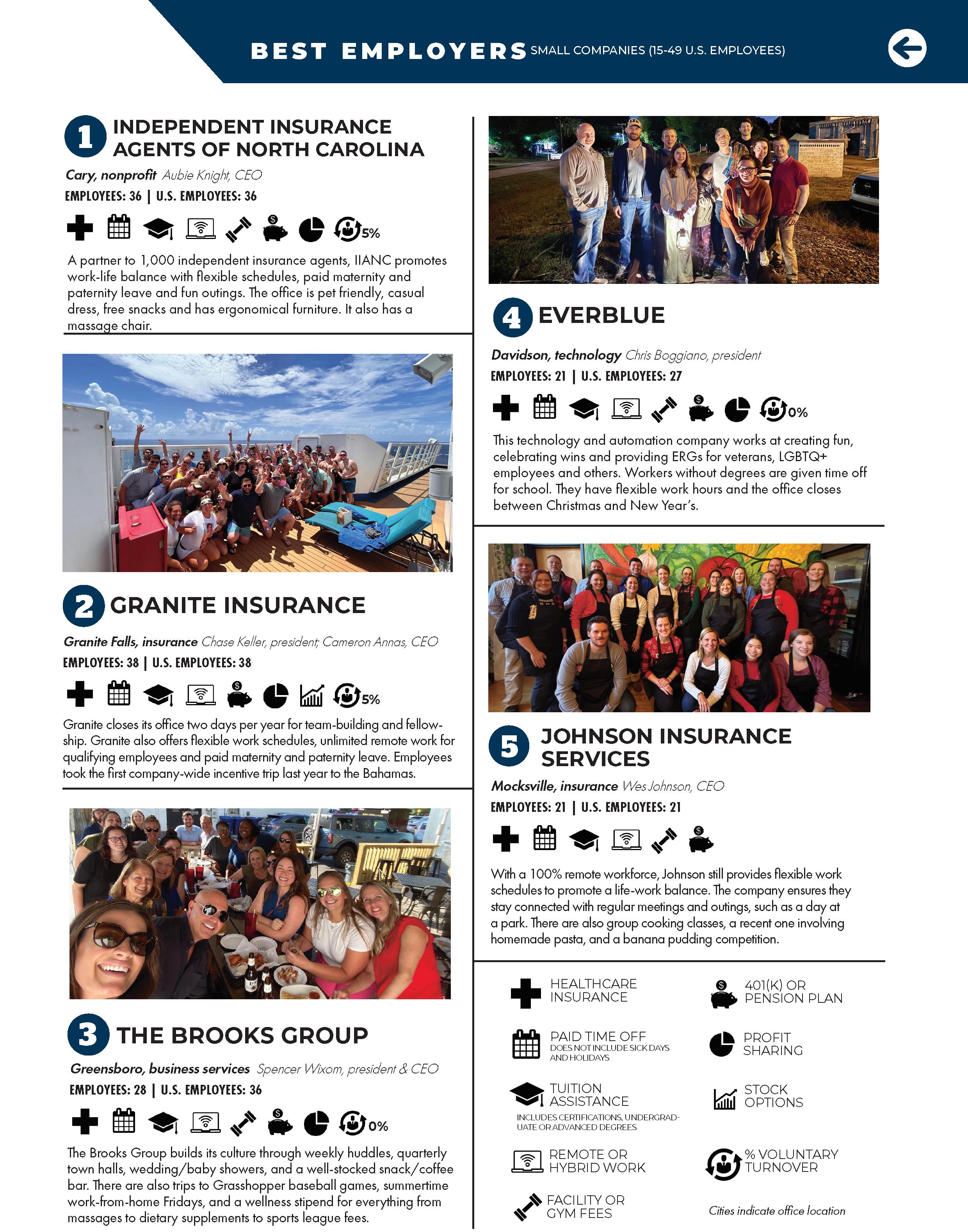

Charlotte, advertising, PR and marketing Joe Gass, president and CEO
EMPLOYEES: 23 | U.S. EMPLOYEES: 38




Heritage Signs has helped businesses brand both workplace interiors and event environments across the eastern United States since 1977. The veteran-owned business believes its diversity of talent, background and experience makes it a better company.

Atlantic Beach, construction Josh Lyle, president EMPLOYEES: 16 | U.S. EMPLOYEES: 16





Construction typically has high turnover. Lyle Contracting shows employee appreciation by encouraging supervisors to treat workers doing well to breakfast or lunch or handing out on-the-spot $15 Chick-fil-A cards. Summer outings include activities such as bowling or go-karts. Employees can bring dogs to work.
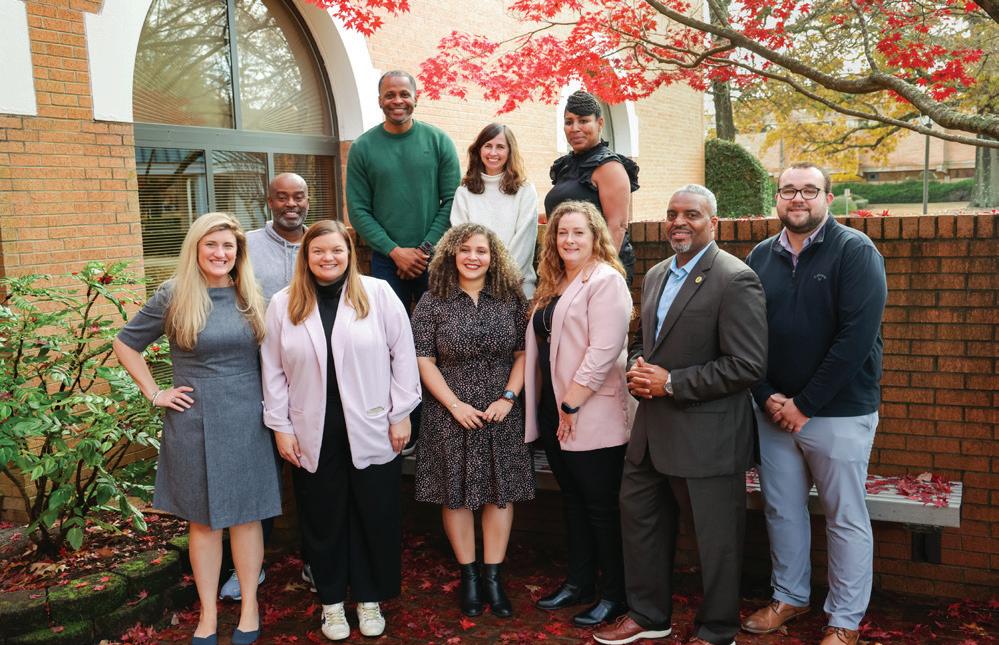
Raleigh, finance Kevin Dick, president and CEO EMPLOYEES: 39 | U.S. EMPLOYEES: 39







Asheville, healthcare Perry Stamatiades, founder and CEO EMPLOYEES: 19 | U.S. EMPLOYEES: 19 13% 10% 33% 0%
This company works to maintain a diverse workforce that’s committed to a work-life balance. Besides offering flexible work schedules, it offers partially paid maternity and paternity leave. Other perks include offering employees a pet insurance option. The company closes its offices down from Christmas Eve until after New Year’s Day.
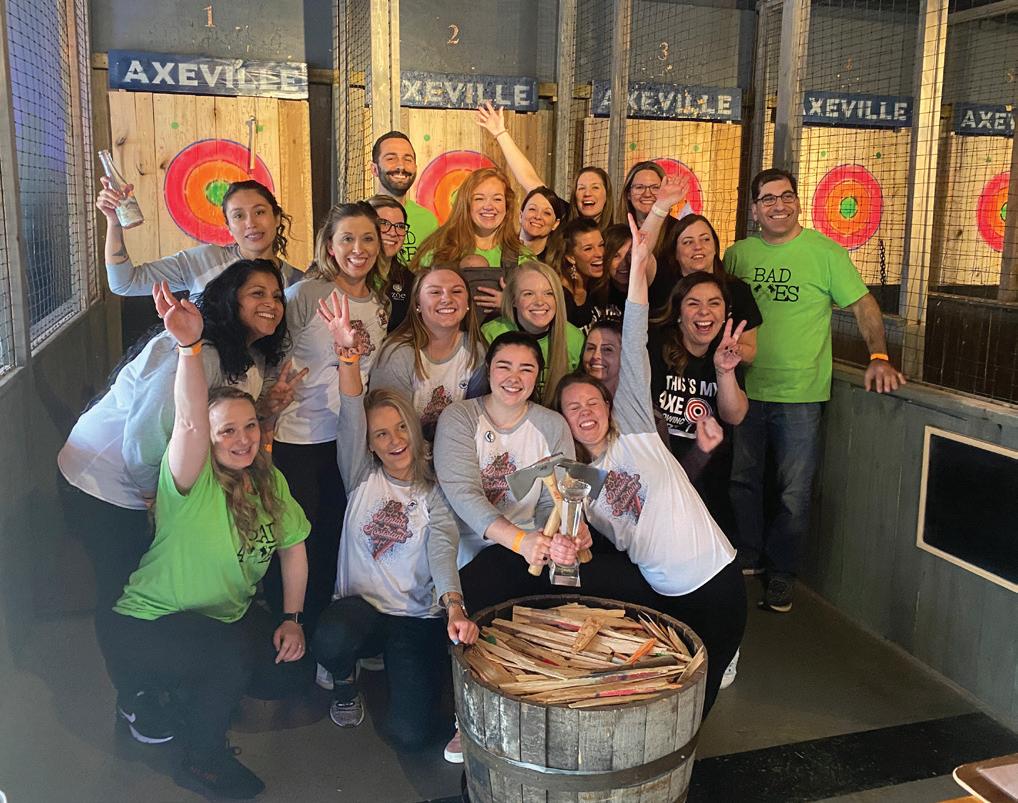






Free dental care is not the only reason employees smile. The organization supports community organizations and gives employees the opportunities for weekend trips, dinners out and shopping trips. Employees also have the chance to go on mission trips. Zöe Dental also holds free clinics twice a year.
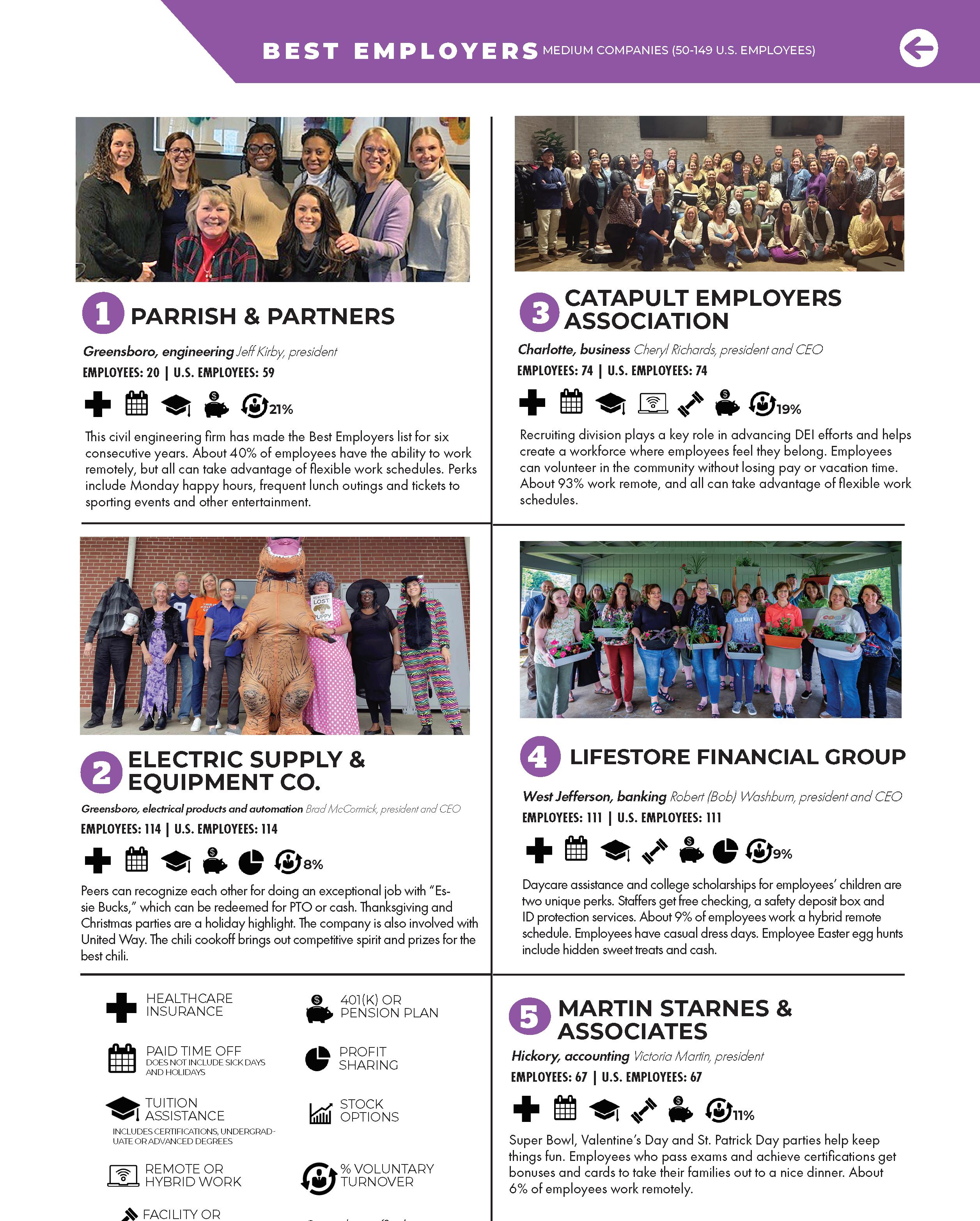

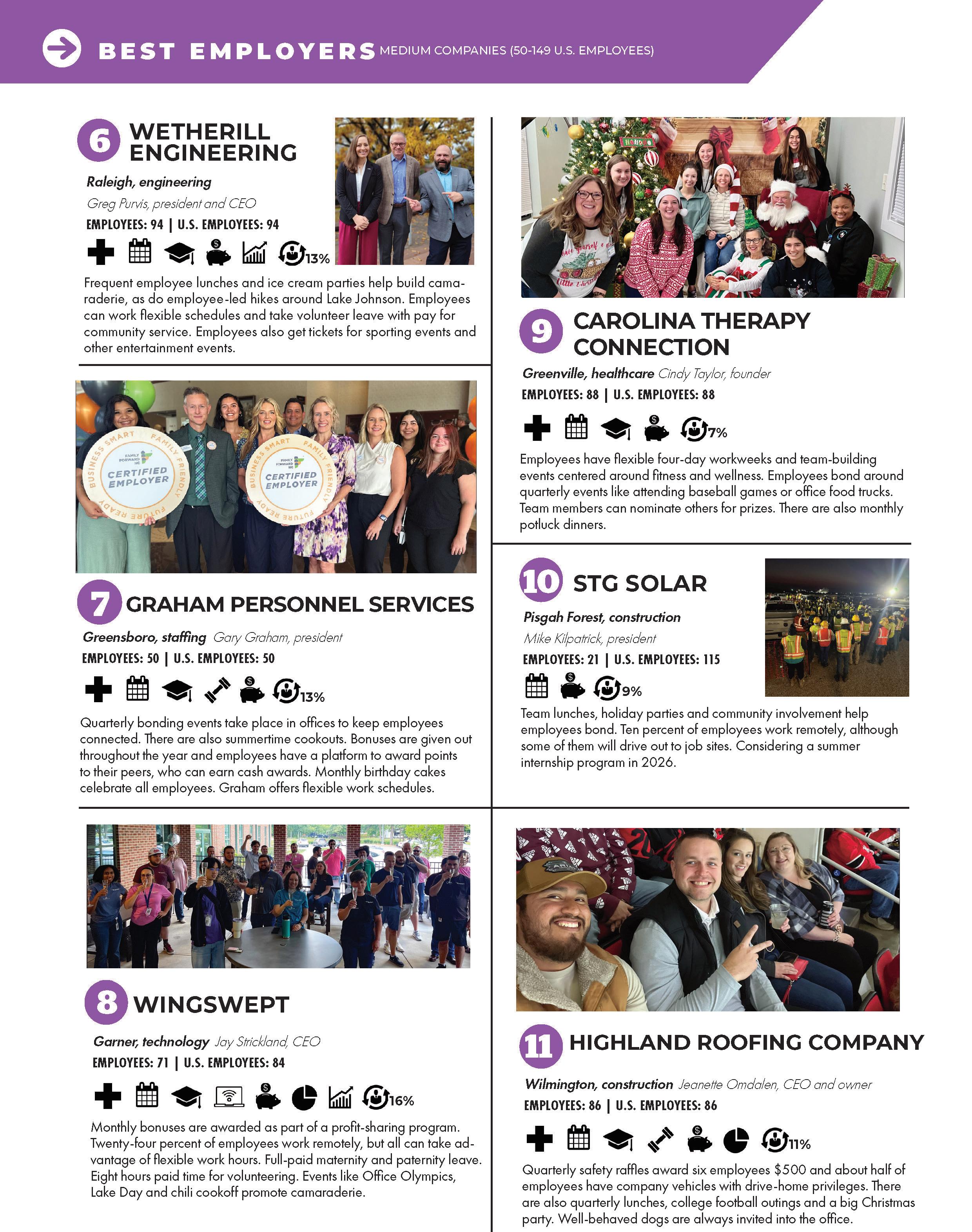


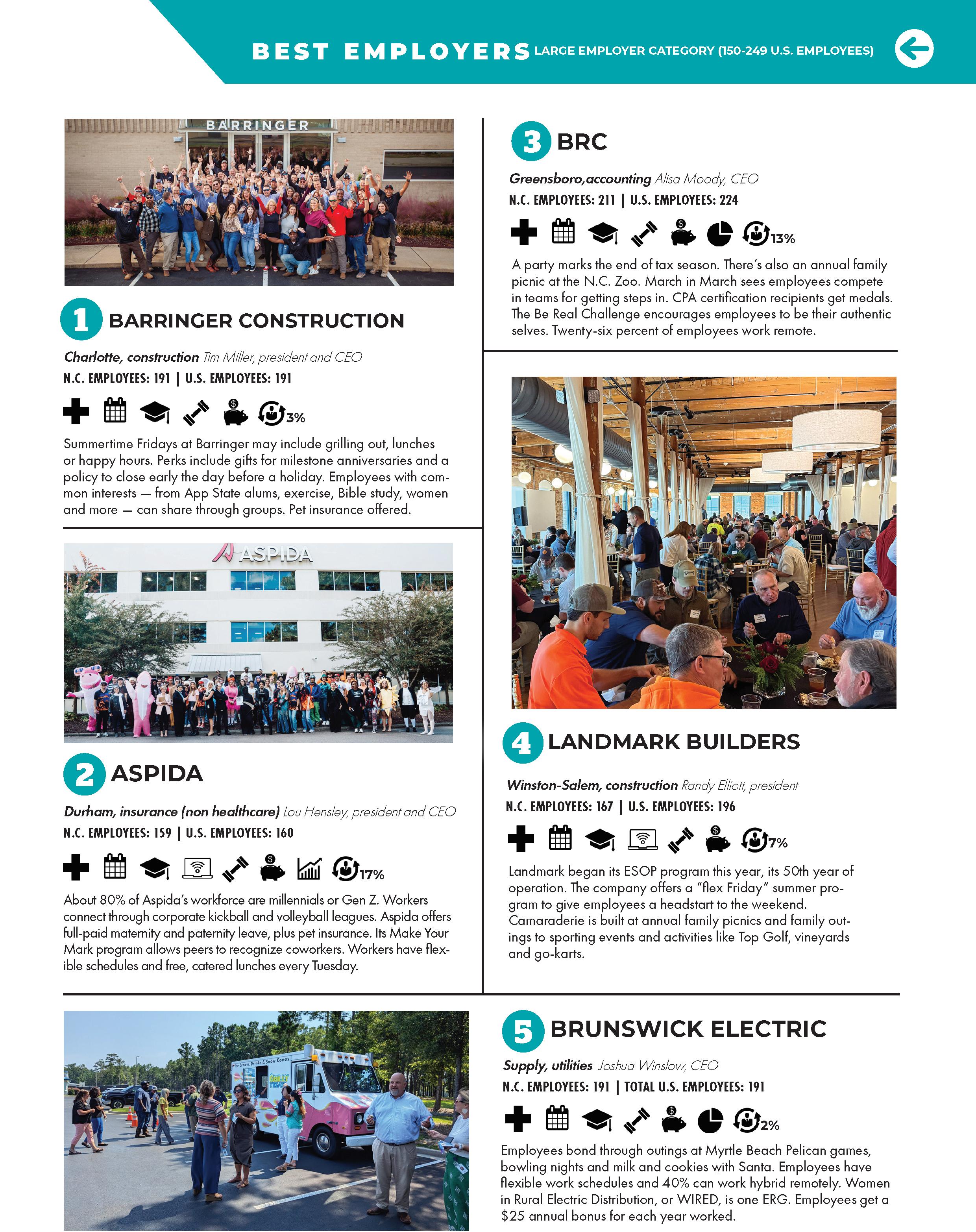
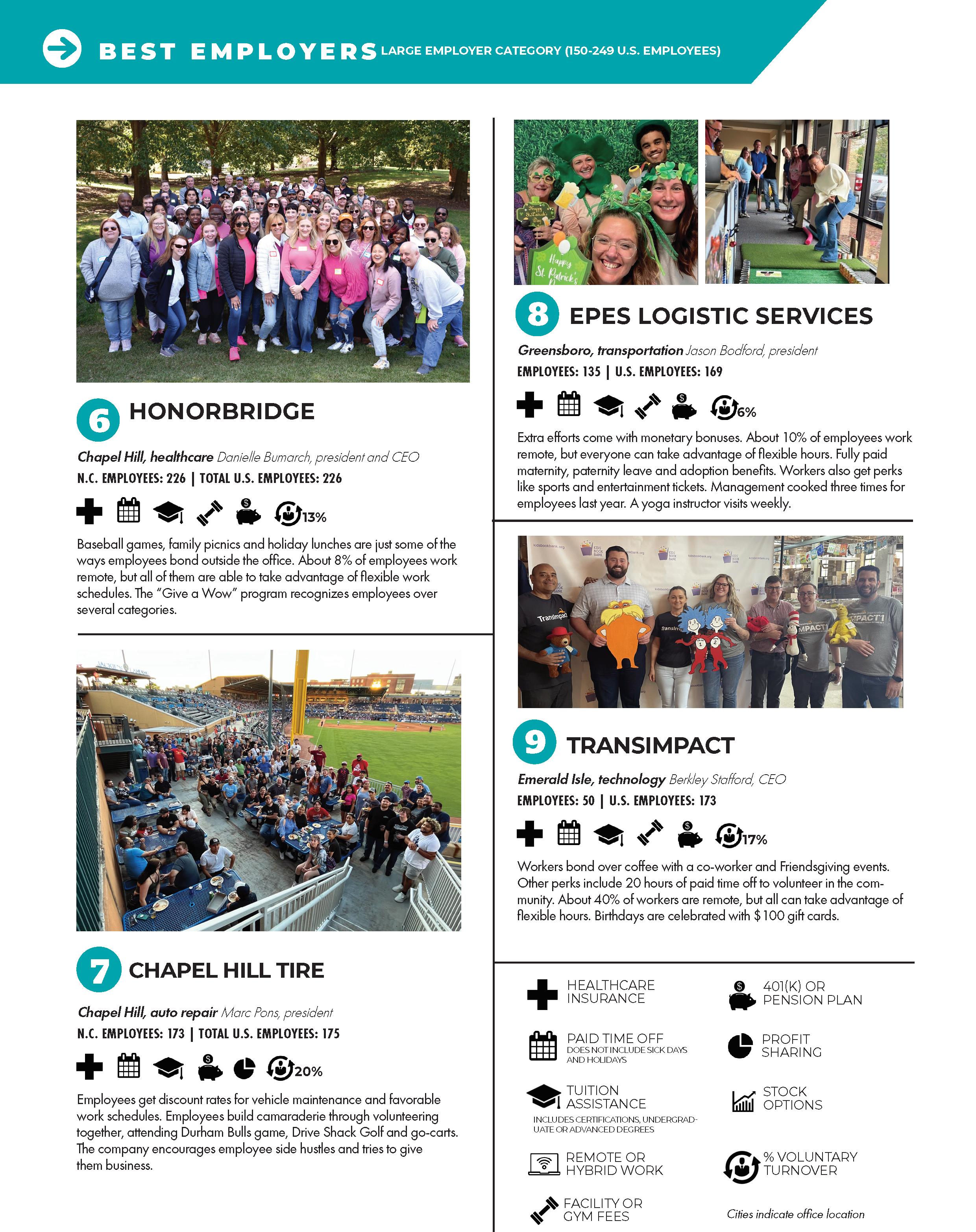
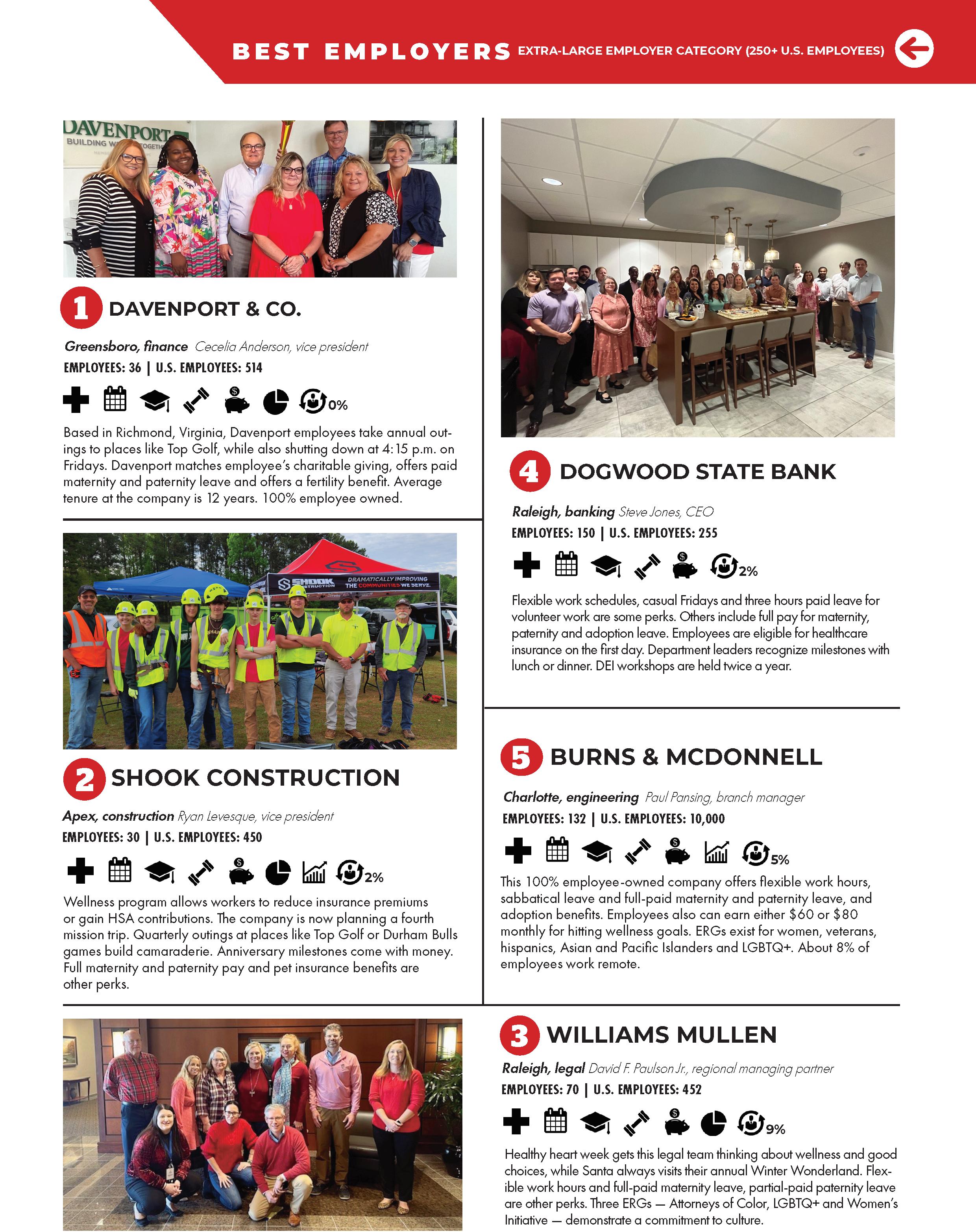
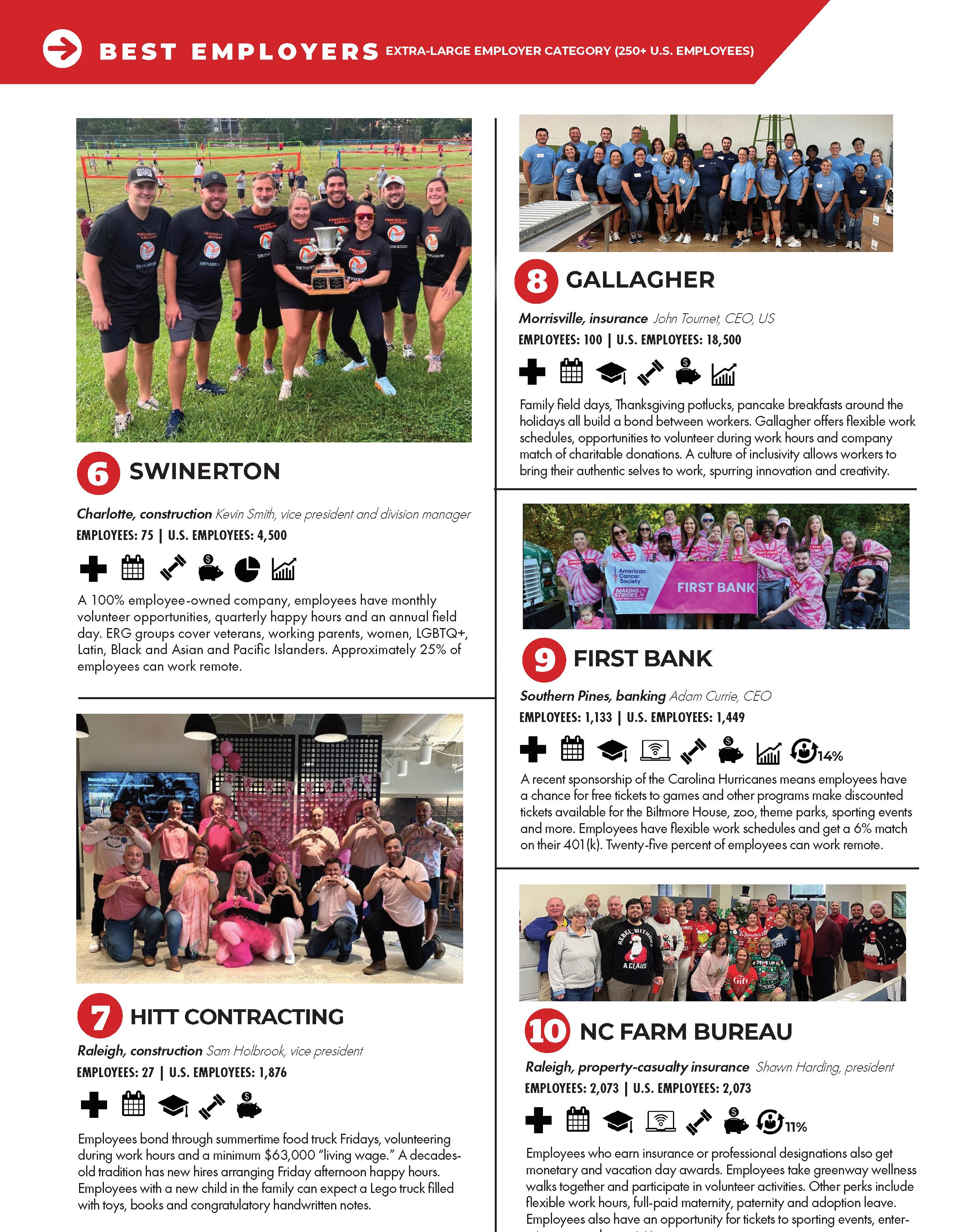

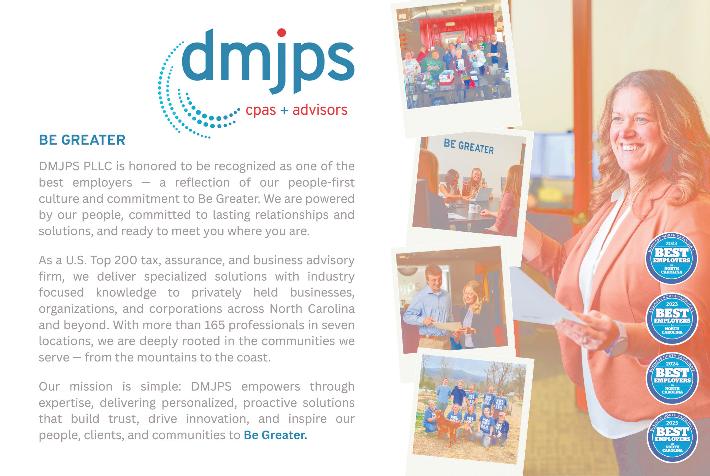
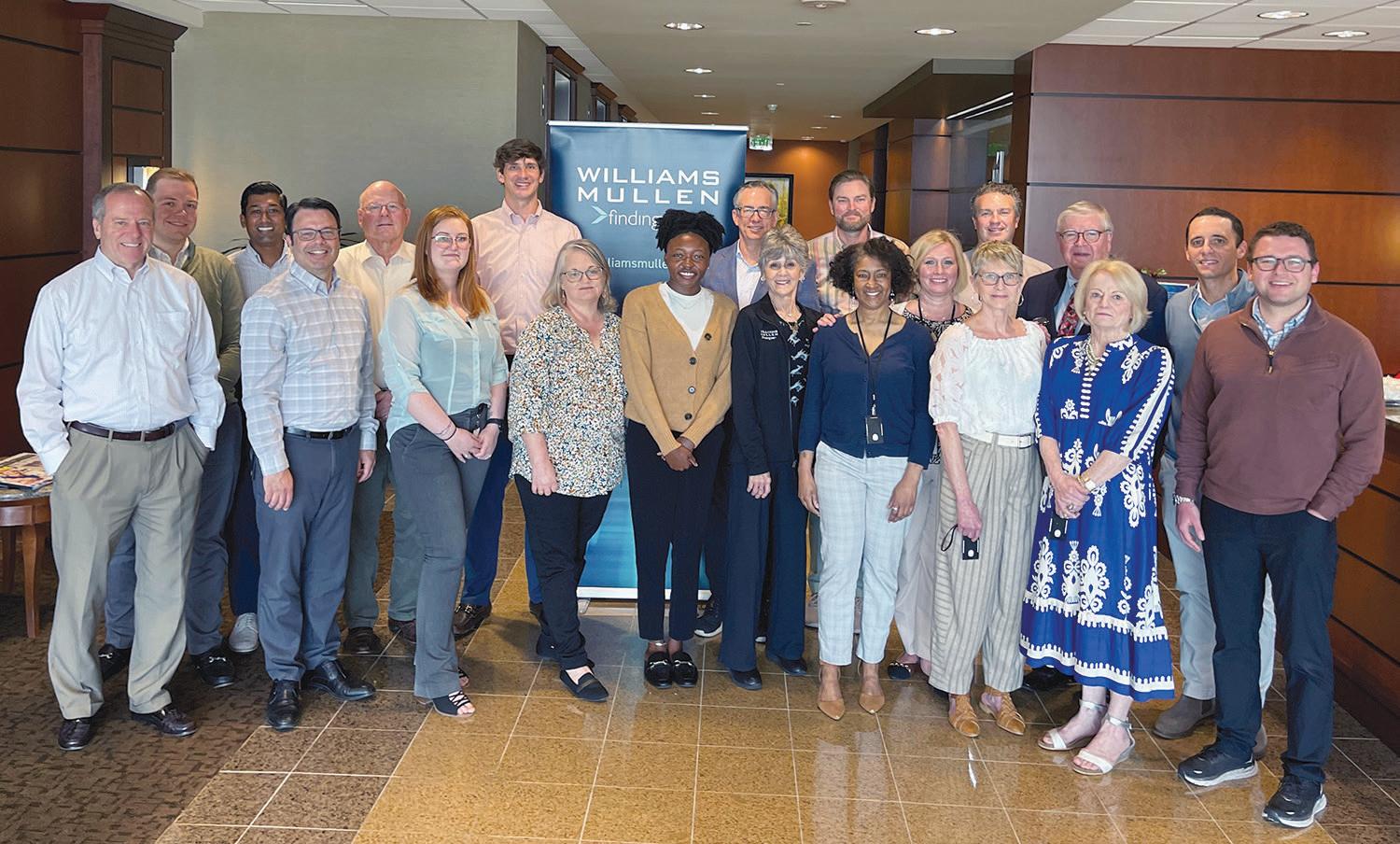

LEARN, GROW, AND FIND YOUR OWN YES
Williams Mullen is a business law firm with 450 employees in offices across North Carolina, South Carolina and Virginia. Our clients’ success is at the forefront of what we do, and we are proud to have a strong team of attorneys and staff committed to providing exceptional client service. We know that Williams Mullen only succeeds when we foster an inclusive environment where our team feels supported, can contribute meaningfully and be their authentic selves. We offer our employees opportunities to learn, grow and find their own yes.
We celebrate the inclusion in Business North Carolina’s Best Employers.
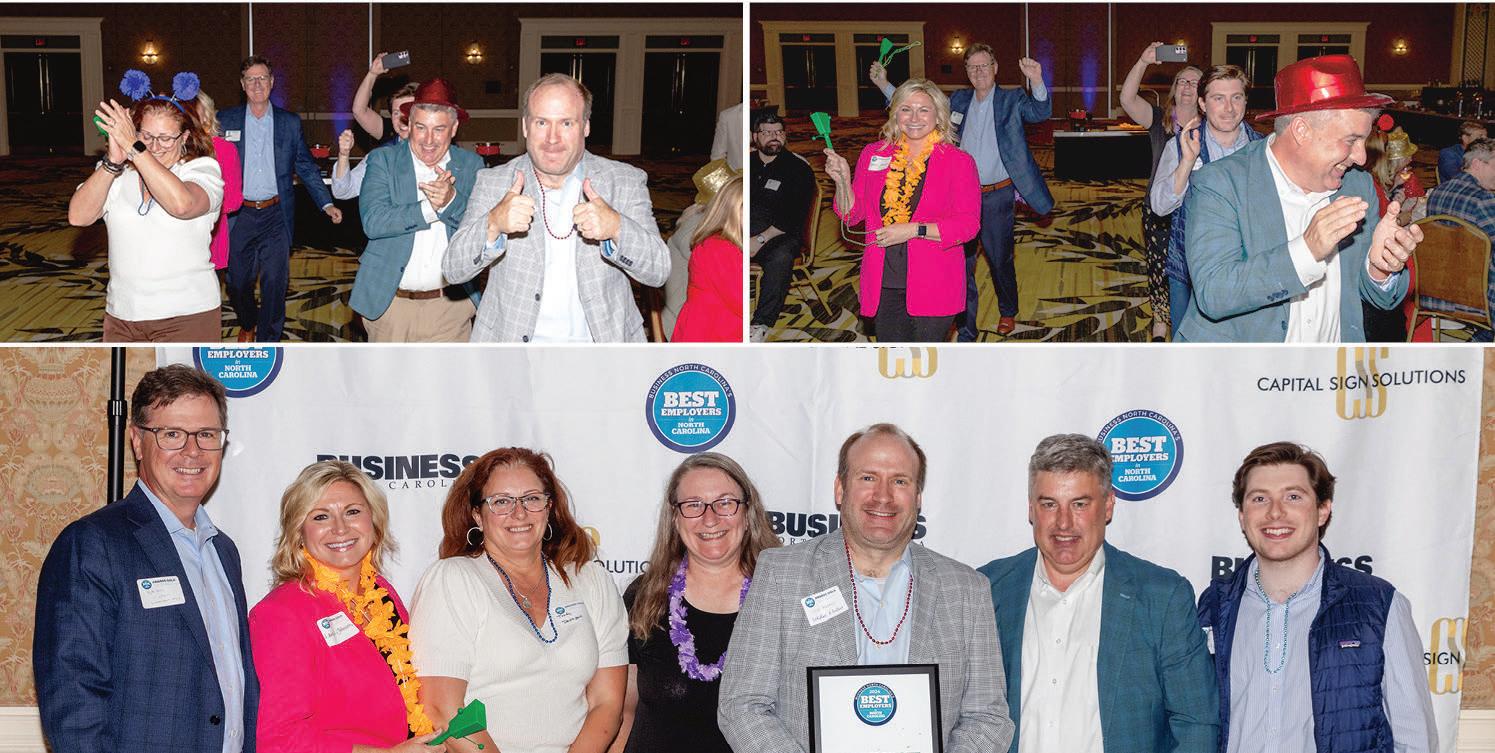
Davenport & Company is proud to be included on Business North Carolina Magazine’s 2025 Best Employers in North Carolina list. At Davenport, we believe that wealth management is timeless. Opportunities arise, trends change, and technologies evolve— but the fundamentals of investment research and management remain. With an emphasis on building wealth together, our financial advice and personal service are the foundation of our success with individuals and institutions across generations.
Davenport is an independent, employee-owned firm, founded in Richmond, Virginia in 1863. Since our founding, we have experienced nearly every kind of financial market and we have learned the importance of balancing stability and innovation in a dynamic environment. We recognize that there is more to our business than delivering high-quality financial services; it is about building meaningful relationships. Our more than 450+ associates, across four states, maintain a discipline of putting our clients’ needs
ahead of our own and delivering products and services that meet their goals.
We offer a comprehensive set of resources including financial and retirement planning, asset management, stock and bond brokerage, research, public finance, and corporate finance. Our boutique money management division, Davenport Asset Management, has emphasized long-term investing across a variety of disciplines in separately managed accounts for more than 30 years, and offers six publicly available mutual funds, recognized in the New York Times and Wall Street Journal.
We are committed to the communities in which we live and work. Davenport Shares, our employee-run philanthropic initiative, actively supports local organizations and dedicates company time and resources to projects that enhance the vibrancy and quality of life in our communities.
Member: NYSE | FINRA | SIPC
Charlotte - Public Finance Office 101 N. Tryon Street, Suite 1220
Charlotte, NC 28246 Phone: (704) 375-0550
Durham 2828 Pickett Road, Suite 280
Durham, NC 27705 Phone: (919) 321-9500
Greensboro
628 Green Valley Road, Suite 306
Greensboro, NC 27408 Phone: (336) 297-2800
Raleigh
3605 Glenwood Avenue, Suite 310
Raleigh, NC 27612 Phone: (919) 571-6550
Sanford 201 Chatham Street, Suite 1
Sanford, NC 27330
Phone: (919) 777-9823
Abingdon • Charlottesville • Danville
Farmville • Franklin • Fredericksburg
Harrisonburg • Kilmarnock • Lynchburg
Marion • Newport News • Norfolk
Richmond • Roanoke • Staunton • Suffolk
Virginia Beach • Williamsburg
Public Finance services offered in Atlanta, GA; Leesburg, VA; Towson, MD



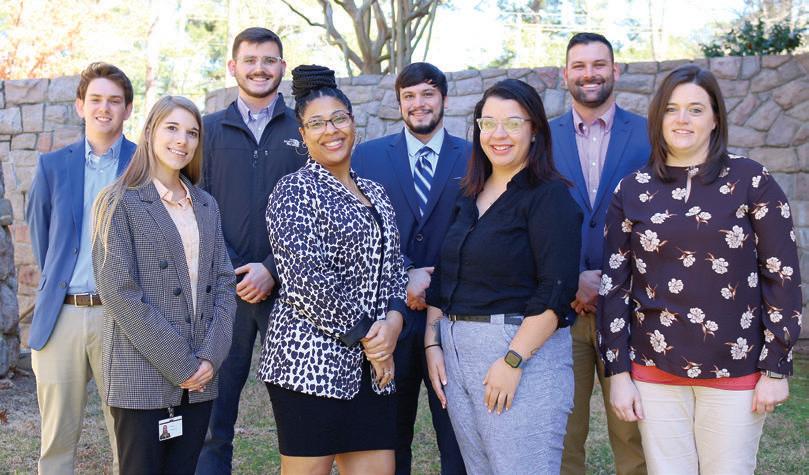
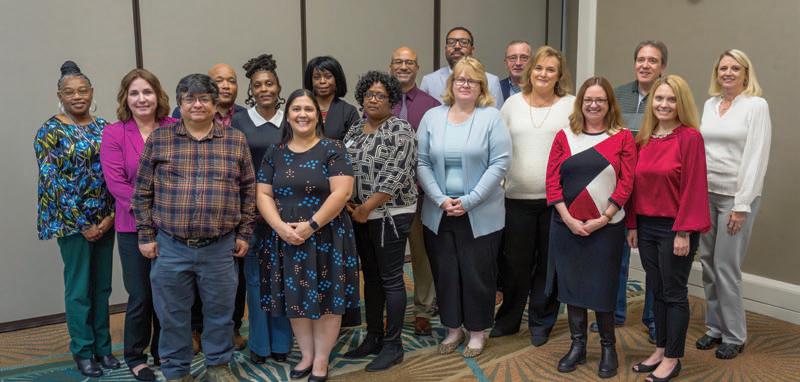
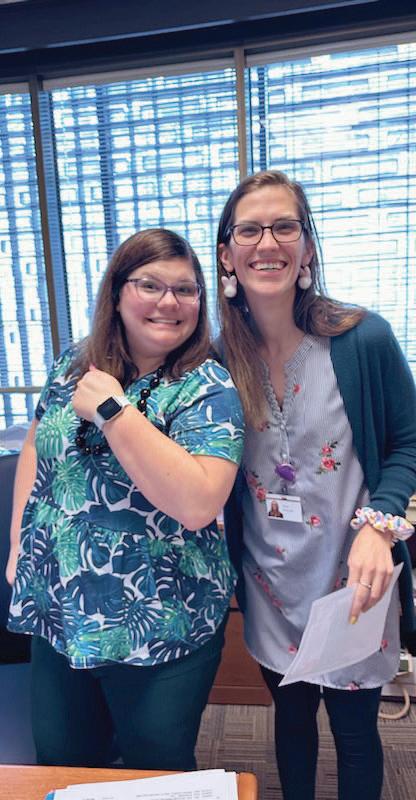
Thank you, Business North Carolina, for recognizing North Carolina Farm Bureau as one of North Carolina’s Best Employers 2025! From our headquarters in Raleigh to our offices in all 100 counties, our employees are our best asset, faithful to our dedication to serving the needs of members with honesty and care.
In 1953, North Carolina Farm Bureau Insurance Company was formed to provide insurance to North Carolina farmers and rural communities, and today we proudly operate offices in all 100 counties, serving customers statewide. While our roots were in farm insurance, today we are one of the largest providers of home and auto insurance in North Carolina, and we annually rank among the very best insurance companies in the nation for customer satisfaction. Relationship-building and support is the driving force behind North Carolina Farm Bureau Insurance Company, which stands by three principles and commitments that have served as an inspiration and model for leadership and management:
-We strive to provide reasonably priced products tailored to meet the needs of North Carolina Farm Bureau members.
- We choose to deliver our products through local service, administered with care and concern by our agency force and employees.
-Our mission is to manage our company to achieve planned growth with a focus on financial strength and stability.
In 2026, North Carolina Farm Bureau Federation will celebrate 90 years since it was founded in Pitt County. North Carolina Farm Bureau Federation was formed in 1936 as a non-profit general farm organization to serve farmers and provide a unified voice for the interests and needs of the farming community. Today, North Carolina Farm Bureau stands as the Voice of Agriculture in North Carolina and serves as an advocate for our members at the local, state, national, and international levels –providing educational, economic, public affairs, marketing, and various other services to our members. Over
the years, North Carolina Farm Bureau Federation has grown into the largest general farm organization in the state with more than 600,000 member families, yet we remain true to our grassroots heritage and steadfast in our mission to advocate for farm and rural families
Please visit ncfbins.com to learn more about North Carolina Farm Bureau Mutual Insurance Company and ncfb.org to learn more about North Carolina Farm Bureau Federation.






For 50 years, Landmark Builders has proudly served the Southeast as one of the region’s most respected commercial general contractors. Headquartered in WinstonSalem, N.C., with three additional offices across the Carolinas, Landmark delivers tailored construction solutions from groundup construction to complex renovations. Our employees have shaped our success, and the launch of our Employee Stock Ownership Plan (ESOP) reflects our commitment to them. With a strong culture and a legacy built on integrity, service, and dependability, Landmark is the partner you can trust to build with confidence.
To our dedicated employees—thank you for being the foundation of it all.

At IIANC, we foster a culture where employees thrive. As the strategic partner to nearly 1,000 independent insurance agencies across North Carolina, we prioritize work-life balance with flexible schedules, remote options, and outstanding benefits. Our in-office tranquility room, wellness initiatives, and teambuilding events create a supportive and engaging workplace.
At the heart of our success is a strong, values-driven culture. IIANC has six core values that guide everything we do, from how we interact as teammates to how we serve our members and make key business decisions: Act with Integrity, Demonstrate Professionalism, Pursue Innovation, Foster Collaboration, Take the Initiative, and Be Responsive. These principles shape a unified, purpose-driven team committed to making a meaningful impact.
Our InsurAcademy program is a game-changer in workforce
development, designed to attract and train new talent for the insurance industry. This innovative initiative offers a fast-track, intensive learning experience that prepares individuals for successful careers in independent agencies throughout North Carolina. InsurAcademy’s success has led to its expansion into other states, serving as a national model for solving the industry’s talent crisis and creating new career pathways.
101 Weston Labs, our national insurtech accelerator launched in 2023, continues to drive industry innovation and shape the future of independent insurance. It has welcomed numerous forwardthinking entrepreneurs in their effort to build scalable insurtech startups focused on enhancing independent agencies. The program has earned national recognition and attracted interest and investments from companies nationwide.
IIANC is proud to lead the nation with our investments in cutting-
edge technology, equipping our team and member agencies with the tools and platforms needed to stay competitive in a rapidly evolving digital landscape. From internal systems that streamline operations to member-facing tools that drive efficiency and growth, our commitment to innovation keeps us, and those we serve, at the forefront of the industry.
Our team embraces IIANC’s vision: leading independent agencies into a prosperous future by fostering change and providing forwardthinking solutions. Passionate about helping agents succeed, our employees find real fulfillment in their roles. We invest in professional development, mentorship, and industry events, ensuring continuous growth and connection.

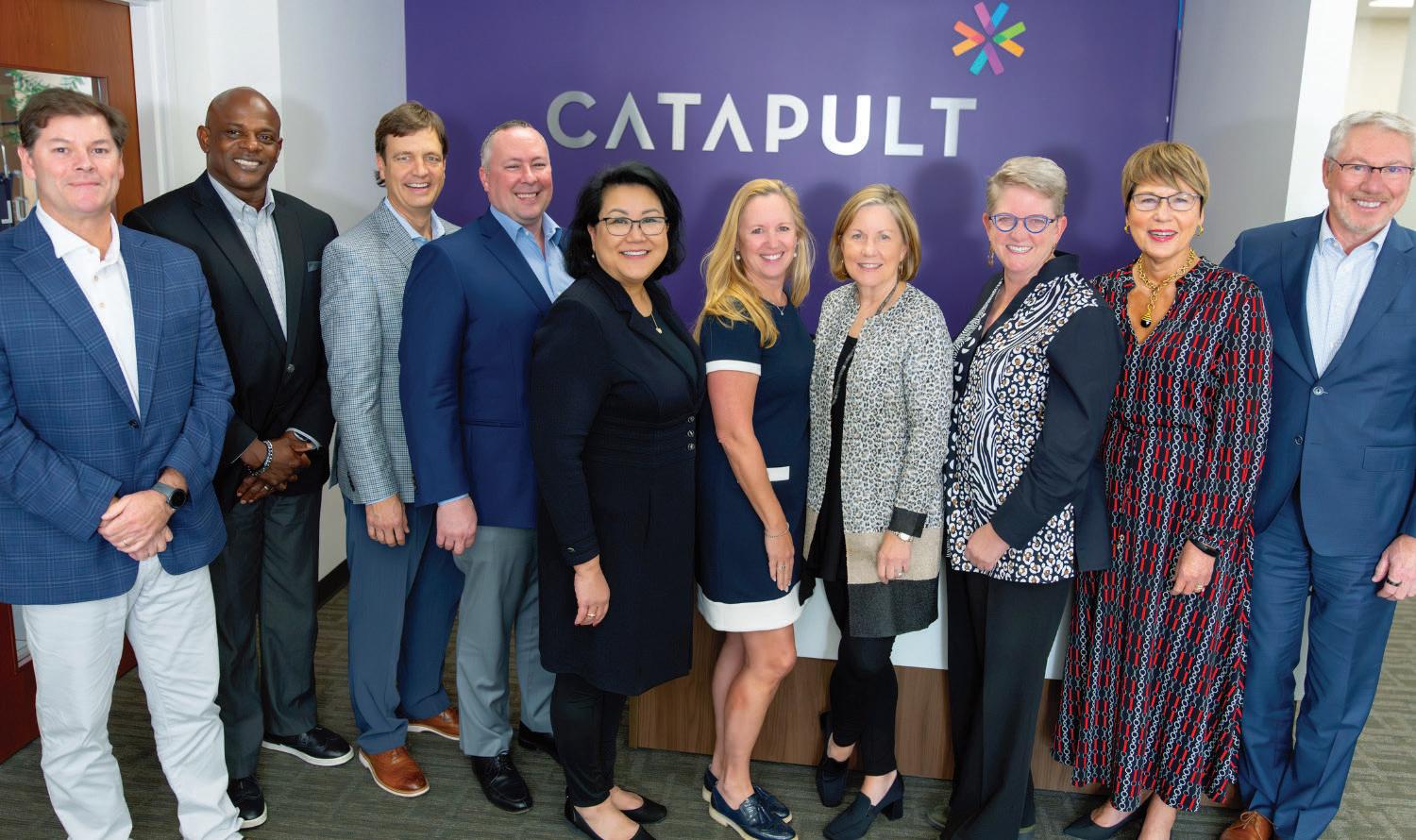
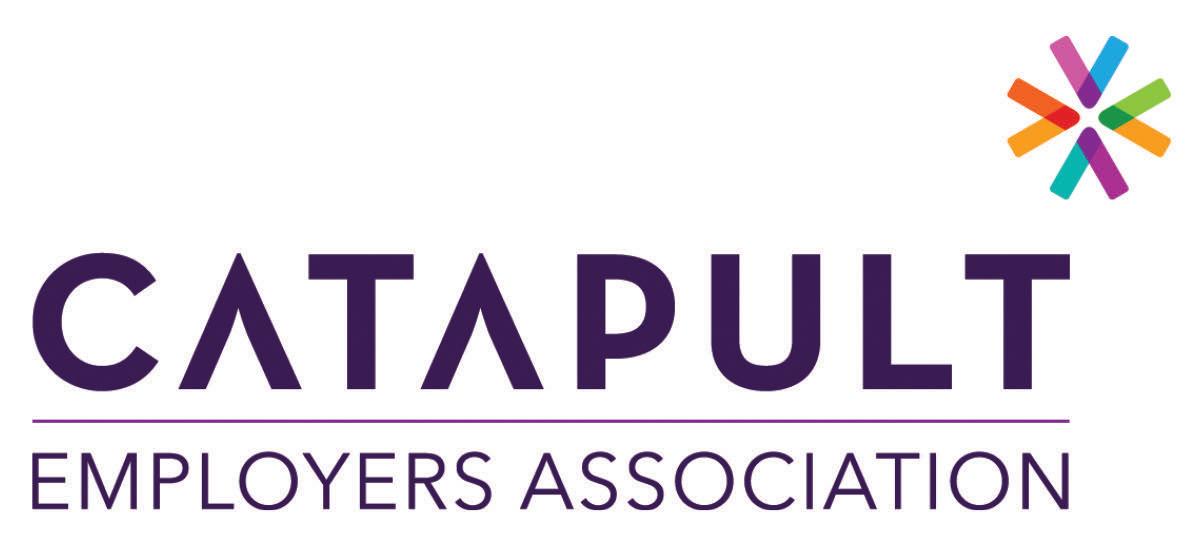












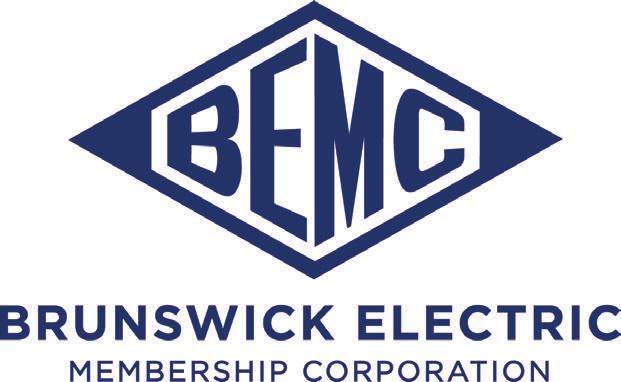



At Catapult, we help you lead with confidence through membership or project-based HR support. With over 65 years as a trusted nonprofit employer association, a team of 50+ seasoned HR professionals and attorneys, and serving a community of more than 2,000 employers, we provide the tools, data, and practical advice you need to strengthen teams, engage employees, and drive real change. Access expert guidance, legal advice, leadership training, and workforce solutions—all from a team who genuinely cares. Learn more about services designed to fit your unique needs and partner with Catapult in the way that works best for your organization.
Since 1939, Brunswick Electric has proudly delivered safe, reliable, and affordable energy to homes, schools, farms, and businesses across our region. Growing with our community, we’ve connected over 110,000 accounts while staying true to our commitment to enriching the lives of those we serve. We extend a heartfelt thank you to our dedicated employees for making Brunswick Electric a top North Carolina employer for the third consecutive year!

Barringer Construction is a Carolinasbased general contractor founded on a shared desire to revive a diminishing approach to construction services: one where handshakes hold great value, people are put first, and the act

of building is revered as a craft, not a commodity. 14 years, 3 offices, 1 alpaca (RIP Larry) and hundreds of iconic projects across the Carolinas later, it’s not just our client-centered approach and high-quality craftsmanship that set


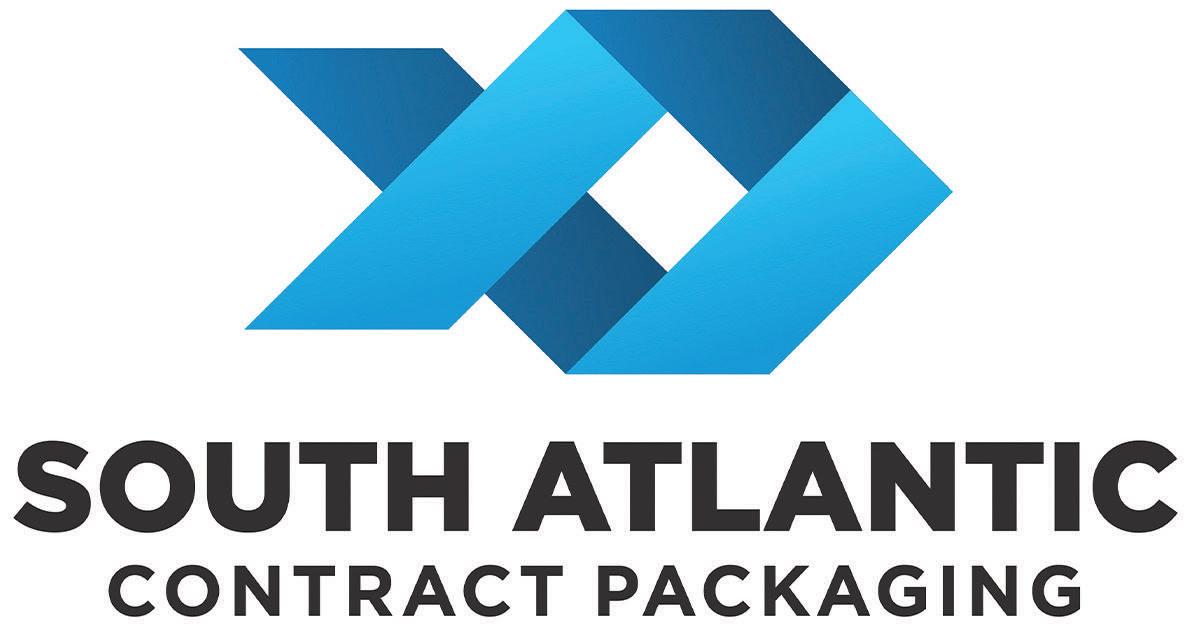
us apart – it’s our team of unique and fun-loving leaders, problem solvers and creative thinkers who are dedicated to creating exceptional experiences centered around our customers, our communities and each other.
South Atlantic Packaging, headquartered in Winston-Salem, is honored to be included in Business North Carolina’s Best Employers in North Carolina. We specialize in getting products boxed, bagged, bundled and ready for retail for our customers that include leading national brands. With our core operations staff and leadership team based right here in North Carolina, our organization includes five standalone facilities, seven embedded operations and hundreds of team members working in Pennsylvania, Florida, Indiana and Texas, as well as our Winston-Salem site. We believe wholeheartedly that our people are the key to our organizational success and our mission to be America’s Go-To Contract Packager!
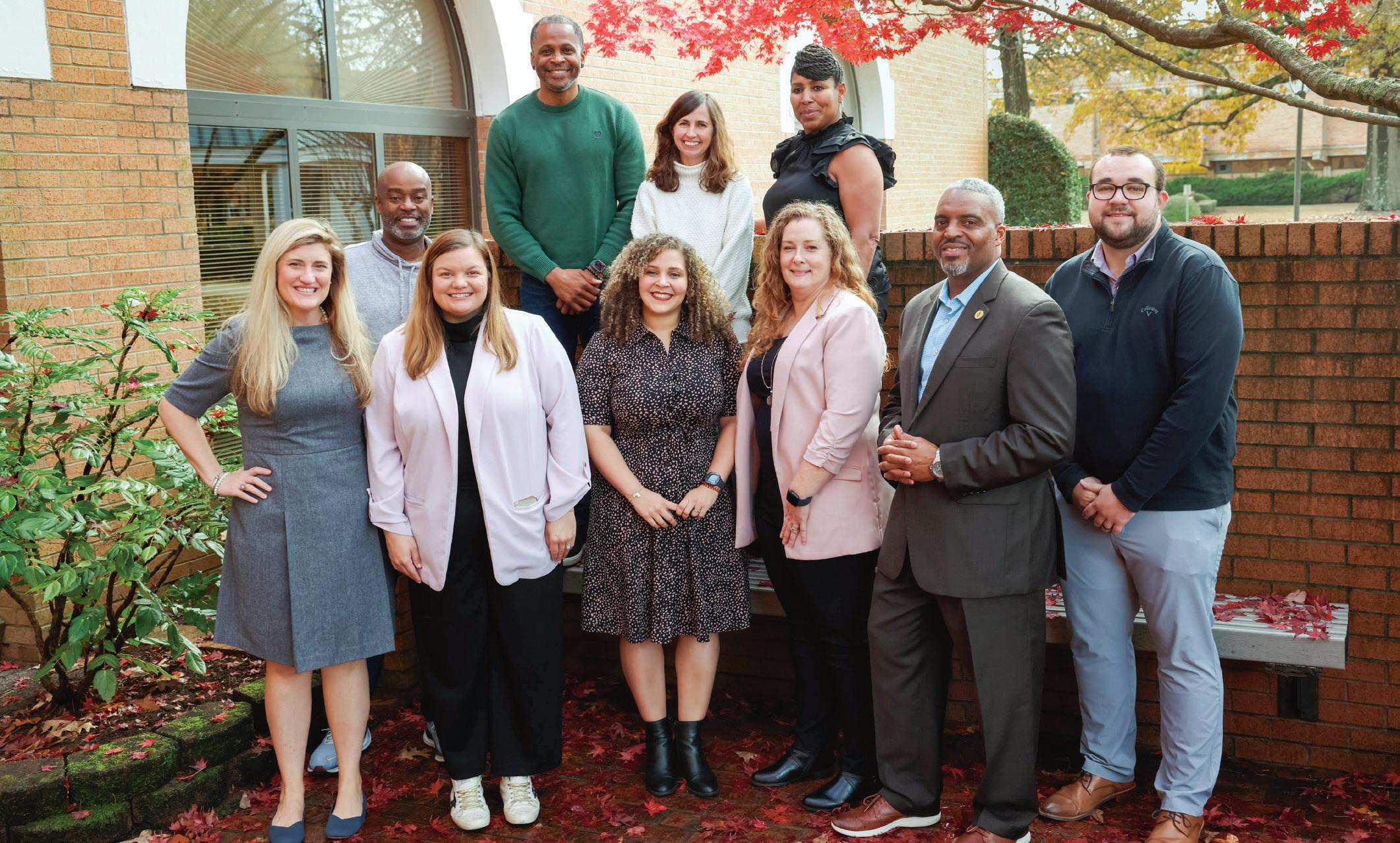
Carolina Small Business Development Fund (CSBDF) is a statewide 501(c) (3) nonprofit certified Community Development Financial Institution (CDFI) that works to create economic opportunity for all. CSBDF’s mission is to foster economic development in underserved communities by providing capital, technical assistance, and policy research to light the way for small businesses. As a small business partner, advocate, trusted guide, and accessible funding resource, CSBDF empowers entrepreneurs throughout the life cycle of their business. Since 2010, CSBDF has issued more than

$120 million in small business capital through more than 3,100 loans and grants, helping to create or retain more than 5,300 full-time employees while delivering technical assistance to more than 6,000 unique firms.
In addition to its normal lending and research activities, CSBDF has three special programs designed to assist entrepreneurs in unique ways.
The Western Women’s Business Center (WWBC) meets the needs of entrepreneurs in a 22-county region of Western North Carolina through one-on-one business coaching, workshops, and access to capital.
The WWBC team of experts offers support on a range of topics small businesses need to start and grow. Vivid Digital Classroom lights the way for entrepreneurs by providing technical assistance through free online courses designed to help small
business owners start, support, and grow their businesses. Vivid offers digital classes on a variety of small business topics in both English and Spanish, delivered by industry experts to help entrepreneurs achieve small business success. Programa Empresarial Latino addresses the specific structural challenges Latino entrepreneurs and small business owners experience when starting or growing their business, providing bilingual, comprehensive financial counseling and technical assistance.
CSBDF serves all 100 counties in North Carolina with Business Solutions Officers stationed throughout the state to help provide technical assistance and lending services to all NC entrepreneurs. CSBDF is headquartered at its main office in Raleigh, with offices also located in Asheville and Charlotte.
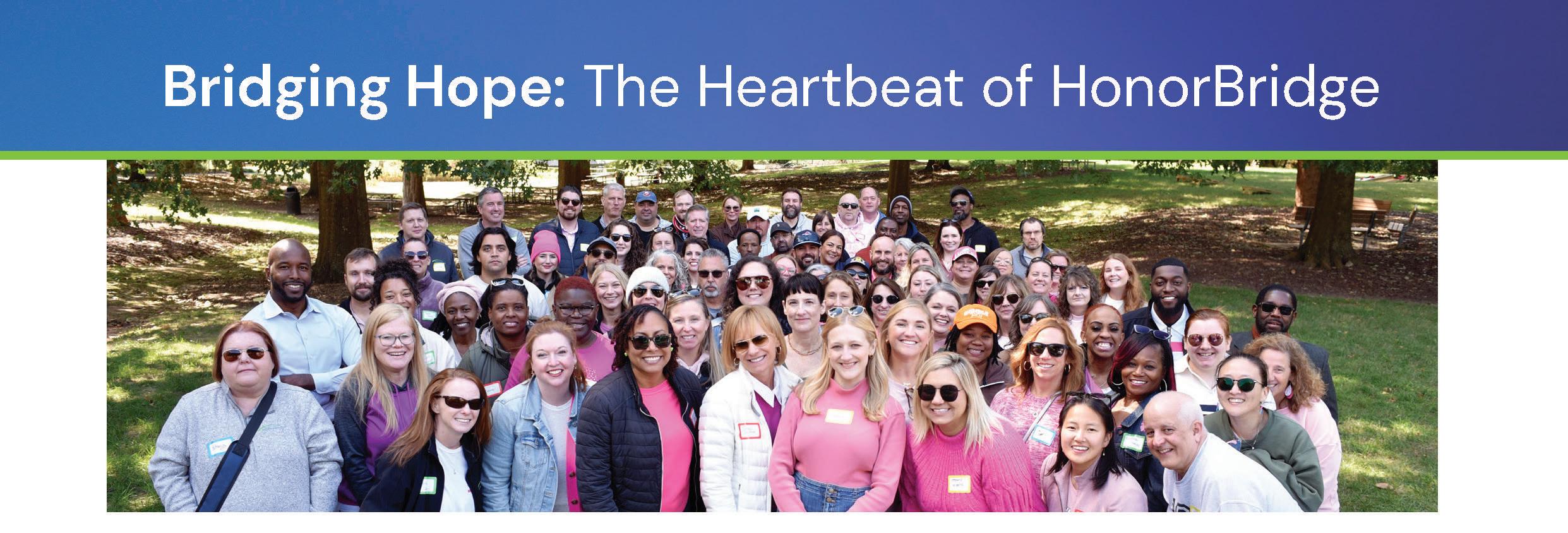

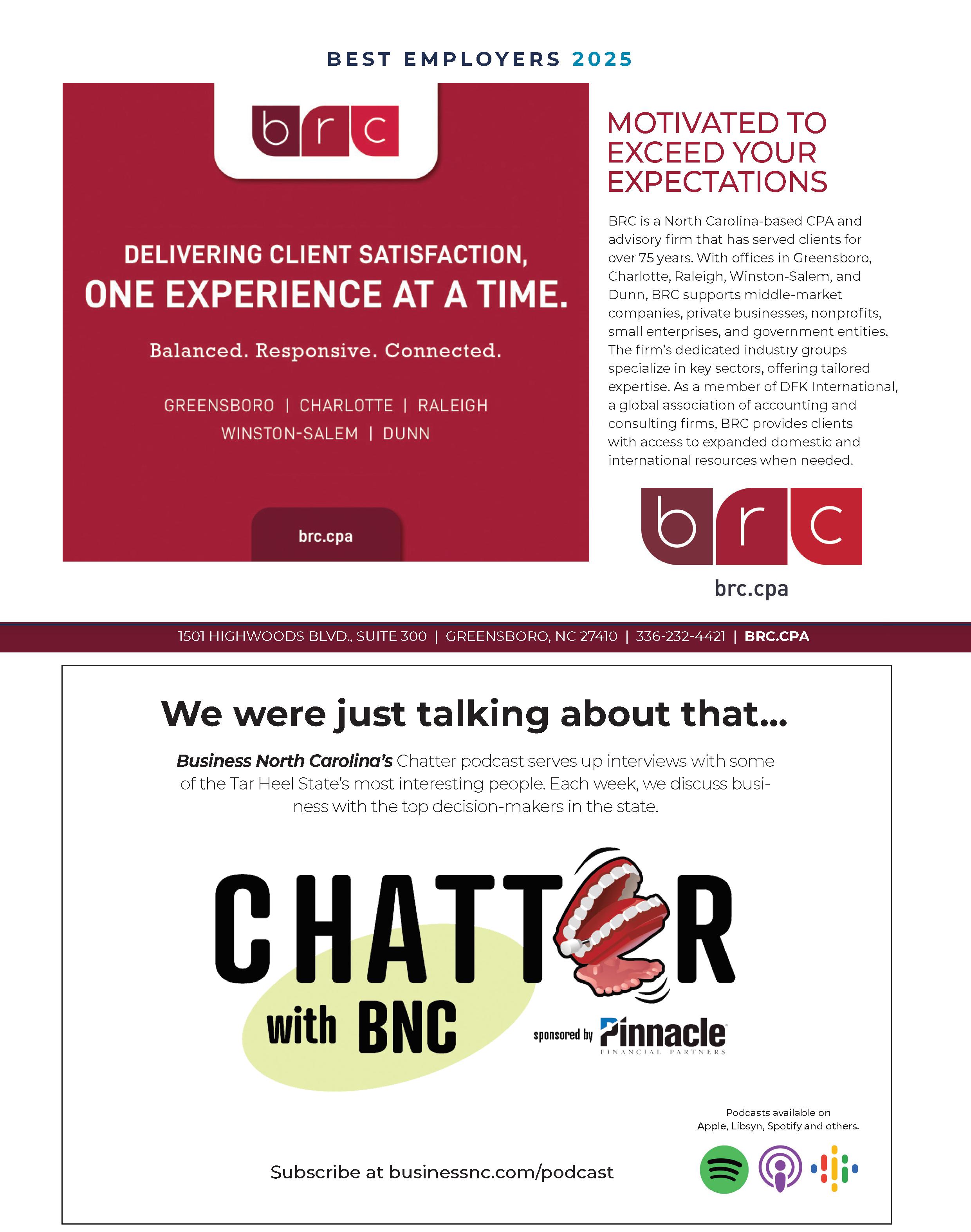



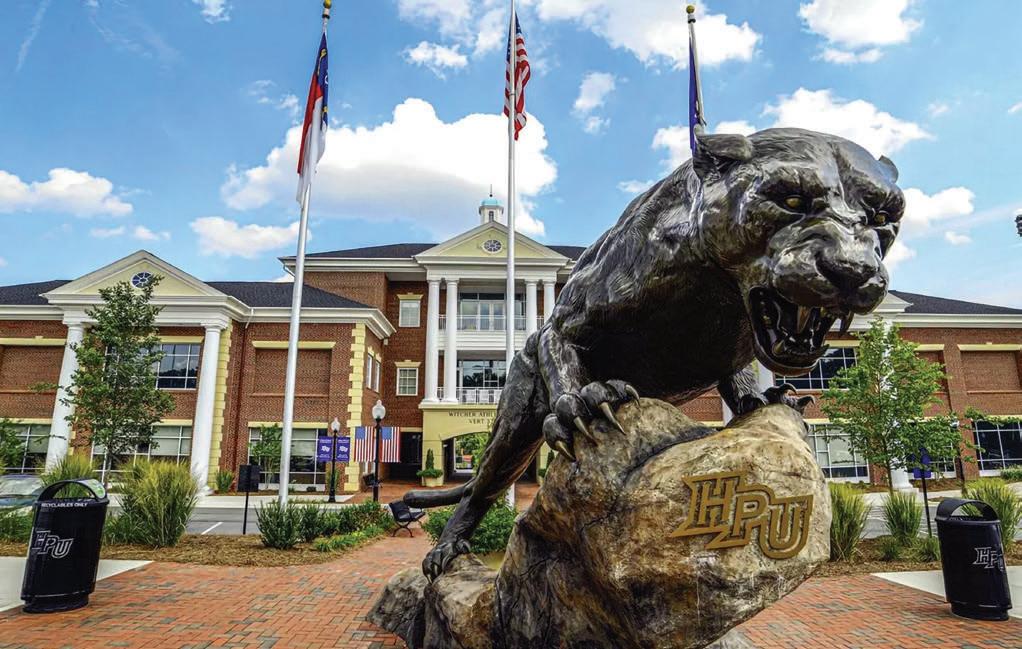


prompted High Point University to put his name on an athletic center for its lacrosse and soccer teams. It opened 2014.

Smart Choice’s Doug Witcher toiled to make millions in the insurance industry. Now he’s working just as hard to give it away.

By Tucker Mitchell

Photography by Christer Berg
Doug Witcher, the founder of the High Point-based insurance services company Smart Choice, is an intensely focused person who chops through the noise to get to the bottom line. It’s how he overcame modest beginnings, a severe learning disability, and an entrenched industry to build one of America’s largest insurance networks.
Today, Smart Choice is a major force in the industry, with more than 10,600 independent agents in its national network. Total billings last year topped $2.4 billion and revenue topped $200 million.
Lately, Witcher’s attention has been directed toward giving away lots of his money. In the past year, he has donated nearly $50 million, by his accounting, to a variety of nonpro ts.
“It’s been great,” the 71-year-old Witcher.“I wake up every morning and it’s all crystal clear, right there in front of me. Here is my purpose in life, God’s plan for me, I think. I’m supposed to give away all this money to good causes. And so that’s what I’m doing.”

Witcher’s philanthropy is funnelled through the 3-year-old Witcher Family Foundation. e gifts have the idiosyncratic feel of a closely held family fund. Most recipients are connected to the High Point-Jamestown area in southwestern Guilford County where Witcher grew up, and still spends most of his time. e foundation gave $2 million to the fundraising campaign for the Women’s Center at Atrium Wake Forest’s High Point hospital; $1 million to the High Point Police Foundation; $1 million to the United Way of Greater High Point; $600,000 to the Communities in Schools of Guilford County; $500,000 to the e Art Gallery at High Point’s Congdon Yards; and six- gure donations to a slew of smaller High Point charities.
Witcher also made the $4 million lead gift toward a new gymnasium at the Caldwell Academy, a private school in Greensboro where his teenage daughter is a student. (He has two sons from a previous marriage.) He gave $50,000 to a small private school on Bald Head Island, North Carolina, because


“I’ve always liked Bald Head.” He gave $1 million to Lees-McRae College, where President Lee King is a friend. Witcher owns a mountaintop home at the Elk River Club near the college.
e Lees-McRae gift did not go unnoticed closer to home. He`s given about $20 million to his alma mater, High Point University. “ at money you gave to Lees-McRae. that will not get you into heaven,” HPU President Nido Qubein told Witcher.
“He (Qubein) said that at an (HPU) board of trustees meeting,” says Witcher with a smile. “I think he was kidding, but … maybe not.”
HPU’s School of Humanities and Behavioral Sciences is now named after him. Across campus, the Witcher Athletic Center houses the university’s lacrosse and soccer teams.
Qubein calls Witcher an “uncommonly joyful donor.”
“You know, it’s easy to say, ‘Oh he gave $20 million to HPU,’










“ Here is my purpose in life, God’s plan for me, I think. I’m supposed to give away all this money to good causes.”


Doug Witcher
or ‘He gave a million to United Way,’” says Qubein. “ at does not describe Doug Witcher. I think it is slightly misunderstood, maybe more than slightly. You see, it all lies inside his heart.
He’s not trying to impress anyone. He does it voluntarily, not asking anything in return. He did not ask us to name a school. He’s given a lot of money with nothing in return. He’s a willing giver who wants to do good things in his community.”
Witcher con rms that he did not ask to have a building at HPU named after him. But he’s happy about it, all the same.
“I mean, you don’t want to do that and be dead,” says Witcher. “You want to see it! at’s why I wanted to get started, why we started the buyout (of Smart Choice, which sold a minority share to an investor in 2023). e big thing here was to get some money into the foundation. I mean, that’s kind of critical. You have to have some money to give away before you can really give it away like this.” anks to Smart Choice, Witcher has some money.






Smart Choice is becoming increasingly pro table, o cials say. Pretax pro t increased to $30 million this year and is projected to top $60 million in 2026. “We’re just producing more with the business we have, and we continue to add agents to the network,” says Caldwell. “We’re in a pretty good place.”




Smart Choice, which Witcher founded in 1994, is a simple concept. A bunch of insurance agents form a network to create the buying power and leverage needed to deal e ectively with large insurance carriers. Witcher wasn’t the rst person to come up with that idea, but he has been one of the most successful in executing it.









In 1994, Witcher launched Smart Choice with 13 agents, each based in the Carolinas. It now has 160 employees, including agents covering cars, boats, homes and many other products in 48 states. It brings in about 1,400 new agents into the network each year, says Andrew Caldwell, who succeeded Witcher as Smart Choice’s CEO in April after a decade as president. e roster of agents has nearly tripled over the pasr decade.


e network’s total billing is more than $12 billion, but Caldwell says the more relevant number is $2.4 billion. at’s the additional business written through Smart Choice’s network program, on top of existing policies. e company represents 120 carriers across nearly every possible insurance line.
Some growth is driven by the acquisition of 36 independent agencies since 2019. It also buys stakes in agencies, which can assist ownership in developing an exit strategy, a common problem for agency owners. Smart Choice also provides agencies with a bu et of support services, which can help agents, and agency owners, grow their businesses in di erent ways. For instance, Smart Choice helped Lee Ann Pridgeon, a Charlotte-area agency owner, grow by brokering her purchase of three other agencies in the Smart Choice network who were looking for a way out.
Smart Choice’s pro tability and growing scale began attracting attention from suitors about a decade ago. Caldwell says the company kept them at bay until approached by Pelican Capital Management of West Palm Beach, Florida, several years ago. After a courtship period, the investment company acquired a minority ownership in Smart Choice in 2023. Pelican’s stake grows monthly as it purchases shares from Witcher at prices based on its earnings before taxes, interest and other factors.
If things go as planned, Pelican will eventually own the company, says Witcher. Now chairman of the company’s board, he declined to share more details on the ownership transaction.
Witcher isn’t Horatio Alger, but he’s close enough.
His father owned a small High Point landscaping company, and if Witcher didn’t grow up in poverty he could “see it from where I lived,” a line Witcher employs regularly during speeches and conversations. Hard work and dogged determination helped him overcome an undiagnosed case of dyslexia. It was often missed during his youth. A college professor at High Point suggested he try copying textbooks into a spiral notebook to learn the material and improve his reading skills. She probably meant it as a temporary learning tool, but Witcher took her literally and hand-copied more than 50 books during his college career.
Armed with an education degree and some athletic skills, Witcher was set to begin a career teaching and coaching in the Guilford County public schools. That changed when family friend Jay Woods, a long-time High Point Realtor, suggested he give real estate a chance.
“But Jay, I’ve already got a (teaching) job plus a coaching supplement,” Witcher protested. “’I’ll be making $8,000 a year. Why would I want to pass that up?”
Woods told Witcher he “might do a little better than that in real estate.”
He tried it, joining Woods for a year, and he did better. Most importantly, he made some friends in the related insurance industry. The industry that Witcher entered in the late 1970s was the epitome of the “good ol’ boy” system.
Insurance carriers capped the number of agents who could sell their product. Some used the “captive” system, in which agents represented a single company. Others allowed independent agencies to write their own business, but limited competition to familiar faces by requiring agents to meet quotas for sales volumes and other metrics. Most small- and medium-sized agencies couldn’t produce the volume needed to maintain relationships with more than a few carriers.
With limited carrier relationships, small agencies struggled to grow. They couldn’t be competitive on price, and in many cases, were simply unable to write certain types of business.
It was clear to Witcher that a network of agents could fix that, but he still had to figure out a way into the club. His door turned out to be Black insurance agents and other minority groups.
“Now, everyone in the industry works with everyone, of course,” says Witcher. “It wasn’t like that then. All the carriers had problems, something akin to redlining in real estate, that were beginning to gain scrutiny. Some agencies were getting around it by selling out their back door through a minority agent, which wasn’t legal. The carriers would pretend they didn’t know about that, but they did and most were also wringing their hands, wondering how they could get into those (minority) markets.
“Gaining access to those markets that’s what got us in, in the beginning.”
Most of the agents who joined Smart Choice at first were minority agents. This changed later, but the ability to deliver helped Witcher break down some barriers.
Still, there were years of hard work ahead as Witcher and company crisscrossed the country, persuading agents to sign up
other agents for its network, and negotiating contracts with carriers, who weren’t excited about some new guy trying to bust the system.
“It’s an amazing story, but it wasn’t easy,” Caldwell says. “Anything he (Witcher) tells you about the struggle that’s not an embellishment. What he says about it, it was worse. He was Elon Musk and DOGE of the insurance business. People were standing up at insurance conferences and ripping carriers to their faces for doing business with Doug Witcher. It took some courage to sit there like Doug did with a smile on his face. He’s good at that. He’ll smile and then cut your heart out while he’s doing it.”
Today, Caldwell says, everyone has heard of Smart Choice, and the company has little difficulty lining up agents or carriers.
“Where Doug did all this work, today, I basically field calls,” says Caldwell.
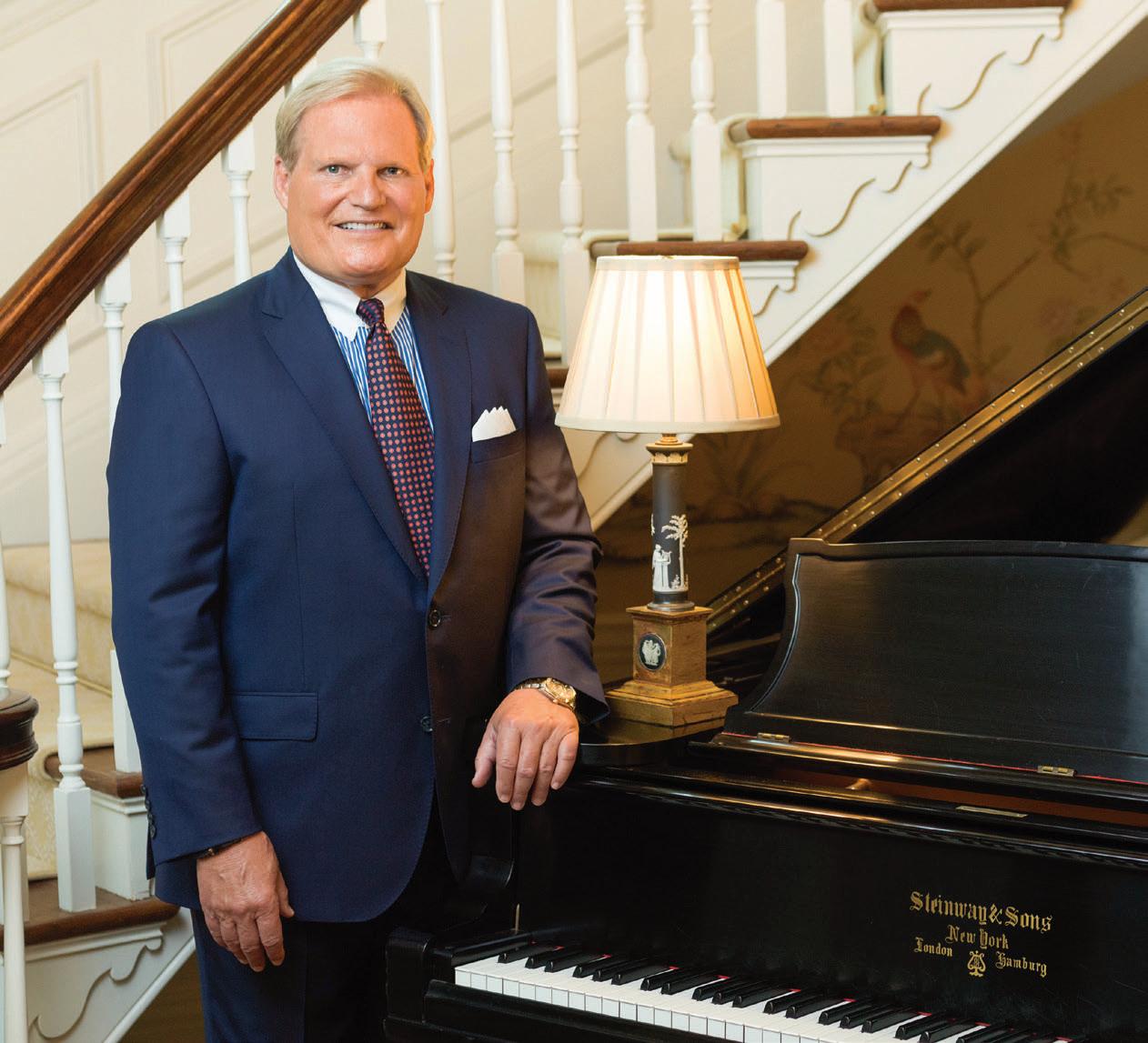
Smart Choice is one of two large networks that dominate independent insurance sales. (The other is New Hampshire-based SIAA Agent Alliance.) About half the independent agencies in the country work with one or the other.
Besides opening up access to carriers, Smart Choice also provides training opportunities and assistance with business management tasks. There’s no fee to join Smart Choice. Agencies split the commissions they receive with Smart Choice on a 70% to 30% basis, until certain goals are reached. After that, the agent keeps it all.
“We want everyone to be happy,” says Witcher. “It’s a volume business, so the more agents we have, the better off we all are. Everyone can make a lot of money.”
And, some can give a lot away. ■







It’s becoming much tougher for banks and credit unions to achieve the goal of earning a pro t of 1% of total assets. Only 14 institutions achieved that pro tability last year versus 23 in 2023 and 31 in the previous year.
Southern Bancorp and Fidelity Bankshares are defying the odds. Each had return on asset ratios topping 2.8% in 2024. Southern has $4.2 billion in assets, while Fidelity is at $5.4 billion.
Dogwood State Bank has been among the state’s fastest growers, with assets doubling to $2.2 billion over the past three years. Internal gains and the purchase of Community First Bank of South Carolina propelled the growth.
State Employees’ Credit Union has sustained its ranking as the nation’s second-largest U.S. credit union, with $53 billion of assets. Over the past three years, pro t has declined from $626 million in 2022 to $364 million in 2023 to $193 million last year.
Assets at First Carolina Bank of Rocky Mount have increased from $2.1 billion to $3 billion over the past three years. It has also diversi ed by adding businesses that aren’t tied to traditional net interest margin.
Bank branches are not going away. ere are 11 groups with at least 75 branches in North Carolina, topped by Truist, with 276 o ces and State Employees’ Credit Union with 275.
Raleigh’s First Citizens Bank selected veteran North Carolina CPA Matt Snow as its newest director in December. Snow retired this year as chairman of the Forvis Mazers accounting rm a er leading predecessor rm Dixon Hughes Goodman of High Point from 2014 to 2022.
Asheville’s HomeTrust Bank showed similar resilience to its customers who faced the historic ooding in western North Carolina last fall. e bank reported a $54 million annual pro t, down 3.4% from the previous year.



Columbus, Ohio-based Huntington Bank wants to become a name brand in the Carolinas, plotting about 30 branch openings over the next two years. e rst North Carolina branches will be located in Charlotte, Raleigh and Winston-Salem. Several of the bank’s senior regional leaders previously worked at Truist.
Wells Fargo is in the middle of a $500 million upgrade of its facilities in the Charlotte area, where it has about 27,000 employees. About 10,000 work from the Customer Information Center, a 2.1 million-square-foot campus that opened in northeast Mecklenburg County in 1996 under predecessor First Union. ■

Source: S&P Global Market Intelligence
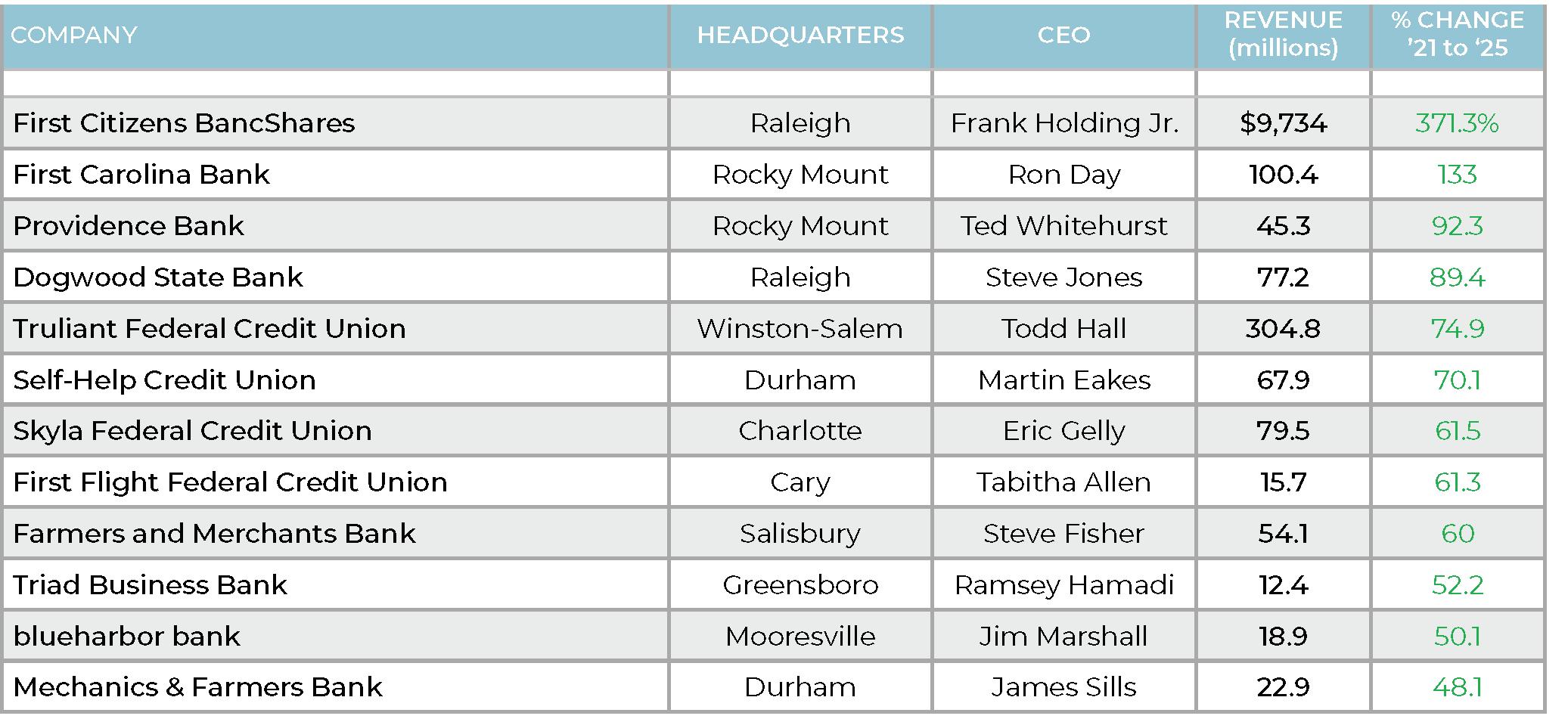























It’s been another great year to manage money for the wealthy, which is the core business of North Carolina’s major investment advisers. Our annual listing includes 29 North Carolina–based institutions that oversee at least $1.2 billion in assets, based on required annual federal lings.



Twenty-four managers on the list reported more assets under management than a year earlier, including four that had gains topping 20%. at was slightly less impressive than a year earlier, when 26 of 30 showed gains, with at least eight adding 20%.


Gains stem from the rising stock market, along with acquisitions of other rms and customer pickups. Most indices were trading at or near record high levels as of mid-May, amid lots of tumult over the past few months.


e list doesn’t include large asset managers based in other states, such as Fidelity, Morgan Stanley and Vanguard. Our goal is to spotlight some local folks, many of whom have outstanding track records while receiving little publicity. Eighteen companies are based in Charlotte, while seven hail from the Triangle.
Raleigh’s Captrust again tops the list, aided by an aggressive acquisition strategy. Its assets under management gained 27%, better than anyone except Chapel Hill-based Delegate Advisors, which grew by 46%.
One rm reported a sharp decline in assets under management. Greensboro-based Smith, Salley & Associates walked away from its only institutional client, which had provided lots of assets, but limited revenue, CEO Scott Batchelor says. “Our focus is on individuals,” he says. EMPLOYEES
The advisory business cofounded by Fielding Miller in 1997 topped $1trillion dollars in assets for the first time.



Charlotte
Robert Russo founded the company in 2014. It nearly doubled assets over past five
8. GLOBAL ENDOWMENT
Most clients are universities and foundations. Co-founder Stephanie Lynch is managing partner and former CIO at The Duke Endowment.
9.
Provides technology, reporting and other services to wealth advisors. Parent company is Concord, California-based AssetMark, which was acquired by GTCR last year. 10.
Mutual-fund adviser, formed in ‘84, is led by main partners Brad Horstmann, John Norman, Darrin Witt and Andrei Bolshakov. 11. HORIZON
Horizon launched its first exchange-traded funds in January. John Drahzal is CEO.
Robert Eubanks founded the business in 1990. It’s now led by CEO Robert Newell. Fifth Third Bancorp is owner.
Founder Frank Bragg formed his business in 1963. His son Benton has been CEO since 1998.
21. SMITH, SALLEY & ASSOCIATES Greensboro
$2.34 -23.5% 19
Gregory Smith and Mackay Salley founded the firm in 2003. Scott Batchelor is the CEO. The firm’s sole institutional client left last year.
22. COMPERIO RETIREMENT CONSULTING Cary $2.012 5% 5
President James Richard Sotell owns the company. It has 35 pension and profit sharing plan clients.
23. ETON ADVISORS GROUP
-1% 12
David Rea leads the company founded in 1979. CNBC has ranked it as a
CEO Chris Cecil founded the firm in 2008. Other owners include Nicole Gokey, Michael Farrell and Israel Gorelick.
Managing director Eric Ridenour and Thomas Byrd lead the wealthmanagement business.
Richard Bryant and Bobby Edgerton founded their multi-faceted business in 1984.
Owner Ralph Bradshaw is president of the publicly traded, $1.7 billion Cornerstone
Robert Mallernee, Jack Parham and Teresa Eriksson are cofounders. Its owner is PE firm Clayton Dubilier & Rice.
24. NOVARE CAPITAL MANAGEMENT
13.9% 23
Don Olmstead and Bill Baynard started the business in 1999. Emigrant Partners of New York invested in the firm in January.
25. LINDEN THOMAS Charlotte
19% 11
Owner Stephen Thomas formed his company in 2005. He has more than 700 clients in 35 states.
26. MORGAN CREEK CAPITAL MANAGEMENT
$1.5
29
Mark Yusko, former chief investment officer at UNC Chapel Hill, started the firm in 2004. Assets totaled $2.7 billion in 2017.
27. DELEGATE ADVISORS
$1.46 45.6% 13
Assets under management gained 46% over the past year. CEO Andy Hart is based in Austin, Texas.
28. CAROLINAS WEALTH CONSULTING
6.6% 17
George Edmiston founded the firm, which has more than 2,500 accounts. It was acquired by Captrust in January.
29. CORRUM CAPITAL MANAGEMENT
$1.24 13.8% 13
Former Bank of America executives Jason Cipriani and Jonathan Mandle are co-managing partners
Source: Securities and Exchange Commission

A $4 billion N.C. credit union makes a break from its past, testing the transition skills of leadership.
By CHRIS BURRITT
In his first job out of East Carolina University in 1983, Dwayne Naylor pedaled high-interest loans for a finance company in Raleigh. That job lasted just five months, when he jumped at the opportunity to become a loan officer in Goldsboro at State Employees’ Credit Union.
It launched Naylor’s 42-year career in the credit union industry at organizations in North Carolina, Virginia and then back in the Tar Heel state. It was also the year that SECU leaders helped form Local Government Federal Credit Union, spurred by a legal fight with North Carolina bankers. The move came after the N.C. Supreme Court required SECU to expel about 9,000 members who, despite working for local government, were deemed not qualified for SECU membership.
The credit union, aided by trade associations promoting counties and cities, side-stepped the controversy by creating Local Government with a federal charter. SECU agreed to provide many support services, including use of its ATMs and branches, in return for a fee of 25% of Local Government’s gross income. Those fees now total nearly $40 million annually. In addition to an independent board, Local Government initially had one employee. With little fanfare, it became one of the state’s most successful financial startups. Assets grew from $217 million in 1999 to $4.1 billion last year, making it the state’s fourth-biggest credit union. CEO Maurice Smith led the institution for most of its history,
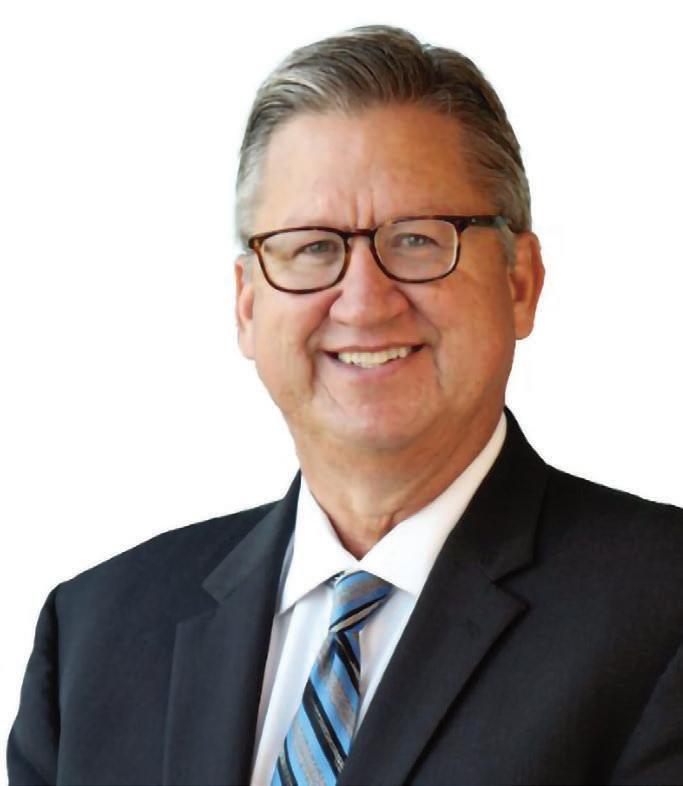
until Naylor succeeded him in 2023. Some of the growth resulted from consolidations of local credit unions made up of city and county workers across the state.
Smith had hired Naylor to rejoin Local Government as chief operating officer in 2013, helping oversee a staff that now tops 200. While it didn’t have its own branches, Local Government set its own deposit and loan rates and offered some products distinct from SECU, which became the second-largest U.S. credit union because of its low costs, competitive rates and massive branch network.
Naylor, 64, played a key role as Local Government started the affiliated Civic Federal Credit Union as a digital-only institution in 2018. With liberalized rules over who can join credit unions, Civic’s goal was to attract tech-savvy customers who were less likely to visit bank branches,
Five years later, he took charge of both organizations. With backing from a nine-member board of directors, he helped institute a new strategy that ends Local Government’s tight relationship with SECU and eliminates the Local Government brand in favor of the Civic moniker.
June 3 marks Civic Day, the official switch for about 408,000 Local Government members to Civic. The latter institution has about 8,000 members, which Naylor says is a foundation to instruct the transition team responsible for regulatory, back office, digital and other procedures.
The account and loan numbers for members transferring to Civic won’t change. Online account user names will stay the same; however, passwords must be reset.
Civic members do not automatically qualify for SECU membership with the exception of county health and human services employees.
The change has been building for more than a decade, starting in 2014 when Civic began building core computer operating systems. After deploying its full-service digital platform in 2019, it made its first loan: $500,000 for fire equipment.
“This is about 12 years of pushing buttons,’’ Naylor said in an interview last month before speaking in Wrightsville Beach to the American Public Works Association. Overall, Civic leaders have shared transition plans in almost 100 presentations to employees of local governments, fire districts and other organizations eligible for Civic memberships. The credit union is also emailing transition guides and flipcharts to members, posting information on Facebook and YouTube and taking questions from members, who want to understand how they are affected by the changes.
In the most visible change, Civic members will no longer receive account information at SECU’s 275 branches or other channels. They will instead rely on online and telephone service, along with an 11-branch system that Civic developed over the past two years.
Civic has also struck agreements with numerous other credit unions that will enable members to bank in about 130 branches aside from Civic outlets. Those stretch from Wilmington to Murphy and put virtually all members within 30 miles of a branch, officials say.
“We believe in the power of the cooperative model,’’ Naylor told Civic’s annual meeting in March. Pep talks by executives reviewing 2024’s accomplishments led up to a party at the organization’s Raleigh headquarters where members danced and donned colorful hats, fluffy boas and bright-rimmed glasses.
Naylor, who described himself as “a little bit disco,’’ during his college years, is approaching this month’s transition with enthusiasm. However, it’s tempered with possible technology and service hiccups and a guarantee of confusion for some members, according to the CEO.
“It’s just so complicated with the multiple credit unions,” he said. “It’s a disruptive transformation. Members need to trust that we’re giving them more options, not less.”
For Civic, the transition away from the SECU connection represents a balancing act reflecting the increasingly digital demands of its members. More than eight in 10 members are choosing non-branch transactions, spurring Civic to introduce new services, Naylor says.
Civic is offering Zelle payments, online loan applications with expedited approval, digital cashier’s checks and wire transfers and virtual notary services. Digitally aggregating accounts allows members to make transactions between institutions.
Credit unions are increasingly adding services to diversify their income streams, which at times puts them in more direct competition with traditional banks. That inevitably leads to debate on the nonprofit status of credit unions, which bankers consider an unfair competitive advantage for the industry.
In North Carolina, two organizations representing credit unions and banks are sparring over legislation which would rewrite state law governing how the member-owned institutions operate.
Following up on a bill initially filed in 2023, the Carolinas Credit Union League is pitching the legislation as a way to restore financial services to economically distressed communities vacated by traditional banks. It’s seeking looser requirements for people to join credit unions, creating opportunities for expansion into underserved “banking deserts” and serving people living at or below the poverty line, according to Dan Schline, the league’s president.
The bill rekindled opposition from the North Carolina Bankers Association. Although short-titled “Credit Union Update,” the association’s CEO Peter Gwaltney says the legislation “completely changes the purpose of what a credit union is designed to do, which is to serve people of modest means who share a common bond.”
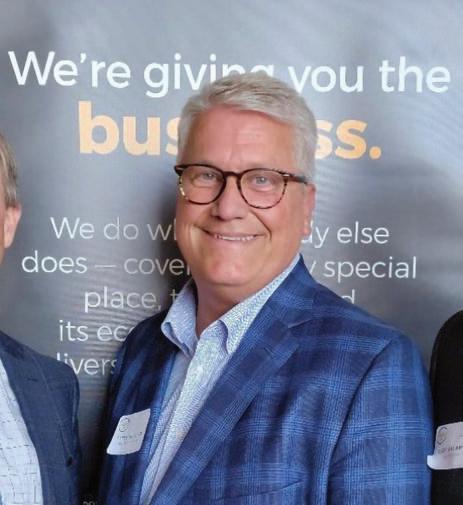
If enacted, the bill would “benefit those credit unions that want to operate like full-service banks, without paying corporate income taxes and franchise taxes like banks, or being subject to the similar examination and supervisory standards to banks,” Gwaltney says.
The bankers also dispute the notion of “banking deserts,” noting that banks will invest wherever potential opportunity exists.
Civic CEO Dwayne Naylor says that Civic’s business model is “putting a branch in the pockets” of Civic’s members, even those who live in areas lacking branches. “Even if they don’t have Wi-Fi, they can just pick up the phone and call us,’’ he says.
“We just have to stop and think that in 2025, who are we to tell members that they have to come to a branch — the 40 hours we decide to work — sign a pad, go sit in the lobby and wait for help?” he says. “The banking deserts do not exist in the model that we’re creating.”
Directors are volunteers and will serve through 2028.
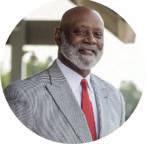
Aaron Noble Jr., chair
Burlington

David Dear, vice chair Shelby
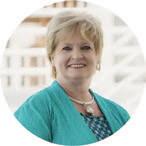
Ruth Barnes, secretary Atlantic Beach
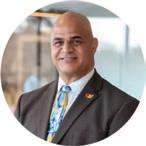
Tony Brown, treasurer Halifax County

Jeanne Erwin Cary

Lin Jones
Durham

Ken Noland
Wilkesboro

Kellie Blue Robeson County

Paul Miller Snow Hill
Back then, helping consumers manage their nances was less of a focus for Naylor, who graduated from East Carolina University with a degree in urban and regional planning in 1982. With the economy mired in recession, he veered from his training and took a job lending money at interest rates exceeding 30% in some cases.
Naylor moved along a er a few months, joining SECU, where he spent the next 17 years learning “how to focus on members and take care of them,” he says. “ at matched what my parents taught me, which is to treat everyone as an individual with full respect.”
Naylor’s mother worked for Wayne County’s school system and belonged to SECU. While banking in the Goldsboro branch, she learned about an opening for a loan o cer, leading to Naylor nabbing the job.
From SECU, he joined Local Government in 2000, serving as executive vice president before leaving in 2005 for the same position at Langley Federal Credit Union in Hampton Roads, Virginia. In 2013, he returned to Local Government.
To attract deposits, Civic has also been o ering some unusually high deposit rates. In early May, Civic was paying 5.05% interest for an 18-month CD. at compares with 4.3% at SECU and 3.8% at Ally Financial.
To boost convenience, members who want to make cash deposits can do so at Walmart, Food Lion and retailers where cashiers will handle the transactions. Civic will cover fees for the deposits, as well as the rst $20 members spend monthly on ATM surcharges.
For Local Government members who borrowed against their salaries, Civic is replacing those with installment loans over several months, leaving them with some money — rather than none from their paychecks, Naylor says. e switch “helps members manage their money better rather than being caught in that cycle,” he says. Combined, the steps “empower our members to build wealth and give them back some of their precious time,” Civic said in its strategic business plan last year.
Covering ATM fees is an expense Civic is paying for members. at expense will be o set by savings from no longer paying $40 million a year to SECU, Naylor says.
“We’re building this whole infrastructure,” says Naylor, explaining that the costs have led to temporary de cits. Local Government, which has been pro table since its inception, reported a combined net loss of $16.9 million in 2023-24. It lost another $5.2 million in the rst two months this year.
e losses were expected, he says, and re ect “the cost of becoming independent from SECU this June and building our systems and sta We’ll become more and more e cient, and then will ourish on the other side.”
Civic didn’t go overboard spending on its new branches, he notes. It bought an old Hardee’s restaurant in Hickory for $700,000, while it paid $500,000 for a building in Ahoskie. In Greensboro, it opened in a strip center storefront, down from a nance company, the type of business for which Naylor worked fresh out of college more than 40 years ago.
As far back as 2010, credit union executives realized that the reliance on SECU wouldn’t last forever. Also, the National Credit Union Administration, the government agency overseeing member accounts at credit unions nationwide, expressed concerns about the relationship, Naylor says.
A policy change by SECU in 2014 to halt lending to local re departments also spurred the push toward independence. At that time, Local Government had about $60 million in loans outstanding to re departments. Unlike most large credit unions, SECU doesn’t make business loans, instead focusing on consumer lending. It had made an exception for re trucks and related equipment.
“If we stopped o ering those accounts, we would have to tell them to go somewhere else,” Naylor says.
Now, Civic believes it can distinguish itself with a mostly digital operation enhanced with a modest branch network for members who want some personal contact. As an example of a successful competitor, he points to San Francisco-based So , a digital banking company that added 800,000 new customers and had a 33% increase in revenue in its most recent quarter.
“SoFi is just tearing the nancial services industry up,’’ Naylor says. e publicly traded company had revenue of $2.6 billion last year.
Civic members have about $3.2 billion in loans outstanding, but also borrowed about $15 billion elsewhere, Naylor says. “Most of the lending was taking place somewhere else.”
His job is to get a chunk of that money back into Civic accounts. ■
Civic leaders initially envisioned operating without branches. But the strategy shifted, leading to these 11 offices:



Born and raised in India, Adivi began a career in consulting after graduating from Osmania University. He has been with Trust Your Supplier since 2014, where he works with the organizations’ approach to vendor management. Adivi works with company interns to help them gain experience. An avid cook, he specializes in Indian desserts.
Favorite tech executive: Microsoft CEO Satya Nadella and his philosophy that empathy is at the root of all innovation and helps build successful products.
Major influence: My first project was about analyzing viewership data. It made me realize the importance of analyzing data.



Outside work: I have picked up gardening over the last three years. It has taught me value of patience.


Wanting a change in scenery attracted the self-taught programmer to move from Baltimore, where Mindgrub is headquartered, to Raleigh, where it has an office. A University of Maryland Baltimore County graduate, Airey says tech’s constant change attracts him to the profession. Mindgrub creates websites, apps and other digital services for businesses.
AI’s good and not-so-good: It can help bridge skill sets, but it hasn’t gotten to the point where I can trust it for mission-critical tasks.
Favorite tech executive: Elon Musk is pragmatic and disregards the prevailing views in the industry, opting to favor logic and reason over popular opinion.



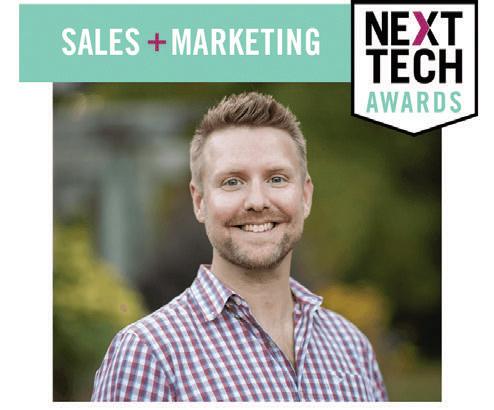

Outside passion: Gardening and cooking. Nothing better than eating a meal from your own backyard.

A Florida native, Ange’s family moved to Raleigh when he was 6, a return home for his parents who were both born in eastern North Carolina. He first started working for Clarkston in 2005 after graduating from UNC Chapel Hill. He left in 2011, but returned in March 2022. Ange is involved in the local soccer community as a player in adult leagues, fan for his children and coach for multiple teams.
Concerns for AI: Will we be able to reskill people at the same pace that jobs are lost? Favorite tech executive: Gainsight CEO Nick Mehta for his approach to building a SaaS solution that enables everyone to deliver for their clients.
A tech skill everyone should learn: Basic programming skills offer a great frame for problem solving.
Avagliano grew up in Delaware, and attended UNC Chapel Hill. After stints in D.C, Chicago for law school and NYC, she moved back to Chapel Hill in 2019. She comes from a family of small business owners. A serial-entrepreneur law professor sparked her interest in tech. In October, she joined Raleigh-based CivicReach, which creates Voice AI to assist local governments in telephone communications.
Tech skill we should all learn: How to build a pitch deck without PowerPoint. So many better tools out there.
Outside passion: Cooking and all things food and wine.
Bucket list: Learning to ice skate. My husband and son play hockey and one of my daughters is into figure skating. I don’t want to be the only one who can’t stand up in ice skates.

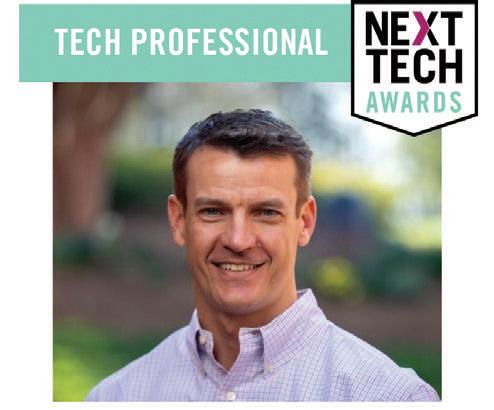



Batten grew up on a dead-end, dirt road outside of Selma surrounded by tobacco fields and cow pastures. He now leads commercial growth and sales for the largest and fastest-growing bootstrapped tech services company in history. The NC State graduate is a former YMCA youth sports coach and now leads a father/son camping experience group.
Favorite tech executive: North Carolina entrepreneur Donald Thompson has no clue as to how he has influenced my career. His no giving up, out hustling, people-first culture sets a standard.
Tech skill we should all learn: Hot keys to create effective AI prompts. Outside work: I’m the guy who keeps photos of himself grilling food on phone. his






Biechele grew up in Chapel Hill, but switched allegiances to NC State to study mechanical engineering. She worked six years for John Deere in Iowa, where she flew drones as a testing engineer and worked on the first electric standing commercial lawn mower and other EV prototypes. She joined Kempower in 2024 to help design DC fast chargers.
Outside passion: Performing or teaching comedy improv at Mettlesome Theater at the Golden Belt Campus in Durham.
Tech skill we should all learn: How to flowchart. It forces you to slow down and systematically think about a process.
Bucket list: Go camping. I have visited all but four of North Carolina’s state parks.



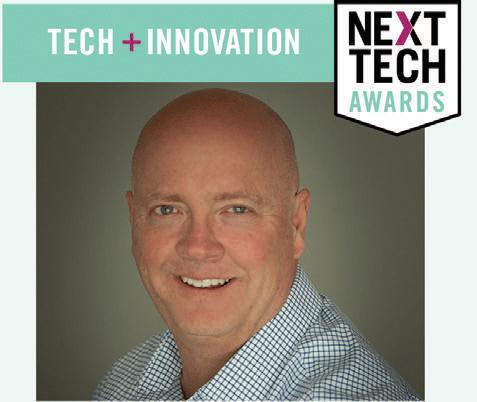

Making a difference: Cook and pick up donations for Durham Community Fridges, 24/7 social safety net for the community.


Educated in his native India, Chebrolu moved to the Bay Area after earning a master’s degree in computer science. He fell in love with Research Triangle Park on a 2004 business trip and Cary has been his home since 2005. He has a Ph.D. from Capella University, taught cybersecurity to grad students and worked at Cisco, Adobe and at Red Hat since 2015.
Outside passion: Visit all seven wonders of the world (three to go) and all seven continents (three to go).
Tech skill we should all learn: Cybersecurity. Protecting our digital lives should be as fundamental as learning to drive.
Making a difference: Chebrolu is a cybersecurity adviser to several North Carolina universities and co-founder and president of the Cloud Security Alliance Triangle Chapter.
Clark earned a bachelor’s in his native Washington state and a master’s at New York’s Columbia University. He escaped the rain and the cold 13 years ago, and has been at Project Kitty Hawk two years. He has helped the nonprofits he has worked for automate workflows and enabled users to engage easier with services through technology.
Concerns about AI: Negative impacts such as deepfakes, potential to increase income disparities and energy required could make climate change worse.
Favorite tech executive: Salesforce CEO Marc Benioff urges companies to donate 1% of their equity, technology and employee’s time to build a more sustainable world.
Tech skill we should all learn: Critical thinking and analysis skills


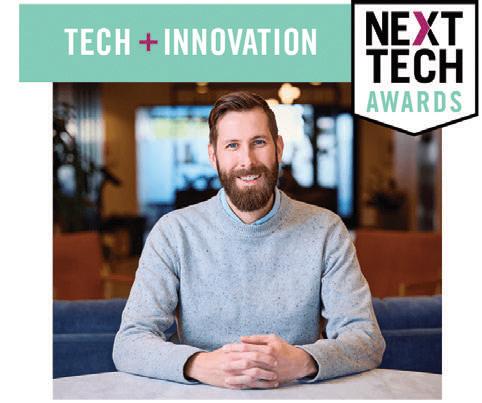

Cramer grew up in High Point, the son of a furniture worker. He encountered his first personal computer in 1992 at a job with a mortgage company after graduating with an economics degree from UNC Charlotte. He became obsessed, teaching himself Excel spreadsheets to analyze foreclosed loans. He arrived early to work to dive into technology. He joined Jackrabbit in 2011.
Excitement about AI: We’ve streamlined our processes, resolved issues faster and reduced the need for cross-team escalations — freeing up valuable resources across the board.



Favorite tech executive: Microsoft co-founder Bill Gates’ vision for making technology accessible and empowering businesses and individuals has inspired me throughout my career in IT.

Tech skill we should all learn: In today’s connected world, understanding cybersecurity is critical.
Crow had a thousand ideas of what he wanted to do, but didn’t settle until his fascination with the intersection of humanity and technology brought him into the tech sector. He joined WorkSmart in 2016 and was promoted to a senior director position in April. The University of Maryland Baltimore County graduate participates n Triangle adult soccer leagues.
Concerns about AI: We need our governments and regulatory bodies to enact meaningful governance over AI model data access, security and transparency.
Outside work: Breathing fresh forest air, sun warming my face and joy in the sound of birdsong.
Tech skill we should all learn: The single greatest skill a person can curate is that of curiosity, and of asking good questions. career a

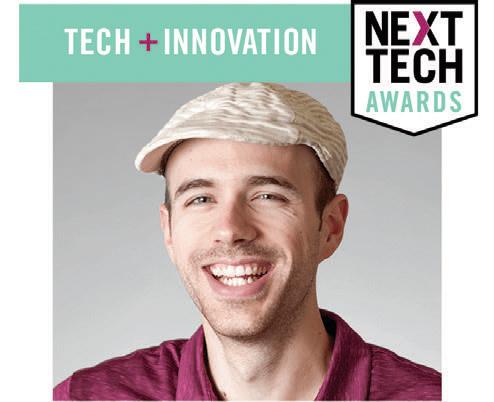





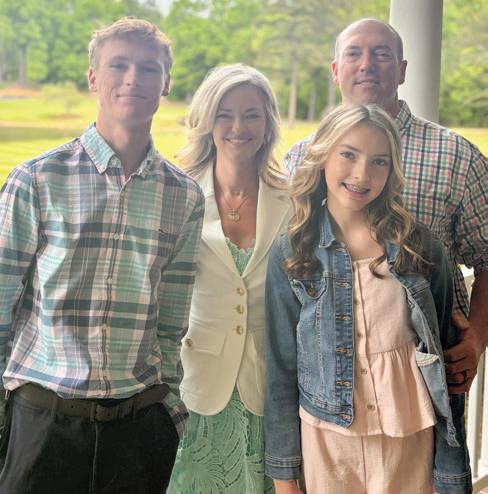

The North Carolina native leads a team tasked with solving problems and improving healthcare outcomes. He has a bachelor’s degree from UNC Greensboro and master’s from NC State. He and his wife make a difference in their own backyard by sharing meals, feeding pets and mowing lawns in a communal relationship with neighbors.
Concerns about AI: I am excited but also concerned about the social and ethical impacts of AI.
Favorite tech executives: Daniela Amodei and Dario Amodei, the president and CEO, respectively, of Anthropic, for their willingness to invest in the safety of AI.
Major influence: Leslie Dare, former director of technology services, whom I reported to during my career at NC State. She modeled strong leadership collaboration and a supportive approach in everything she did.

Ellison has decades of AI experience, the last seven at Lenovo. He has supported its AI and enterprises and small and medium business segment growth from $200 million to $1 billion in revenue. A Brigham Young University graduate, he holds a doctorate in biomedical engineering from Johns Hopkins University. He mentors students at NC State and Stanford, and supports Lenovo’s Women in AI and Product Diversity Office.
Concerns about AI: How easily the hype can outpace real understanding.
Favorite tech executive: Microsoft CEO Satya Nadella has transformed Microsoft with cloud and AI investments, but also fostered a culture of empathy, continuous learning and purposeful innovation.
Tech skill we should all learn: Benchmarking. Knowing how to measure performance cost, accuracy, speed, or fairness — is essential to building real-world AI systems.
Elsen became the Wolfpack’s first esports program director in November 2023 and has made a career coaching collegiate and professional esport athletes to victory. He’s the winningest collegiate esports coach of all time, and has won two world and 10 national championships. He has a bachelor’s from Saginaw Valley State and a master’s from West Virginia University. His students learn new elements of gaming that they take into other disciplines.
Excitement over AI: Improvement of user experience in the gaming industry. Tech skill we should all learn: Cybersecurity, so we can better protect our respective brands’ data and consumers.
Bucket list: Attend the international dreamhack festivals to get a better understanding of worldwide trends in gaming.
Holt was born and raised on a farm in Durham where she learned to shell butter beans, pick strawberries and play host to school pumpkin patch trips. Her father worked for Nortel and her mother was a special education teacher. She has degrees from UNC Greensboro and NC State. She added the role of chief business operations officer at Silver Tree in January after joining the company in 2022.
Favorite tech executive: Salesforce Vice President Sue Warnke
Major influence: I aspire to be like those who find joy in growing and serving others.
Making a difference: Vice chair of NextGen Thriving, which helps youth with job-related skills and expanding their horizons through training opportunities.
The Simpsonville, South Carolina, native earned an accounting degree from Clemson University as a first-generation college student. She is a selftaught developer, attracted to tech’s ability to make the work of internal customers easier through automation and process improvement. She joined Compass Group in 2024. She volunteers as a career development instructor with Big Brother Big Sister. She hopes to start business school next year.
Favorite tech executive: Khan Academy founder Sal Khan, who is closing education access gaps through free learning resources.
Outside work: I intentionally disconnect from screens. I prioritize time with friends, reading, volunteering or even taking my cat to the park.
Tech skill we should all learn: Spotting phishing scams. I’m shocked at how many people I know fall for them.
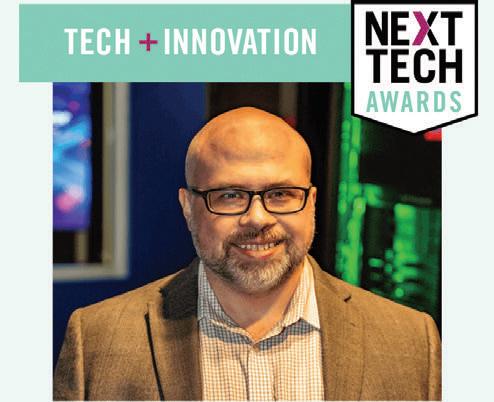



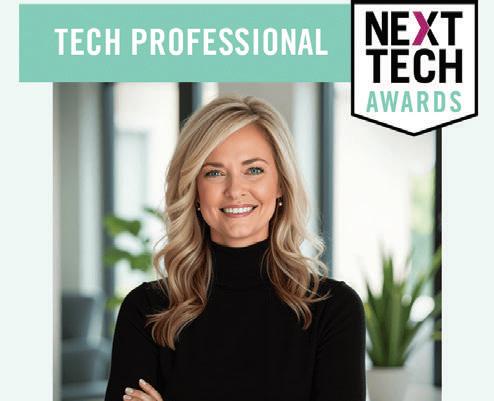




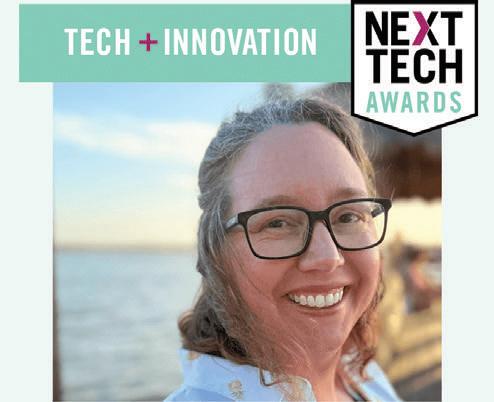



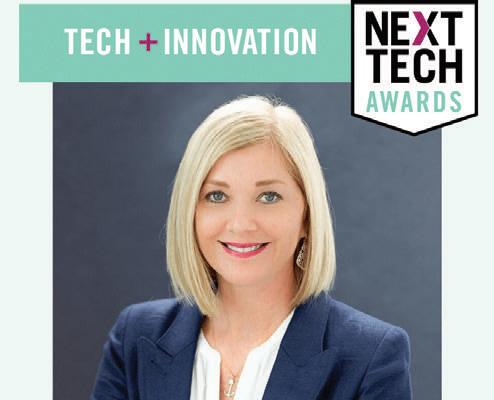


Karmakar joined Deutsche Bank 18 years ago after graduating from the National Institute of Technology in India. His expertise includes cloud engineering and architecture and AI for engineering and database transformation. He is active in cultural community programs and initiatives like Morrisville 101.
Favorite tech executive: Apple co-founder Steve Jobs overcame numerous challenges and continually improved.
Outside passion: Traveling allows me to explore new cultures and gain diverse perspectives.
Bucket list: A trip to Alaska
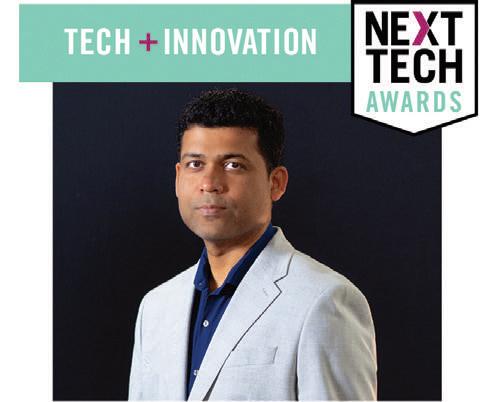

After a decade in education, Kremer transitioned into tech in 2020 and has been with Raleigh-based Stern Security since 2021. She says when a fourth-grader asked why she didn’t have a tech career, she realized she didn’t know opportunities existed while growing up. She has a bachelor’s degree from Western Carolina, a master’s from East Carolina and a Ph.D. from the University of New England.
Major influence: My software development instructor Sean Doherty. He emphasized the importance of building teams that reflect diverse backgrounds and perspectives — people who think differently.
Tech skill we should all learn: How to use a password manager so you can ditch reusing passwords.
Outside work: Any given weekend, you’ll find me trying my hand at something new from archery lessons to pottery classes.
A North Carolina native, McCray has more than 20 years of human resource experience across local, state and federal governments. She joined the state agency in 2018 and assumed her current role in 2022. She has an undergrad degree from Hampton University and a master’s from N.C. A&T State University. She introduces cybersecurity and coding skills to elementary school students to spark an interest in computer science.
Favorite tech executive: I respect leaders who champion ethical innovation, foster inclusive environments, and are committed to using technology responsibly and transparently.
Tech skill we should all learn: Data analysis
Bucket list: Nurturing more entry level roles in state government to create opportunities for the next generation of technical innovators.
McKee began solving problems with computers in high school, leading her to study computer information systems first at Brevard College and then Appalachian State. She grew up in Lenoir and began working in Charlotte 29 years ago. She has assisted nonprofits with Apparo for the past 12 years.
Favorite tech executive: All women who lead in technology drive innovation and inspire girls and other women to seek technology careers.
Tech skill we should all learn: Cybersecurity is crucial to recognize phishing emails, scams and understand privacy settings. Our data footprints can be compromised in many ways these days.
Bucket list: A two-week trip to Tuscany and the Amalfi coast with one of my best friends, including a wellness retreat with 15 other women.
The Michigan State University graduate grew up in Michigan and first started working for Atomic in Grand Rapids in 2020, moving to Raleigh after it opened an office here in 2022. Atomic helps businesses update software systems, including integrating AI.
Major influence: A co-worker shifted my thinking by saying, “You’ll never have more bandwidth than you do right now.” It helped me realize that making space for personal life often means setting boundaries at work.
Outside work: Living comfortably: blanket and cat on your lap, warm cup of tea in hand, windows open when there’s a light breeze.


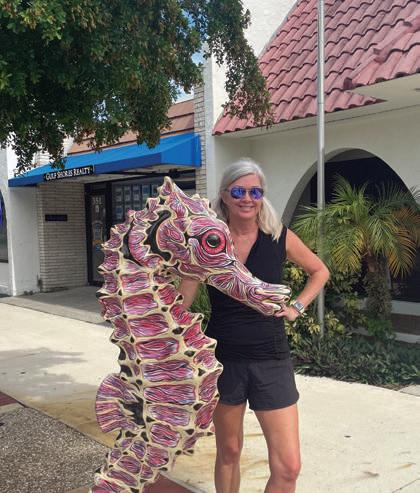


Bucket list: I would love to buy a freaking house next year. OK, maybe a townhouse a condo. or


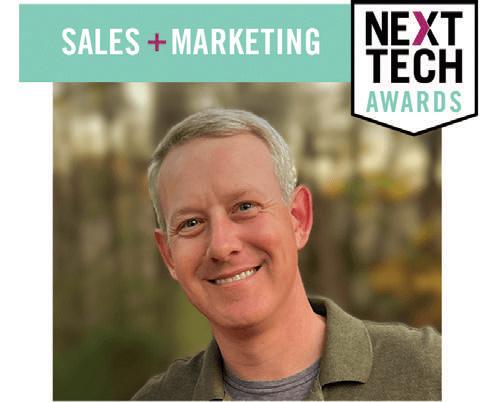



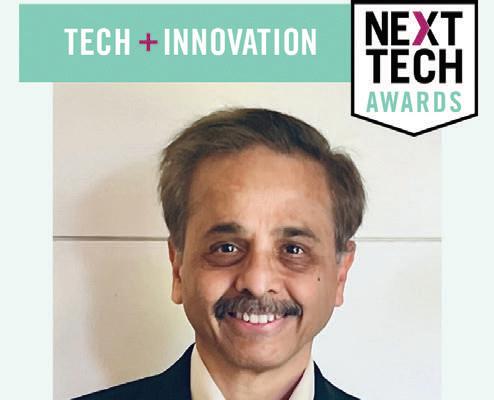
Myers was raised in the Lake Norman area, but moved to Raleigh to attend NC State and never left. After college, he had two job offers and picked the web-based financial analysis software company. He has been with Abrigo, formerly Sageworks, for more than 20 years, and became vice president in 2022.
Favorite tech executive: I worked closely with Brian Hamilton and Scott Ogle in the chaotic and exciting start-up phase, to Jay Blandford and Andy Snow as we grew to be a major player in the fintech space.
Tech skill we should all learn: Basic AI prompting skills should be a staple in early education.
Bucket list: Vacation to Hawaii is in the works, so biking down a volcano may become a thing.
Pack was born and raised in Winston-Salem, and moved to Charlotte in 2006. After more than 20 years in advertising, the UNC Chapel Hill graduate made a 180-degree career switch in 2018 to work with Dualboot, a software development company, where he engages daily with startups and entrepreneurs. Pack’s latest passion is learning to golf at an older age.
Favorite tech executive: Someone with no tech background that sees solutions many people wouldn’t to solve a problem that benefits an industry.
Major influence: My wife as I’ve watched her build a business while choosing to be present at home has taught me to pursue excellence without losing sight of what truly matters.
Tech skill we should all learn: When to put the smartphone down.
Russell helps UNC Health use AI and automation to integrate people, processes and technology into healthcare. She has an undergraduate degree from Virginia Tech and earned an MBA from UNC Wilmington last year. She also volunteers with organizations to help involve girls in ice hockey, including Polar House Hockey League, Canes Girls and is team manager of Raleigh Raptors Hockey Club.
Favorite tech executive: Bill Russell and his podcast “This Week in Health IT.”
Tech skill we should all learn: Adaptability to rapidly changing technology.
Bucket list: After finishing graduate school on top of a job, family and volunteering, I want to focus on building professional and personal relationships.



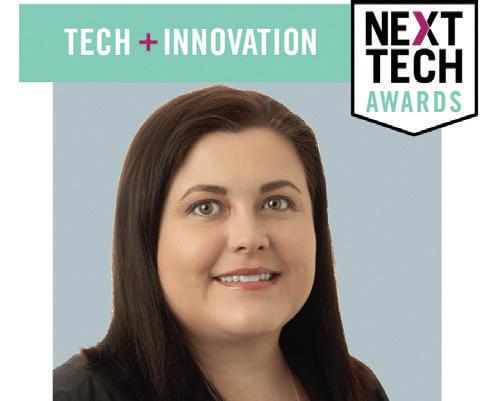

Sharma has an undergraduate degree from the Indian Institute of Technology and master’s degrees from Ohio State and Vanderbilt University. When LexisNexis moved its technology center from Dayton, Ohio, to Raleigh, Sharma came along and has been living here since 2019. He leads a team of data scientists and machine learning engineers to create products and transform AI technology into practical solutions.
Favorite tech executive: Microsoft CEO Satya Nadella leads in cloud computing and AI with emotional intelligence, technical vision and strategic decision making.
Major influence: My parents for their work ethic and integrity.

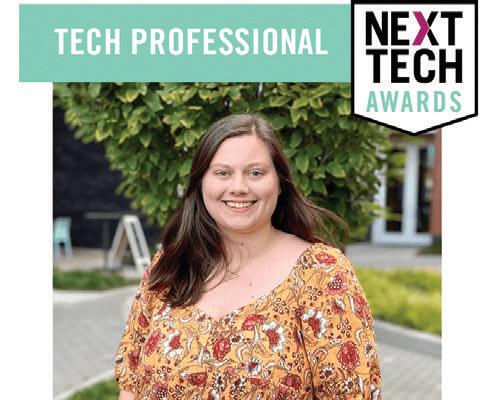


Making a difference: Strong advocate for the rule of law and volunteer for projects related to making justice accessible to everyone. projects making justice everyone.

Smith grew up in Huntersville and volunteered with E2D, where she learned how tech can change lives. After building her career at Eaton in Arden, the NC State graduate had a chance to return to E2D in 2022. The Corneliusbased nonprofit collects used laptops, refurbishes them and then distributes them to students in an effort to “eliminate the digital divide.”
Favorite tech executive: Kate Brandt is leading sustainability efforts at Google that show environmental responsibility and innovation go hand in hand.
Major influence: Mr. Keene, my high school teacher, nurtured my curiosity in technology.
Tech skill we should all learn: The ability to troubleshoot basic tech issues. It’s not about mastering every app, but building the mindset to figure things out, be self-sufficient.





On long car rides, Sowinski’s parents would give her different variations of coins and have her add up the quantities. Now, she measures data, performance indicators and risks for Truist. She has an undergraduate degree from UNC Chapel Hill and master’s from Georgia Tech. She mentors junior talent and volunteers with Truist community service events, most recently the Dottie Rose Foundation.
Favorite tech executive: Former Meta COO Sheryl Sandberg has been an inspiration since reading her book “Lean In.”
Bucket list: Having a baby. My second son is due in October.
Tech skill we should all learn: Challenge the data! Don’t be afraid to consider how final graphs or metrics may be positioned to “lead the witness.”
Thompson was born in Annapolis, Maryland, and the family moved to North Carolina when his father retired from the Army in the late 1990s. Initially in school to be a paramedic, luck intervened when he was hired to clean out an old computer room in 2015. That job led to him working on a help desk, which launched him into information technology. He has been with Atlantic Packaging since 2018.
Major influence: My father introduced me to Joshua Wyatt in 2016. At the time, he was a director at N-Able. That conversation opened the door to a world of knowledge I did not realize existed.
Outside passion: Reading a good book. You can learn a lot about someone by discussing their favorite book.
Bucket list: Enroll in a master’s program.
Born and raised in Rwanda, Uwamwiza has a bachelor’s degree from Gustavus Adolphus College in Minnesota and a master’s from University of Central Missouri. Being an international student here has helped her be a voice for others. She came to Raleigh in 2021 to work for Toshiba. She came from an accounting background, but in her first job used technology on a project that needed analytic and visualization.
Favorite tech executive: Former Irembo CEO Faith Keza of Rwanda because of how much she achieved at a young age.
Tech skill we should all learn: Mastering even one coding language will take the idea that computer science is intimidating out of your mind.


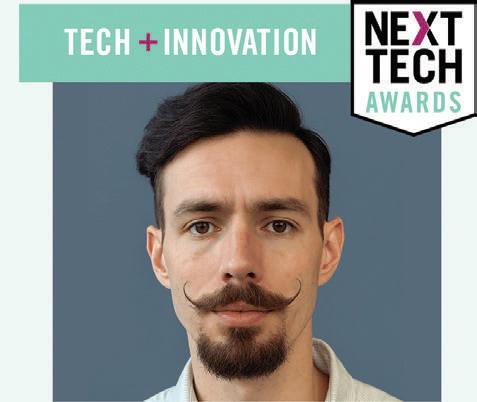


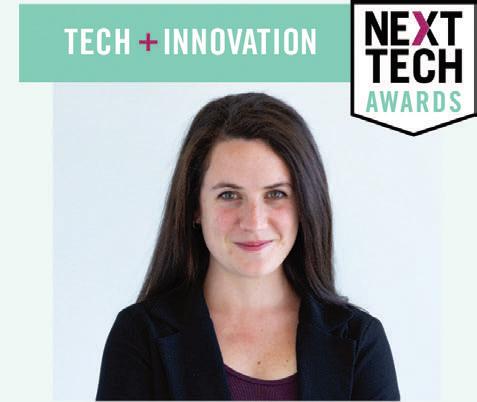

Outside work: Women empowerment because where would the world be without women?

The North Carolina native connected with BlueLena CEO Daniel Williams while at NC State, leading to an interest in technology’s role in journalism. She began working with the Cary company that helps news organizations accelerate digital growth in 2021 and was promoted to her current role in September, where she helps deliver technology-enabled solutions to publishers.
Favorite tech executive: Reshma Saujani founded Girls who Code, which works to close the gender gap in technology. My dad took me to a seminar in high school so I owe a lot to her mission.

Tech skill we should all learn: Excel makes sorting data easier and knowing simple functions is a real time-saver.
The 2025 class of winners were celebrated during a reception on May 14 at the Durham Convention Center.


Outside passion: Running, playing with my dogs and painting





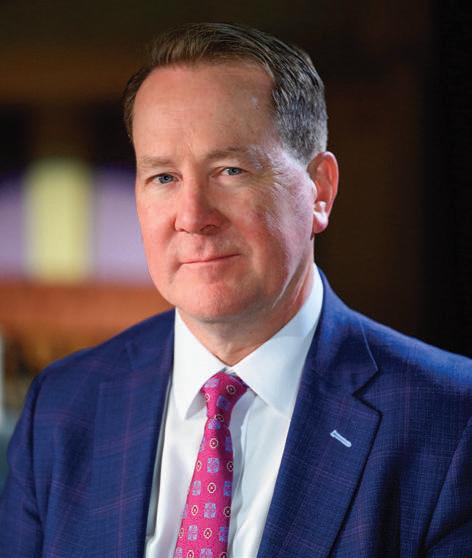
North Carolina remains poised for ongoing growth and nationwide aerospace leadership. At Piedmont Triad International Airport (PTI), we’re proud to be an integral part of that success.
Our state’s future will be bolstered by more than just strong infrastructure. It depends on bold partnerships, visionary planning, and a commitment to collective prosperity.
As we look across the Triad, and beyond, PTI has established itself as more than a regional asset. Thanks to forward-thinking leadership over many decades, combined with local, regional and state teamwork, we have been building an ongoing platform for global opportunity. Whether it’s the continued rise of aerospace manufacturing, the acceleration of reshoring strategies, or the urgent demand for workforce-ready sites, PTI is helping North Carolina achieve high marks on all fronts.


More than 50 employers already call our campus home, including Honda Aircraft Company, FedEx, HAECO, Marshall USA, and Textron Aviation. And, Boom Supersonic’s Overture Superfactory is just one example of how PTI and North Carolina are attracting innovative brands that bring next-generation jobs and long-term economic impact. These aren’t just companies locating here – they’re proactively choosing PTI and the Triad to anchor their U.S. or global strategy.
We’re ready for what’s next. North Carolina’s position as a top state for business, favorable cost of living, and competitive operating costs, makes the Triad a natural fit for companies looking to grow with confidence. PTI sits at the intersection of world-class training and real-world opportunity, drawing from 1.8 million workers in a 60-mile radius and partnering with our state’s top universities and community colleges to promote manufacturing and technology growth.


For the state’s political, civic, and business leaders, this moment represents a rare convergence: global demand, local readiness, and strong leadership working in alignment. PTI is proud to be a catalyst in that equation. We have a clear vision and are delivering results not only for the Triad but for the state as a whole. Our impact – more than $10 billion annually – is a signal that PTI is central to North Carolina’s competitiveness in a rapidly changing world.
The message is clear: we are open for business, we are built for growth, and we are thinking not just about what’s next, but about what’s possible. At PTI, we’re honored to play a role in shaping the future of our region and our state.

Kevin Baker Executive Director Piedmont Triad International Airport















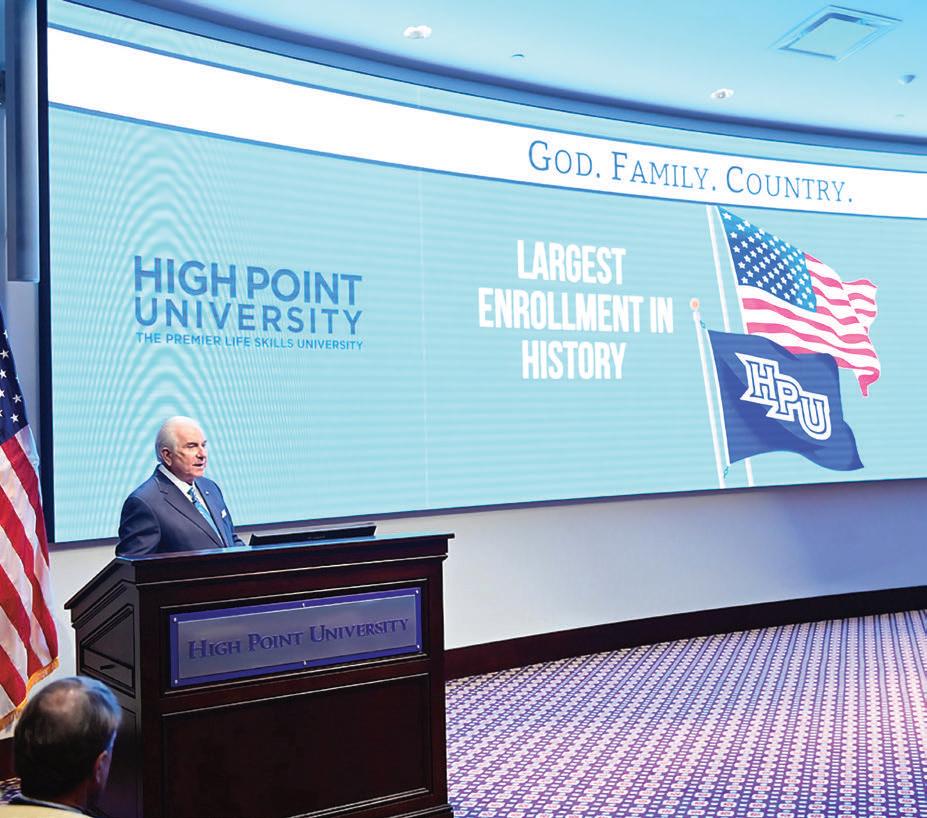














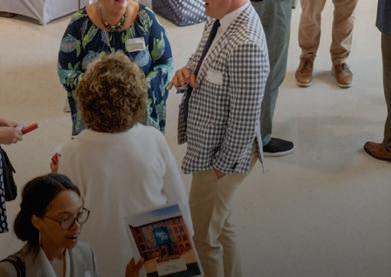

The Triad is building a strong future through a variety of efforts. They include creating a supportive environment for entrepreneurs, adding amenities and encouraging people to put down roots.
The Triad’s second-largest city by population, Winston-Salem, has set specific goals within its 2030 Vision and Strategic Plan, including becoming the Southeast’s top mid-size city. Strategic recruitment and expansions of businesses, along with becoming a more equitable community and the best place to raise a family, are expected to get it there. “With these pillars guiding our efforts, we have already surpassed the job growth of the previous decade over the last four years and continue to make strides in optimizing our workforce pipeline,” says Mark Owens, president and CEO. of economic development booster Greater Winston-Salem, Inc., which was recently honored as Chamber of the Year by the Association of Chamber of Commerce Executives.
Lofty goals abound in the region’s most populous city, too. “Greensboro and the Triad have always been a place where big ideas take root and grow,” says Brent Christensen, Greensboro Chamber of Commerce president and CEO. “From startups to career changers to industry leaders, this region is full of opportunities for people willing to take a chance on something new. With organizations like Action Greensboro, Campus Greensboro and the North Carolina Center for Innovation and Entrepreneurship, plus world-class institutions like the Joint School of Nanoscience and Nanoengineering, we’re making it easier than ever to turn ideas into reality. Whether you’re launching a business, investing in innovation or looking to take the next

step in your career, this is a community that believes in possibility and works together to make it happen.”
The Triad’s 12 counties — Alamance, Caswell, Davidson, Davie, Forsyth, Guilford, Montgomery, Randolph, Rockingham, Stokes, Surry and Yadkin have about 1.7 million residents and 21 colleges and universities. They’re a mix of metros and rural communities. Within them is a variety of resources ready to help students, residents and businesses become successful. “While the resources are great and the cost of living is incredibly attractive, our secret sauce is the willingness of people in this city to help you,” says Stan Parker, president of Winston Start, which helps startups scale up. “It takes a village, and we have a great one.”





NC IDEA supports North Carolina residents who want to start and grow a business. The independent private 501(c) (3) foundation awarded 18 Ecosystem and 11 Rural Impact grants worth $1.7 million in March. The Ecosystem grants help identify and support organizations that strengthen the state’s entrepreneurial ecosystem.
One Ecosystem grant went to Winston Starts. “[It will] allow us to refine our Explore program and extend it to entrepreneurs in adjacent counties [who] have an idea for a scalable business but do not know how to bring it to fruition,” Parker says. “Explore participants have access to Winston Starts offices and events and an online self-paced curriculum with personalized guidance from expert mentors. Scholarships are available for residents from designated rural counties, women and minorities.”
Winston Starts helps entrepreneurs launch and grow their business, from idea validation to market validation


and growth. “We have supported 98 companies since 2018,” Parker says. “These companies have raised $138 million in capital since inceptions.” The mission is to provide intensive, inspiring support to startups, collaborate and partner with other startup enterprises across the Triad, and “promote a culture of entrepreneurship, innovation and inclusion.” Since December, it has helped companies generate $31 million in revenue and create 316 jobs.
Business High Point-Chamber of Commerce launched The Interchange in fall 2023. It offered 63 in-person and 16 virtual-training sessions and served 832 people last year. “The inspiration behind The Interchange was to create a dynamic program that encourages innovation, collaboration, leadership and entrepreneurship within the community,” says Julie Hill, The Interchange executive director and chamber chief of staff. “By offering state-of-the-art facilities and workshops and programs, The Interchange aims to attract and cultivate talent, drive
economic growth and enhance the overall business ecosystem of the region.”
Hill says The Interchange has become a hub for personal growth. “Events like masterclasses and leadership academies taught by experts in the field have been well-received, further strengthening the business network in High Point,” she says. “[The High Point Chamber] has become a trusted catalyst for economic growth, advocacy, education and entrepreneurship.” It has longstanding partnerships with Visit High Point, High Point Market Authority and others. Its initiative Thrive High Point 2.0 helps entrepreneurs, including underserved and women-owned businesses, overcome challenges.
Alamance Chamber Director of Small Business and Entrepreneurial Development, Stephanie Williams, says the county has two grant programs exclusively for entrepreneurs. Small businesses use Launch Grants — $1,500 to $5,000 — if they’re in the first two years of operation. If they’re a legal entity registered with



N.C. Secretary of State, they can use Growth Grants — $5,000 to $15,000. “The Chamber encourages participation of veterans, women and minorityowned businesses,” she says. Opportunities abound across the Triad’s more rural stretches. CoSquare, the first co-working space in Yanceyville, offers variable memberships, office spaces and pricing for early stage entrepreneurs and business owners wanting to test a brick-and-mortar location. Montgomery Community College and Surry Community College offer help through their Small Business Centers. Stokes County’s website details how to start a business, and Rockingham County’s website has a 1-2-3 Tool Kit for startups.
A March Business to Business Reviews report ranked North Carolina, and in particular Greensboro, as top spots for small businesses. GuilfordWorks, one of 23 Workforce Development Boards statewide, offers career assessments, resume services and talent engagement representatives, and training grants for employers from its High Point and Greensboro offices.
The North Carolina Center for Innovation & Entrepreneurship opened in February. The nonprofit’s goal is to expand to locations at Elon University’s Innovation Center and Alamance Community College. “The NCCIE is focused not just on our community
here in Alamance County but on creating a statewide innovation and entrepreneurship blueprint for smaller suburban and rural communities like ours that seek to participate actively in the state’s interconnected innovation ecosystem but often face significant barriers such as limited funding, insufficient staffing capacity and a lack of strategic guidance,” says Sara Cloud, its founder and executive director. “We believe that small businesses are the backbone of thriving communities. When small businesses succeed, they create jobs, attract larger companies and build economic stability. They ignite progress and anchor families to a community where they can live, work and prosper.”
Cloud says NCCIE’s “heart of innovation” is Ember, a co-working, co-warehousing, meeting and event space within its 25,000-square-foot headquarters in Mebane. “It serves as a dynamic hub for entrepreneurs, small businesses and innovators looking to collaborate, create and grow,” she says. “In Alamance County, we saw a critical gap. While innovation and entrepreneur centers were rapidly forming in larger cities around us, local small businesses and startups faced significant barriers to growth. Accessing business support services from organizations like the SBTDC required a drive to Chapel Hill or Greensboro.”
Innovation Quarter is 1.7 million square feet of mixed-use space on more than 330 acres in downtown WinstonSalem. It has united education, research and business for the betterment of the community at large since 2012. “At Greater Winston-Salem, Inc., we’ve created a workforce hub in the Innovation Quarter co-located with Forsyth Tech,” Owens says. “This is a centralized point where people can obtain resources to grow a business, succeed in the workforce, utilize professional development and networking opportunities, and more.”
Last January, Innovation Quarter launched a partnership with Winston Starts. “[It provides] memberships for iQ entrepreneurs and startup companies in the biotechnology, life sciences and regenerative medicine industries,” according to a news release. Its goal is simple — making it easier for businesses to succeed. “The business landscape for life sciences companies is extremely difficult and capital intensive, and at the iQ we want to reduce obstacles for tenants,” says Isaac Perry, head of biotech and life science ecosystem development for the iQ and GWSI. “By curating a connected ecosystem, we hope to help companies maximize precious early runway capital, inspire more individuals to start or relocate businesses here, and demonstrate there is an entire community in WinstonSalem eager to support them wherever they are in their company’s life cycle.”
There’s more on the way with iQ2, which covers 2.7 million square feet and 10 buildings. It’s a collaboration between city and county governments, developers, Wake Forest University School of Medicine and Wexford Science + Technology. It’s a research park district with office and lab space; rentable co-working space by Sparq, a launchpad for entrepreneurs and research; restaurants and coffee shops; and eight apartment buildings.
One hundred acres adjacent to Wake Forest University and Winston-Salem’s sports and entertainment district is being transformed into The Grounds. The community gathering place will offer retail, dining, office, residential and activity space. “The vision started with a combined desire to strengthen connections between Wake Forest University and the surrounding community, to serve as an economic catalyst for the city and to create a thriving hub of entertainment and events,” says Wake Forest President Susan Wente.
Atlanta-based Carter and WinstonSalem-based Front Street Capital, in partnership with Wake Forest and Winston-Salem, are developing The Grounds. “Having been part of the development of Innovation Quarter, we’ve seen firsthand how parts of our community can transform through mixed-use design that’s both authentic to the history of the place and aspirational for its future,” says Coleman Team, Front Street Capital president and managing partner and Wake Forest alumnus. “With The Grounds, we’re taking an area that’s been primarily and successfully centered around events and sports and infusing new experiences, green spaces and gathering spots — all contributing to dynamic and diverse interactions and community growth.”
Phase I of The Grounds includes $35 million in state-funded infrastructure such as walking paths, reconfigured roads and utilities; 42,000 square feet of retail surrounded by patios and lawn; 130,000 square feet of office space; 230 multifamily apartments; and 22 luxury loft condominiums. It will be completed during the next two years. Phase II will further develop the 100 acres. “The revitalized stream, greenways and trails will foster a sense of place and creativity by infusing natural areas never before seen in this area — giving Triad residents and visitors a place to find inspiration, peace and creative juices,” says Jane Duncan, Front Street Capital director of marketing.









Students flock to the Triad to study, including at 105,000-square-foot Joint School of Nanoscience and Nanoengineering. A collaboration of North Carolina A&T State University and UNC Greensboro that formed in 2009, the $56.3 million science and research center is on Gateway Research Park’s South Campus. It partners with Guilford Technical Community College and Forsyth Technical Community College for internships and has an outreach initiative with Guilford County Schools.
One of JSNN’s research segment is aviation safety. It includes projects with NASA to develop light-weight materials for aircraft of the future. There are others, says JSNN Interim Dean Mitch Croatt. “Projects that are being researched and developed at JSNN range from protecting the military with new materials or detection of specific compounds to protecting the environment through the treatment of water,” he says. “There are also projects to help with drug delivery or energy storage issues. Based on the breadth of research programs at JSNN, the students here are exposed to techniques, instrumentation and perspectives that will suit them well in their future careers.”
Students at High Point University’s David S. Congdon School of Entrepreneurship are interested in starting or purchasing a business or considering working in their familyowned business. “[Our] partnership with High Point University is deep from a business perspective with support of pitch competitions, internship placement, and collaborating with faculty and staff on special projects,” Hill says.
Staff at Action Greensboro, which facilitates public-private partnerships that push forward its hometown, began discussing ways the city could leverage higher education for economic development about 10 years





ago. “We looked at how [students] found internships, what the availability was,” says Cecelia Thompson, Action Greensboro executive director. “And what we found was a pretty big gap when students wanted to stay but didn’t have the opportunities. They were using the friends-and-family network for jobs. We looked at how to create a platform for students and their connections outside of school. Paid internships are really good to make connections, and often your employer will pay your college tuition to get a bachelor’s or other degree.”
Bramley Crisco, director of talent development for Action Greensboro, says Greensboro and the larger Triad were discussing changing workforce and skill sets before many other people and communities were. “Our traditional industries were highly evolving, so a lot of thought was put into how do we create programs that can introduce new
skills,” she says. “We have more than 50,000 college students who come here every year. How do we introduce them to our industries, to advanced manufacturing?”
The answer is Campus Greensboro, a direct connection between students and employers. It uses internships and mentorship through its Fellows Program to help students envision and begin their future in Guilford County. “We knew we couldn’t do an online website and hope for the best, because we wanted them to be attached to the community, to feel what it’s like to be here,” Thompson says.
Increasing the stickiness factor was the goal. “We work directly with employers,” Crisco says. “We come together during the summer, and students work their day job, their internship. Then we put programs together that meet in the evenings. Some of the programs are built around professional development, such as

one session on financial literacy, the first budget, a two-day leadership session. We get outdoors, play football or go kayaking on the lake, let them be introduced to things they may not have seen. This is establishing their first professional network. We started out with 36 fellows, and last year we had 171 internships in the Fellows program.”
The creative concept is working. “The intention was, how do we add value to those students and their professional development and have them stay here and add to our community,” Crisco says. “That’s what makes us stand out.” ■






Piedmont Triad Partnership, which promotes economic development across a 12-county region, knew it had something good in the 150-mile swath surrounding the cities of Greensboro, Winston-Salem and High Point. Within its boundaries are four megasites, more than 30 colleges and universities, and more than 2 million talented workers. It’s crisscrossed by major interstates and railroads, and an international airport provides connections with places far and near. It only lacked a name.
Since being branded Carolina Core in 2018, the region has prospered.
“We’ve gotten great penetration in the site-selection market and the business recruitment market with the Core label, particularly given the rapid-fire news with Toyota and Wolfspeed and Boom Supersonic and VinFast,” says Mike Fox, Piedmont Triad Partnership president
and CEO. “Everyone knows where we are now. We’ve had $20 billion in investment and tens of thousands of new jobs the last four years. But the greatest success is unifying the region.
“We all work together to attract jobs, train the workers and make sure we have the infrastructure. We are much stronger as a region.”
The Carolina Core is home to many industries. More than 50 aviation and aerospace companies near and on the grounds of Piedmont Triad International Airport in Greensboro, the state’s fourth busiest airport by enplanements, infuse nearly $6 billion into the local economy annually. Marshall Aerospace announced a $50 million investment in 2023 that will create 243 jobs, and Boom Supersonic announced in January 2022 that it was investing $500 million in a jetliner factory that’s expected to


create 2,400 jobs. They join Honda Aircraft Co., which announced a 280-job expansion in 2023, HAECO Americas and Cessna. “Obviously, businesses are looking at the airport,” Fox says. “They are aviation-related, because tenants are only allowed on the property if they actually need runway access. So, there are a halfdozen or so that are very interested potential tenants.”





Biomedical breakthroughs are being made at Wake Forest Institute for Regenerative Medicine and Center for Artificial Intelligence Research, both anchored in Winston-Salem’s Innovation Quarter, and Joint School of Nanoscience and Nanoengineering at Gateway University Research Park in Greensboro. “The Triad, or even expanded to the Carolina Core, has shown in recent years that it is primed for high levels of innovation and opportunity,” says JSNN Interim Dean Mitch Croatt. “There have been several large companies that are investing in this region, which is due in part to the strong universities that can provide the companies with skilled workers and innovative thinkers to establish and advance their companies. Furthermore, collaborations and partnerships with the universities make this region stand out.”
Manufacturing continues to beat in North Carolina’s heart. Toyota announced the first of four phases of its $13.9 billion battery factory at the Greensboro-Randolph Megasite in Liberty three months after Fox joined the Partnership in 2021. It’s expected to eventually create more than 5,000 jobs.
At the Chatham-Siler City Advanced Manufacturing Site, construction is nearing completion for semiconductor manufacturer Wolfspeed, which announced a $5 billion investment in September 2022 that’s expected to create 1,800 jobs. And Vietnamese automaker VinFast announced a $4 billion commitment for Triangle Innovation Point in March 2022. About 7,500 workers will make electric vehicles and batteries at the plant.
Piedmont Triad Partnership initiated a marketing campaign — More in the Core — to attract business and talent and promote the region’s amenities. “We set a goal in 2018 of 50,000 jobs by 2038, and we surpassed that goal in seven years,” Fox says. “So, we have a new ambition of 100,000 jobs, and we’re on pace to do that. Your dollar goes a lot further here than, say, the New York area or Midwest, and we highlight the lifestyle attributes. There’s a lot to do here, with college and professional sports, outdoor activities. Also, you can live in a downtown or traditional neighborhood or suburb or on a farm and have an easy commute.”
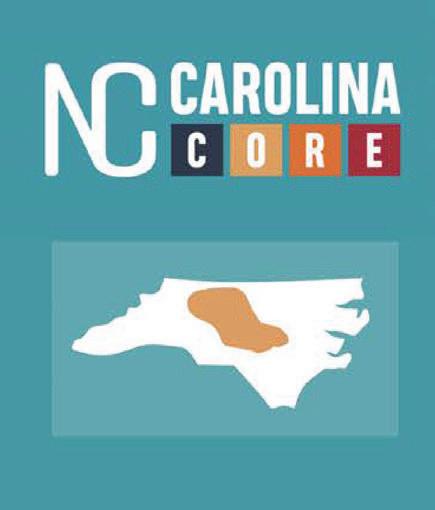
Mark Owens, president and CEO of Greater Winston-Salem, Inc., says economic growth can be found across the Carolina Core, and it’s driving momentum. “Our local community and our entire region are working together to reimagine and embrace our economic future, and you can see by the job creation numbers that the future is bright,” he says. “Our economy may not be based fully on the industries of yesterday, but our legacy companies continue to grow. The biotech and life science sector is our fastest growing sector, and aviation and aerospace continues to be strong across the region.”
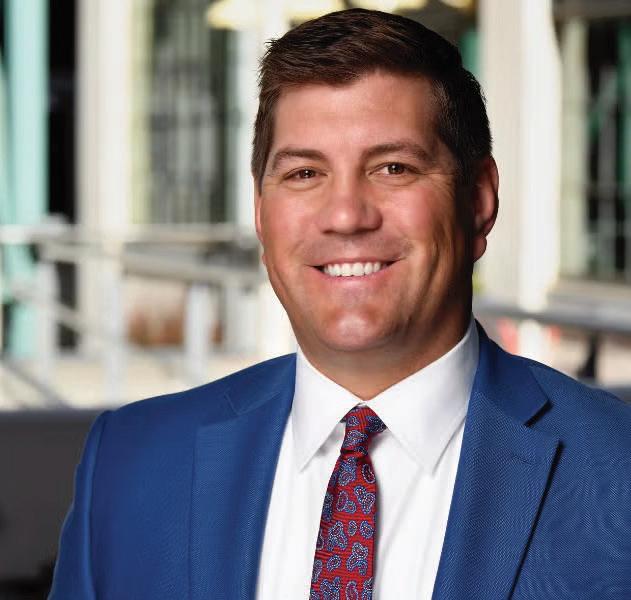
Even with its list of successes, the Carolina Core has room for more. Fox says space is available at megasites and other business parks for companies needing 50 acres to 1,000 acres. “We have places that fit that mold,” he says. “And we have the workforce training. We’re happy to welcome new people and new companies. We’re open for business.”
— Kathy Blake is a writer from eastern North Carolina

